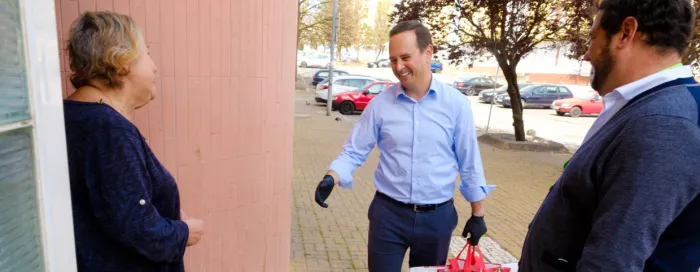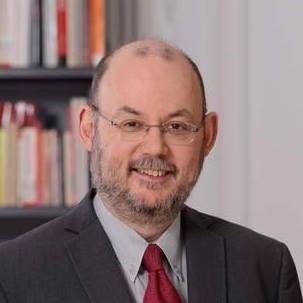We are all in this together. Europe has become the epicentre of the COVID-19 pandemic and we now find ourselves in various kinds of difficult situations that we would not have imagined possible only a few weeks ago. This emergency calls on every individual to do his/her part to help families, friends, colleagues, neighbours, and communities to get through these complicated times.
Local and regional politicians are today on the frontline to fight a virus that knows no borders. It is difficult, dramatic and seems impossible, but our communities are reacting well in a united way so we will be able to win. Some mayors have launched projects of solidarity to help their elderly citizens get their groceries. Others are communicating directly with the population via social media to keep everyone informed and reassured. On the other hand, some are nevertheless struggling to understand what they can do.
So why not help each other by sharing ideas?
The PES Group calls on local or regional politicians to share their experiences, ideas and solidarity projects on how to deal with this pandemic via this link.
Here are the stories of Europe’s progressive local and regional leaders.
Concha Andreu, President of La Rioja, Spain, PES Group member
(contribution published on 26 March 2020)
How are you dealing with the COVID-19 pandemic?
In La Rioja (Spain), companies from several sectors and 3D print creators have come together to create the protection and hygiene material that our health professionals need. Moreover, over 30 companies have donated material they had in stock so that La Rioja's health service (Servicio Riojano de Salud) can use it. In the municipality of Arnedo, over 15 companies of the shoe-making industry have produced over 1,600 reusable waterproof coats and 550 cotton ones – cotton being one of the materials that we most urgently needed this week.
After carrying out tests and reviewing the first deliveries, the production will increase to 5,000 coats per day, which will cover the health service's demand for the next few weeks. The municipality of Ezcaray is also producing 1,600 aprons for health professionals.
On top of the coats, we have created prototypes for hats, shoe covers, boot swabs and caps that will be directly produced in La Rioja to be able to be self-sufficient. Our accredited labs are also testing mask prototypes.
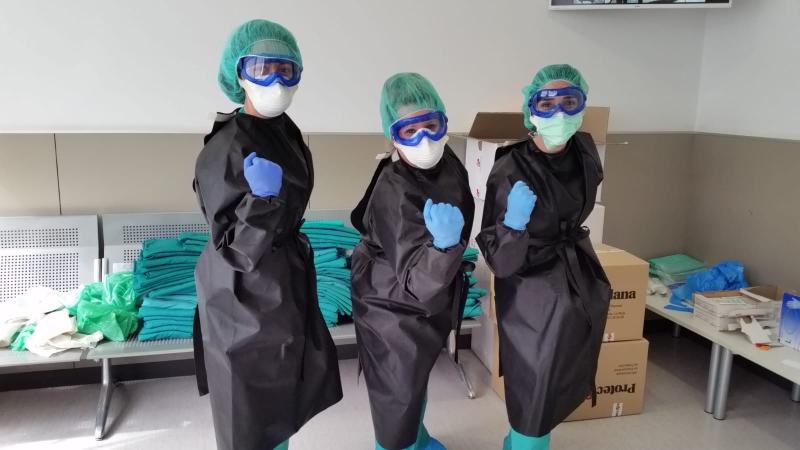
Companies of the chemical sector have also produced over 1,300 litres of alcoholic hydrogel which hospitals and other health centres need. This hydrogel has already been delivered and distributed, and we have the material to produce more, whenever it is needed.
There has also been a citizens’ initiative to design and create individual protection kits for health professionals through 3D printing. So far, they have managed to print over 3,000 visors and protection masks. This group, coordinated by the University of La Rioja, started with 15 people and has now 340 members. 280 of the 300 printers that are presently being used are privately owned, which goes to show the levels of personal involvements in this situation. Businesses and education centres have also joined the initiative. In fact, several companies from La Rioja have donated money or the material that was needed for the printings. Several education centres are also using their 3D printers to produce protection equipment.
The donations of existing material have also been crucial. In the last week, the government of La Rioja has received donations of safety material (masks, gloves, coats, shoe covers, hats, aprons, etc.) from more than 30 regional businesses. All of the donations will be distributed to the hospitals, health centres and elderly homes of the region.
What is your message for the European Union right now?
Follow Concha on Twitter @ConchaAndreu.
*** Photo Credits to Gobierno de La Rioja and PSOE La Rioja.
Taoufik Ben Addi, Municipal Councillor of Schaerbeek, Belgium
(contribution published on 8 June 2020)
How are you dealing with the COVID-19 pandemic?
Following the confinement decision of the Belgian Federal Government, I quickly noticed, as a doctor, that people found themselves facing great poverty. They were no longer able to pay for their medical consultations nor even for their medications. Rapidly, we saw lines stretching outside centres of distribution of food parcels. Many of these people are in an irregular administrative situation and earn their livelihood day-by-day. From the very beginning of the confinement measures, these people saw their income drop to zero.
It is in this context that I took the initiative of this motion.
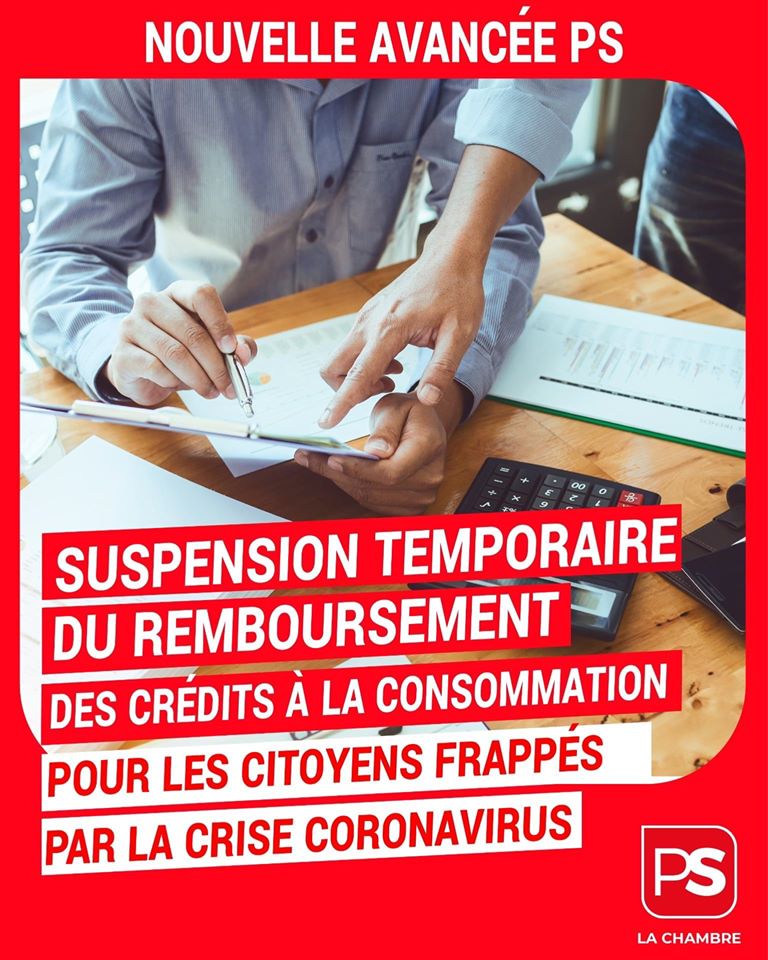
I presented the motion to the Municipal Council of Schaerbeek in April. Some political parties found themselves uncomfortable with it. This is why it was postponed to May, in an attempt to find an agreement between the different parties. We discussed it; there were some amendments, some improvements. We all had to make some compromises so that the motion would not remain at the stage of a majority vote against the opposition. Finally, we were able to get it adopted almost unanimously.
More concretely, the Municipal Council of Schaerbeek (during its session of Wednesday 27 May 2020) made the following requests to the College of Mayors and Aldermen:
- to suspend, during the health crisis, the municipal fee of €70 for any submission of a request for regularisation for exceptional circumstances;
- to pay particular attention to the needs of children of illegal immigrant at the CPAS (the Belgian public centre for social action);
- to reinforce the support to people in an irregular administrative situation for their medical care, their emergency social help and their housing assistance in the same way as for any person in a situation of great vulnerability in the face of the Federal State;
- the temporary regularisation, during the health crisis, of people in an irregular administrative situation on the territory;
- the suspension, during the health crisis, of all removal procedures and orders to leave the territory;
- the suspension of the federal fee of €358 requested for any introduction of a regularisation request;
- at the end of the health crisis, carrying out an in-depth reflection on the general policy of regularisation of people in an irregular administrative situation, based on objective criteria and by involving civil society in this reflection.
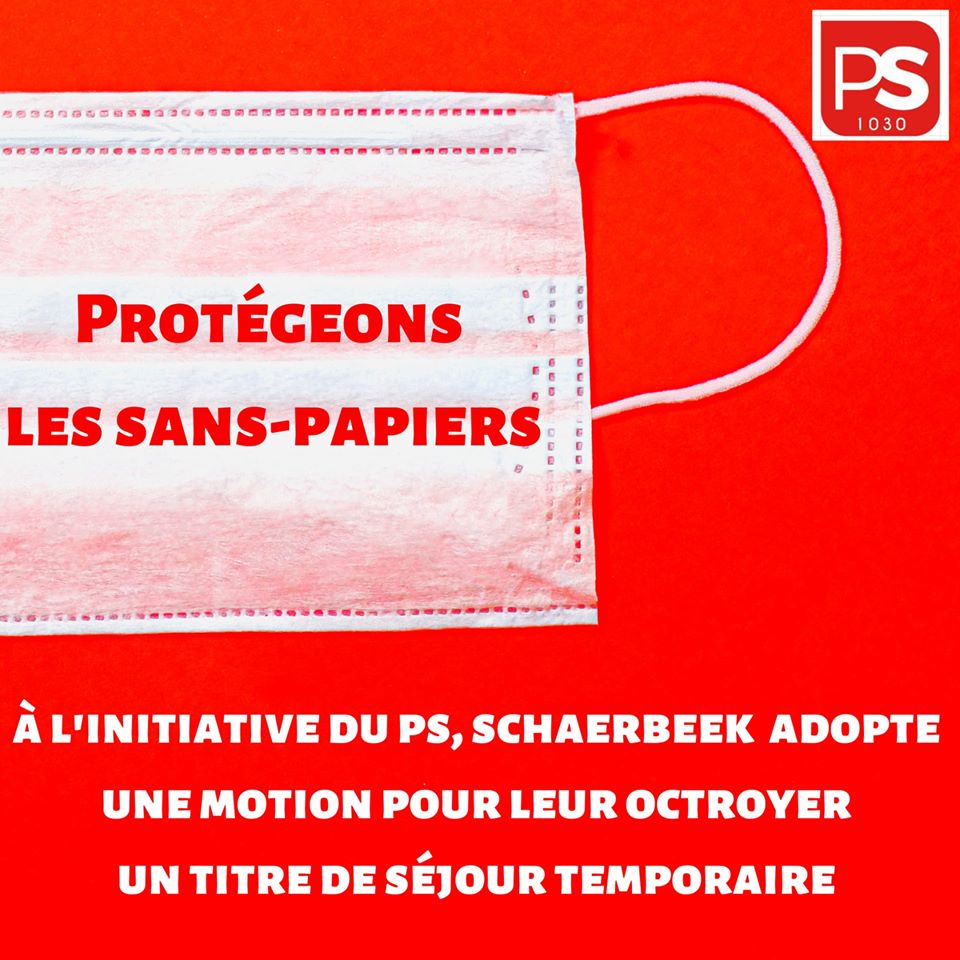

What is your message for the European Union right now?
Follow Toufik on Twitter @BENADDI5.
***
Photo credits: Municipality of Schaerbeek and PS Schaerbeek on Facebook.
Miguel Carneiro, Mayor, Vila Boa do Bispo, Portugal
(contribution published on 20 March 2020)
How are you dealing with the COVID-19 pandemic?
- Free Courier service for elderly, especially the isolated ones without family support.
- Free medical advice for the population via medical volunteers.
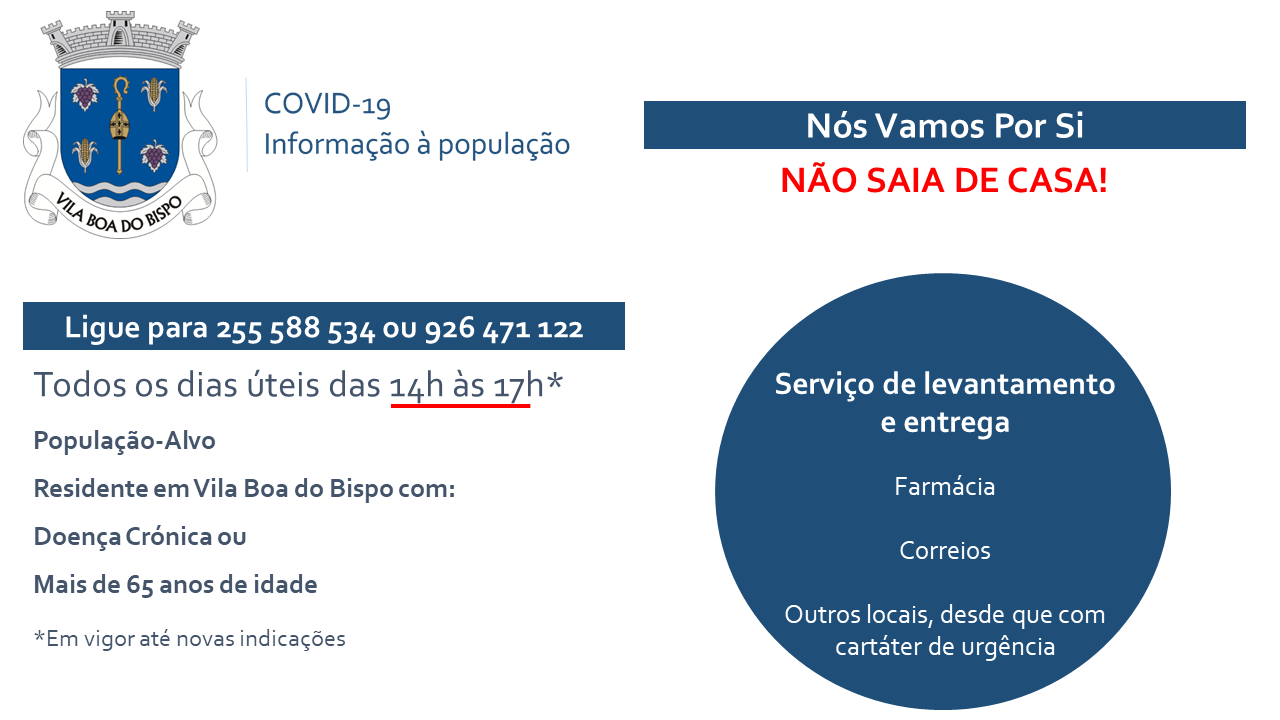
What is your message for the European Union right now?
Follow Miguel on Twitter @migueltcarneiro.
Arianna Censi, Deputy Mayor of Milan Metropolitan City, Italy, and PES Group member
(contribution published on 18 May 2020)
How are you dealing with the COVID-19 pandemic?
The Milan metropolitan area is one of the areas that was the most hit by the coronavirus in the region of Lombardy, alongside the provinces of Bergamo and Brescia. This situation, in addition to the obvious negative repercussions, has however triggered a strong internal and international solidarity, favoured both by the cosmopolitan vocation of Milan and by the great dynamism of the voluntary associations of the territory.
The Metropolitan City therefore operated on two fronts. On the one hand, it continued to ensure essential public services (such as Civil Protection, the supervision and maintenance of school buildings and major roads) to citizens, municipalities and businesses. Simultaneously, together with its 133 municipalities, it has created a sort of control room that has allowed the rapid and widespread distribution of personal safety devices, of food and necessities to fragile people such as the elderly, the unemployed and disabled people who are among the most affected by this emergency.
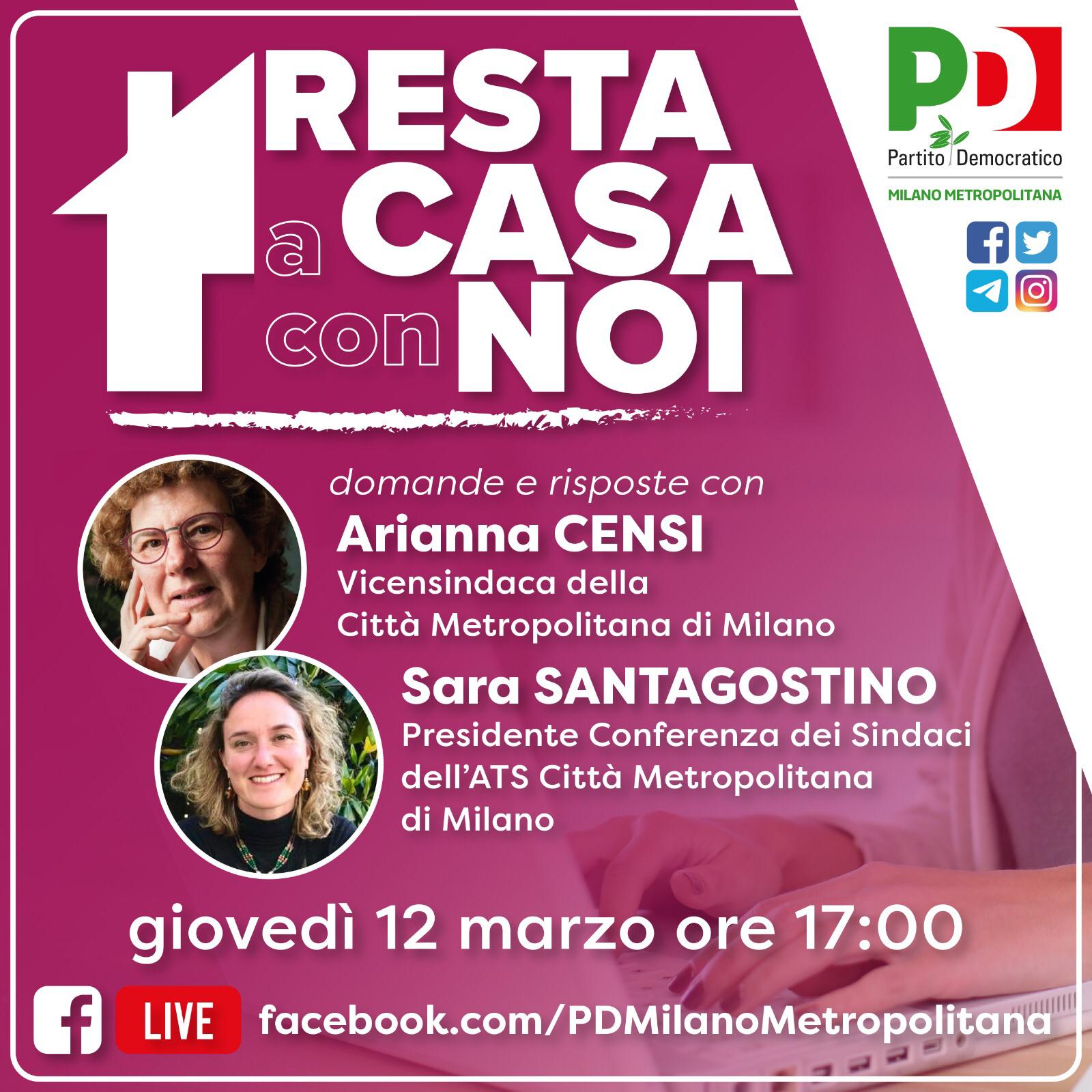
Countless initiatives have been put into place in the recent weeks by the Metropolitan City:
- distributing 10,000 masks to the staff of health homes for the elderly and 3,000 protective suits to municipalities and to the health system;
- having civil protection volunteers distribute food to the elderly, to the unemployed and to those who are not self-sufficient and who have been confined to their homes because of the lockdown measures.
Il distretto di Keqiao ci ha donato 3000 tute protettive. Le daremo a Comuni e sistema sanitario della Città metropolitana. La loro vicinanza in questa comune lotta contro il virus Covid 19 ci infonde fiducia. Non siamo da soli in questi momenti difficili.#COVIDー19 #iorestoacasa pic.twitter.com/z2yydRXcbl
— Arianna Censi (@AriannaCensi) March 24, 2020
At the level of territories, a virtuous action was put into place. An agreement was made between 14 municipalities of the South East Milan area to build an Info point for SMEs, i.e. a portal that aims at giving support in consultation to micro and small businesses in the areas affected by the recent health emergency.
Through FAQ published with constant updates, a form will allow local entrepreneurs to contact the volunteers directly and to be accompanied towards the correct procedures to access the forms of economic and fiscal support.
As always in difficult times the Italian institutions and the population are able to express their best by overcoming limits and stereotypes.
What is your message for the European Union right now?
Follow Arianna on Twitter @AriannaCensi.
Loïg Chesnais-Girard, President of Brittany, France, and PES Group member
(contribution published on 25 March 2020)
How are you dealing with the COVID-19 pandemic?
Our Regional Government approved a series of measures to reduce the impact of the Covid-19 pandemic. The aim is to preserve as much as possible the economic and associative life of the region as well as the vocational training establishments and their beneficiaries. Some of the measures include:
- Support to the associative, cultural, sports and tourims sectors
In order to protect and maintain their activities, the Region has created an exceptional community life fund to support these structures. The Region also offers continued financial support to associations affected financially by the cancellations of events or projects and is extending agreements to finance actions that have been postponed due to the epidemic.
- Support for business activities
The objective is to facilitate the access of companies to credit while preserving their cash flow. The Region supports SMEs, micro-enterprises, artisans and traders through the National Solidarity Fund set up by the government. It has also created a zero-rate ‟rebound loan” for SMEs that exist for over a year and that are facing economic difficulties. It has also mobilised the Regional Guarantee Fund to give a wider access to credit to companies in need of cash. The Region also provides advanced payments of reimbursable advances already agreed to beneficiaries, such as associations of the social and solidarity economy, higher education and research organizations and farmers. Additional support is also foreseen for the fishing sector.
- Professional training
A continued financing of training organizations is planned as well as an uninterrupted financial assistance to trainees to continue their education, a financial coverage of their social security and the payment of the scholarships of the health and social services students.
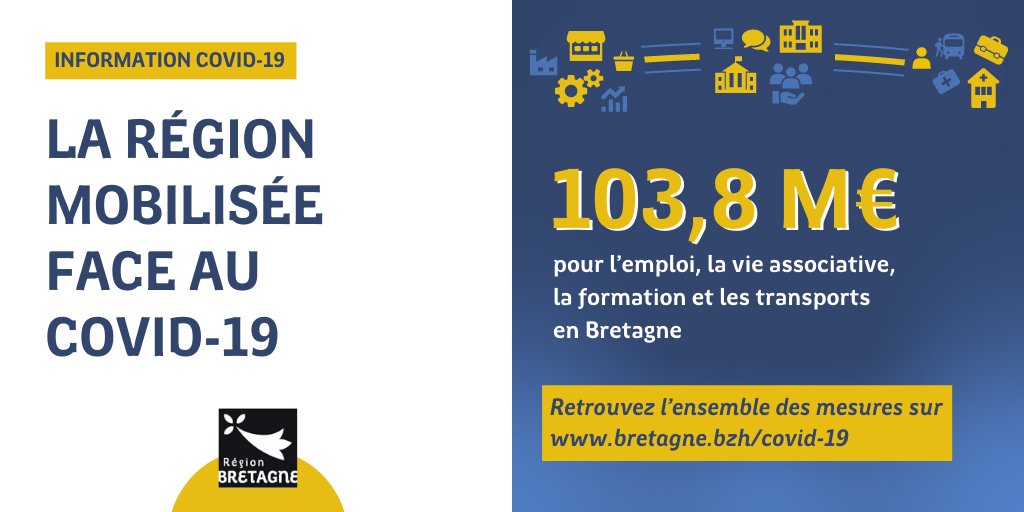
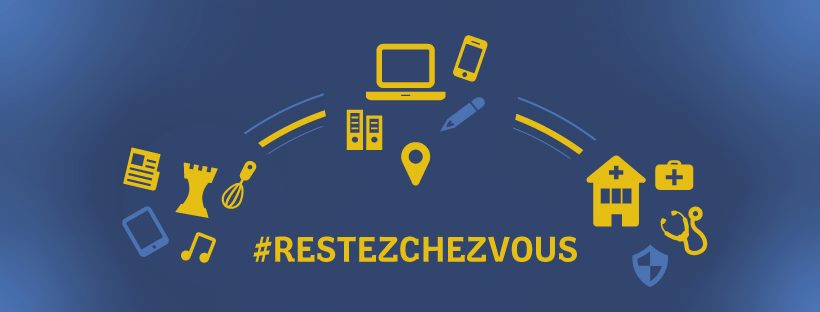
What is your message for the European Union right now?
Follow Loïg on Twitter @LoigCG.
Christophe Clergeau, Member of the Pays-de-la-Loire Regional Council, France, and PES Group member
(contribution published on 27 April 2020)
How are you dealing with the COVID-19 pandemic?
In order to prevent the addition of a humanitarian crisis to the already existing health crisis, the city of Nantes has put into place a set of measures aimed at helping the most fragile and precarious people who are particularly at risk in the context of this pandemic. In collaboration with a series of associations, the Mayor of Nantes, Johanna Rolland, has deployed in her city an exceptional food aid system, coordinated with the City and the Integrated Service for Reception and Orientation (‟Service intégré d’accueil et d’orientation-SIAO” in French).
In addition, given a 90% drop in the use of its public transport system, the Nantes Metropolis has decided not to charge users with the cost of their subscription for the month of April. The service continues to be provided, with reinforced sanitary measures (regular cleaning of vehicles, opening of all doors so that users do not have to touch them, etc. ) and the setting up of specific offers such as a free on-demand transport service for health and socio-medical staff members in hospitals, clinics or nursing homes.
In addition to this, one million euro has been invested respectively by the Nantes Metropolis and by the Loire Atlantique Department in order to help tenants who have difficulties to pay their rent. This rental assistance scheme is aimed at tenants residing in social housing or renting in the private sector but who experience occasional difficulties in paying their rent due to a drop of their income in link with the health crisis (short-time working, drop in activity, cancellations of contract, economic lay-off due to the coronavirus ...).
Follow Christophe on Twitter @clergeau.

Arturo Collins Rivera, Local councillor, Fuensalida, Spain
(contribution published on 21 March 2020)
How are you dealing with the COVID-19 pandemic?
In Fuensalida (my home city located in the northern industrial belt of Toledo in the south of Madrid), we have taken extensive measures to confront the global pandemic that is now affecting a great part of Spain.
- Concerning prevention measures, we are first following the guidelines of the regional health authorities. We have advertised to an extensive extent precaution measures on social media and in local buildings.
- Regarding contention measures, we put in place our Covid19 Protocol on the 12th of March, following an address by our regional president who created several measures to fight the Coronavirus (among which the closure of schools). The main measures were to cancel all activities taking place in municipal buildings, suspend all trips, and close down all sport events. We were also very clear on the importance of verifying information because there was an important surge of fake news going around in relation to the Coronavirus.
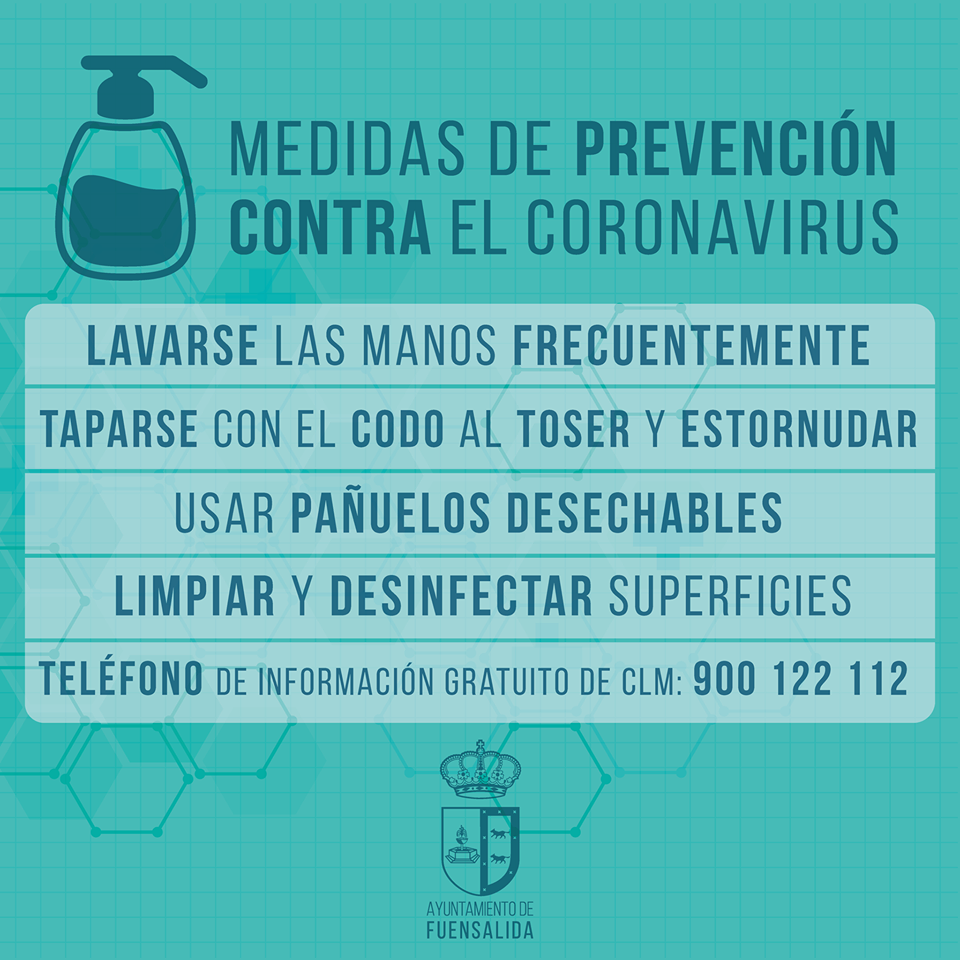
- This was completed on the 13th of March with a communication in which we informed citizens about the public closure of all municipal buildings, street markets and sports facilities. Via our local radio, the mayor also explained the measures and asked that everyone remain calm and cooperate with the authorities. We also did a video explaining the measures in sign language.
- On the same day, we closed down all parks, together with the Police force, to prevent the unnecessary exposure of children.
- On the night of the 14th of March, the Spanish central government declared the state of emergency, ordering the confinement of the population, putting all of the country's resources at the disposition of the Ministry of Health and deploying the Army. The main motto was #QuédateEnCasa (i.e. ‟stay at home”). To strengthen the idea, we took pictures of our deserted city's streets, congratulating citizens for their cooperation.
- On the 16th of March, everything was shut down. We maintained a minimum number of administrative services and enabled teleworking for municipal workers. Since this date, citizens can nevertheless still have daily access to the City Hall via internet, email and telephone. On the communication side, we have been strongly reminding the hotlines habilitated by the authorities to attend to those affected by the Coronavirus.
- That same day, municipal workers started disinfecting the streets with a chlorine solution, a task that will also be dealt with by civil protection volunteers to reinforce the worker's effort.
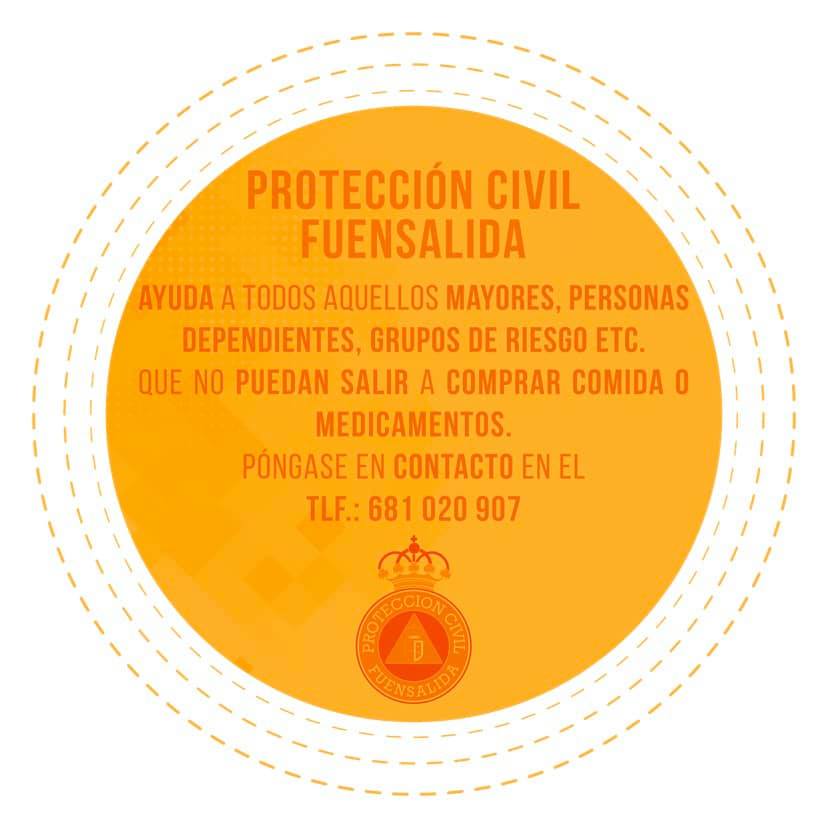
-
Another problem comes from the fact that the deemed "groups at risk" cannot leave home. Therefore, what happens if someone is ill, old and without a family, etc. and cannot go to the supermarket or to the pharmacy? For these matters, we created a system so that these people can call the civil protection to have their shopping done for them and delivered to their home.
-
At the moment, we are maintaining a fluid communication flow with our citizens via social media and the radio, regularly informing them of the number of positive cases and of incidents the security forces are dealing with in relation to the state of emergency. Fighting this virus must be a joint effort, with our public services on the front line.
What is your message for the European Union right now?
Follow Arturo on Twitter @ArturoCollins.
Elio Di Rupo, Minister-President of the Government of Wallonia, Belgium, and PES Group member
(contribution published on 23 March 2020)
How are you dealing with the COVID-19 pandemic?
Here in Wallonia, in Belgium, we have taken a series of solidarity measures for our citizens. Measures for the economy, measures for hospitals, measures for rest homes, for the elderly. We have also made sure to invest in order to relieve as much as possible the victims of the Coronavirus.
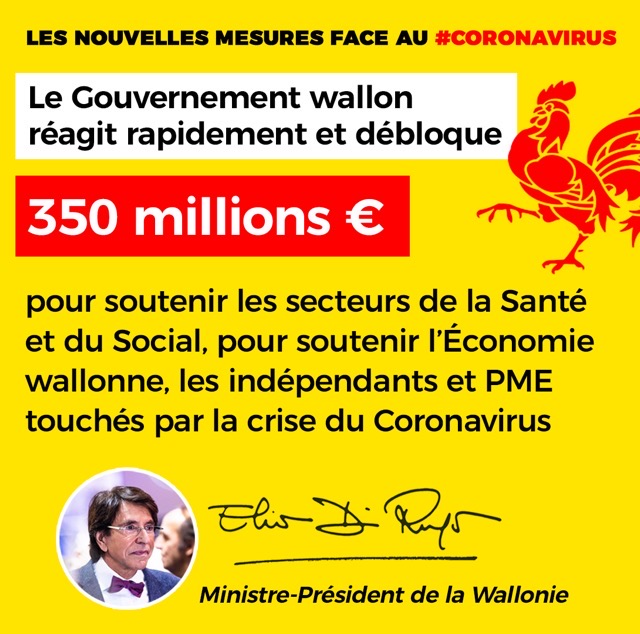
La crise du #Coronavirus touche l’ensemble des citoyens, dont notamment les personnes en situation d’urgence sociale. pic.twitter.com/XYAhmanDcq
— Elio Di Rupo (@eliodirupo) April 1, 2020
What is your message for the European Union right now?
Follow Elio on Twitter @ElioDiRupo.
Andreas Dittmann, Mayor of Zerbst (Germany), and PES Group member
(contribution published on 8 April 2020)
How are you dealing with the COVID-19 pandemic?
Solidarity in Zerbst means first of all solidarity between generations: younger people do the daily shopping for older people or for people who are part of one of the groups at risk.
This year at Easter, all citizens (especially older people) are asked to stay home and to avoid social contacts as much as possible. Nevertheless, many people want to surprise their children, grandchildren, parents or friends with a little present. Not everyone can nor wants to make these purchases online.
As Mayor, I have therefore set up the campaign ‟Giving closeness while maintaining distance” with the purpose to bring local shops and citizens together. Many of our local shops have offered to prepare an Easter present for our citizens' loved ones and package it. My city administration's employees then take care of delivering the presents.
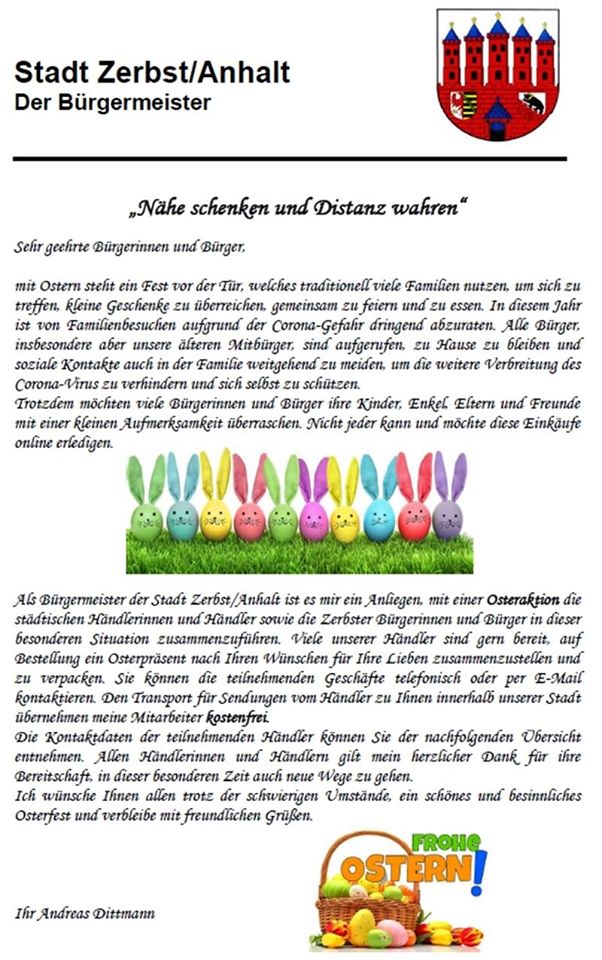
What is your message for the European Union right now?
Follow Andreas on Twitter @AndreasDittmann2.
Peter Florianschütz, Member of Vienna City Council, Austria, and PES Group member
(contribution published on 24 March 2020)
How are you dealing with the COVID-19 pandemic?
Our Mayor Dr. Michael Ludwig and the entire city government offer comprehensive information for all groups of the Viennese population. I am especially proud of the video that the City of Vienna made for children in which it explains the COVID-19 to them.
The SPÖ Town Hall Club made videos in German and in the languages of the biggest minority groups (Turkish, Bosnian/Croatian/Serbian) to explain the exceptional rules put in place for moving around in the city and to give out the most important telephone numbers.
The 24-hour hotline (0140004001) is only intended for high-risk groups. These include older people and persons already suffering from ‟previous” illnesses who need help with their shopping. The City also offers an up-to-date web page about the COVID-19.
We support Vienna's economy and its employees and provide additional hospital infrastructures. The City of Vienna is offering €2 Mio. to small businesses to help them with the transition to working from home. Vienna has set up ‟Messe Wien” in Leopoldstadt, a care facility for people with the Coronavirus. This facility is a ‟just in case facility” for people with mild symptoms who do not have anywhere to go. Also Vienna is offering financial help (€35 Mio.) to businesses and workers.
Many people in Vienna are doing great things. We are proud of them and of being in the most liveable city of the world!
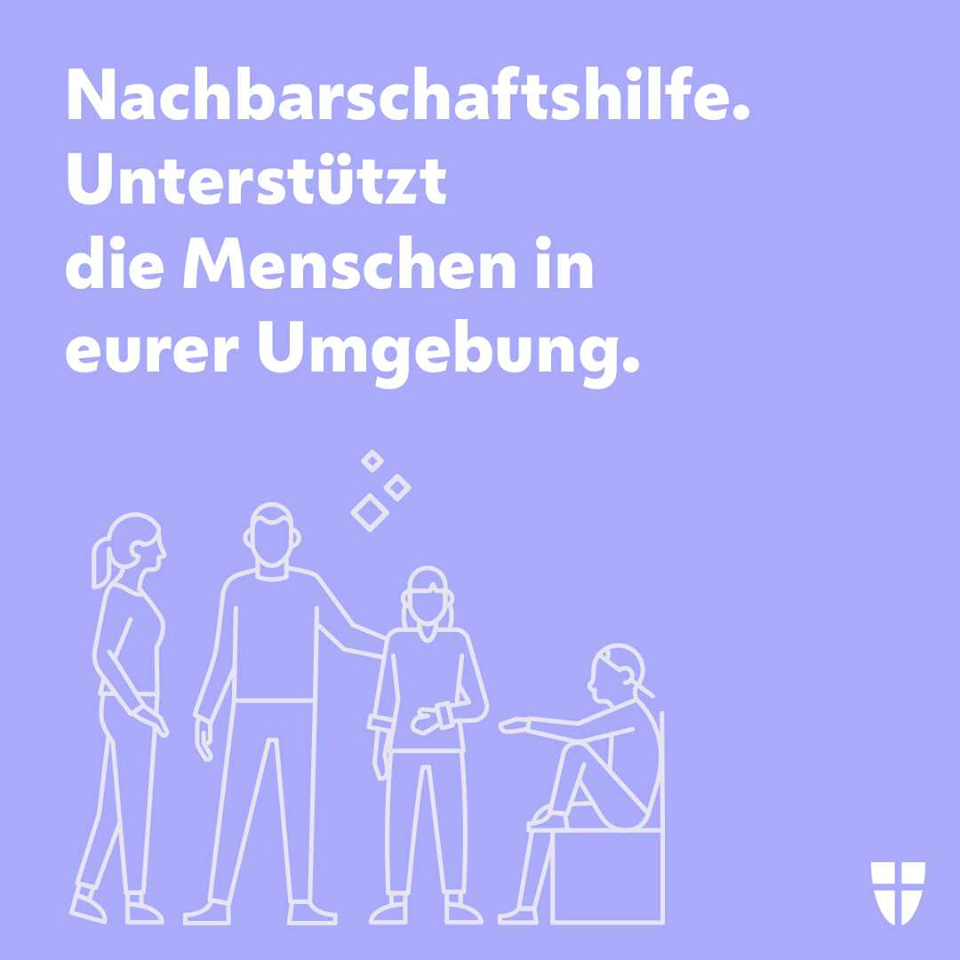
What is your message for the European Union right now?
Follow Peter on Twitter @pflorianschuetz.
Martin Frühwirth, Mayor of Kleinmürbisch, Austria
(contribution published on 6 April 2020)
How are you dealing with the COVID-19 pandemic?
In my district of Güssing (which is in the Burgenland region of Austria), social cohesion is very important and has not been stopped by the coronavirus crisis.
We have a village bus that we usually put at the service of people for mobility purposes in their everyday life. The Village bus Association” includes all the neighbouring municipalities of the Güssing district (i.e. Neustift, Kleinmürbisch, Großmürbisch and Tschanigraben). All together, these communities have around 1,350 inhabitants. The largest one, Neustift, has 480 inhabitants and the smallest one, Tschanigraben, has only 65!
In addition to belonging to one of these communities, individual citizens can also become members of the association. They pay an annual membership fee and are therefore entitled to use the bus service up to three days per week to go shopping, to a doctor's appointments and to an administrative meeting.
The offer is popular with around 100 return trips per week. In times like the one of the coronavirus crisis, the transport operation is stopped. Nevertheless, as mayors, we do not let our citizens down. We take care of doing the shopping and the errands of our village bus' customers, coming from all our communities.
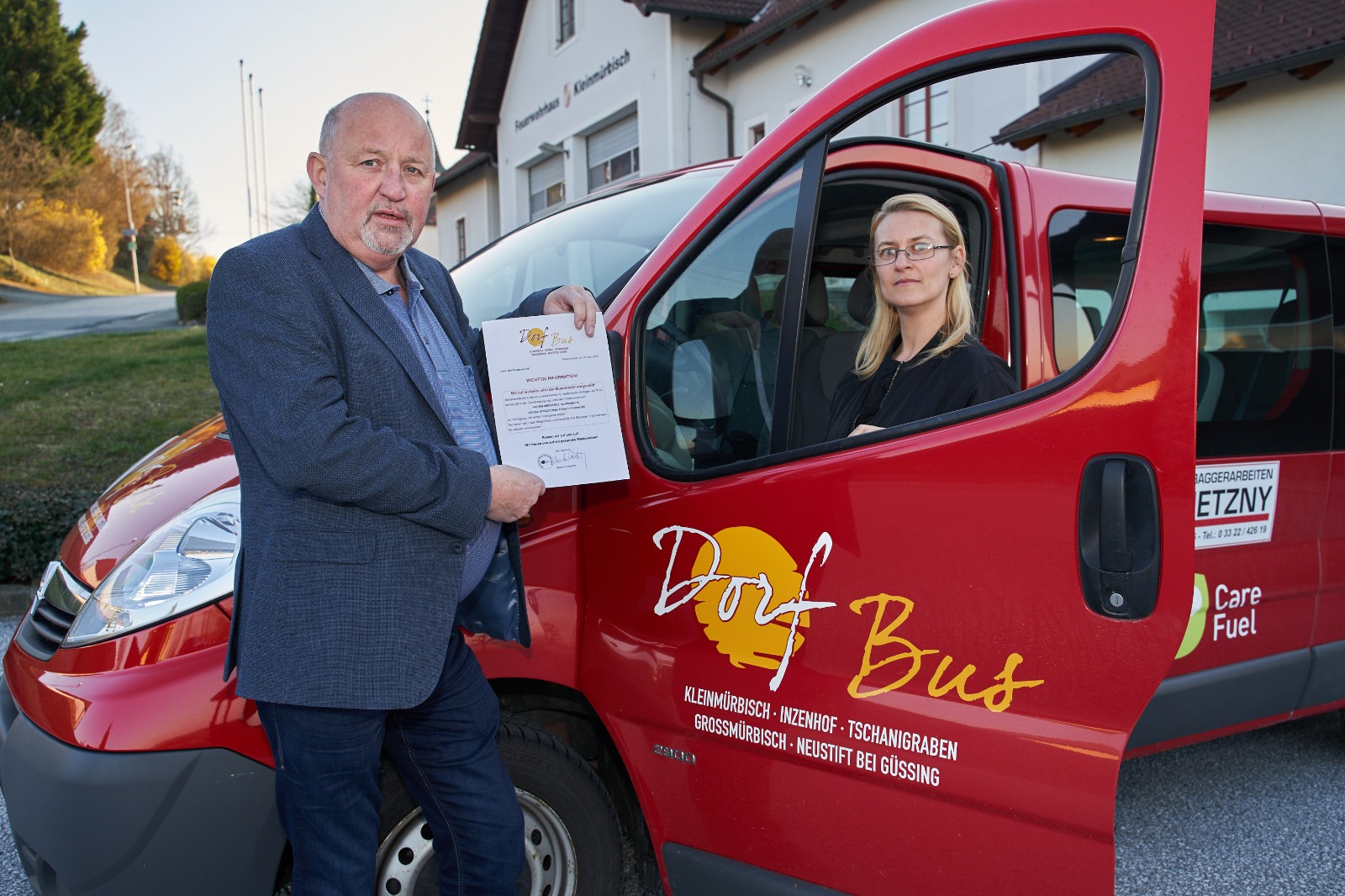
What is your message for the European Union right now?
Emiliano García-Page, President of Castilla-La Mancha region, Spain, and PES Group member
(contribution published on 28 April 2020)
How are you dealing with the COVID-19 pandemic?
Castilla-La Mancha’s efforts have been focused on containing the pandemic. To this end, the Regional Government has designed contingency plans to adapt the hospitals in our region to the increased strain that the pandemic has put on the health system. We have been the Spanish region that has employed the largest number of healthcare workers over the last few weeks: Over 4,200 health professionals.
Accordingly, the Regional Government of Castilla-La Mancha has multiplied the number of ventilators in the public hospital network by four since the beginning of the pandemic and it has established a contingency plan for the care of people affected by the Coronavirus in elderly nursing homes, by which elderly patients are attended personally when they don’t meet the medical criteria for hospital admission.
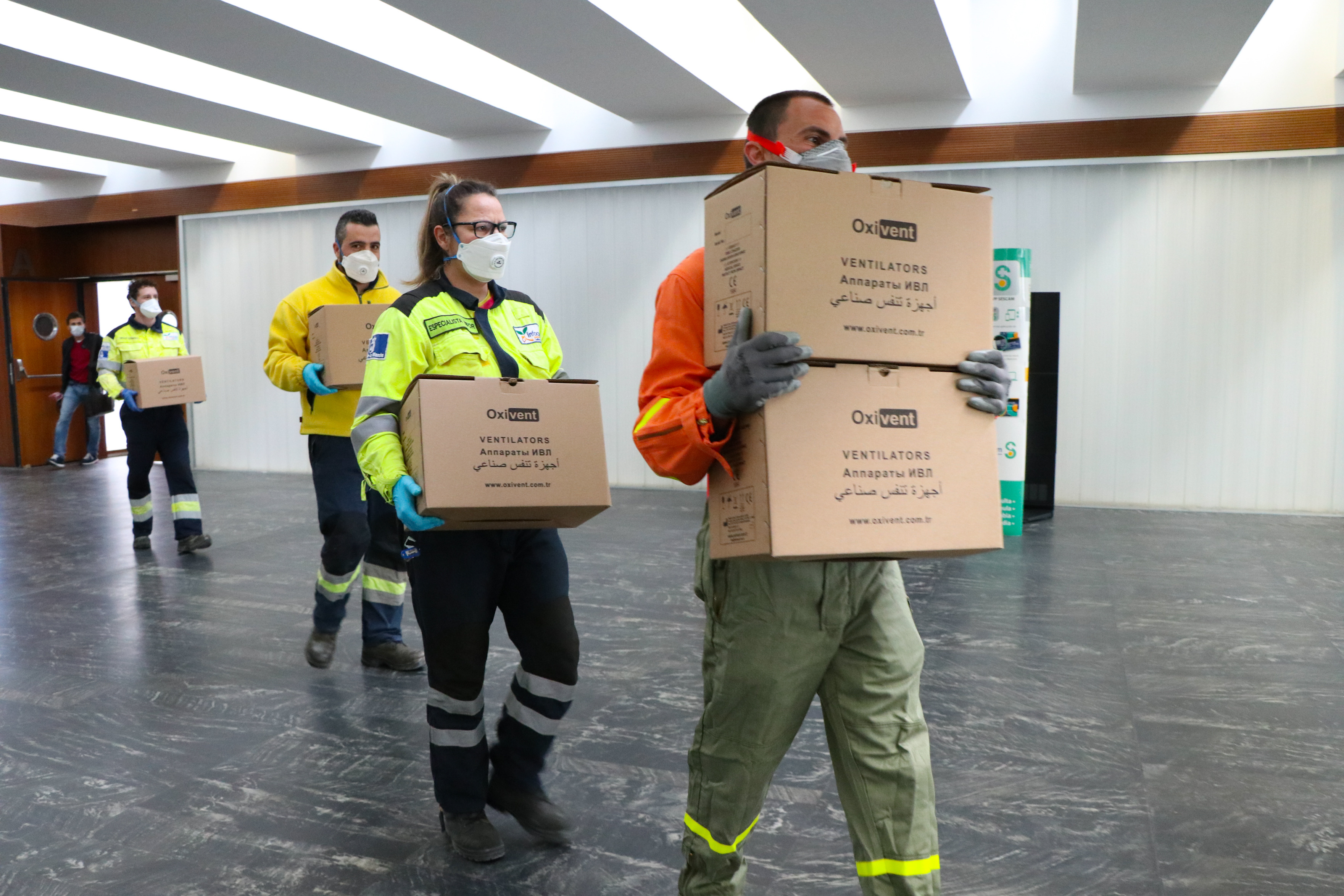
Furthermore, Castilla-La Mancha is the Spanish region that is performing the most rapid tests in proportion to its population. The Spanish Health Ministry published a report showing that our region performs triple the amount of rapid tests than the second Spanish region, with a total of 62 500 tests; this means 31 000 tests are performed for every million inhabitants.
Castilla-La Mancha is made up of 919 municipalities, many of them in a rural environment distinguished by its geographical dispersion. This has been one of the challenges against the spread of COVID-19. Therefore, the government of Castilla-La Mancha has tripled the number of visits to our towns through Special Deployments to mitigate the Coronavirus pandemic, formed by Geacam (Public environmental management company) and the Regional Government’s Body of Environmental Agents. Both of these bodies have offered their services daily in about 200 towns to carry out tasks such as the disinfection of care homes and health centres, handing out of medicines and other essential goods, the transporting of people in rural nuclei or vigilance of natural spaces so that confinement rules are followed.
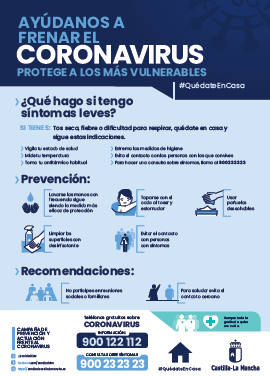
In relation to families at risk of social exclusion and their underage children, the feeding of scholarship students has been guaranteed despite the closing of education centres through a network of food delivery points, in collaboration with town councils. In addition, to guarantee that all students in the region can finish the schoolyear online, the government is lending technological devices to families and connectivity devices to schools that are currently suffering the digital gap.
In the economic field, support to the region’s economy and businesses has been intensified. Since the beginning of April, the Regional Government coordinated a first financial aid mechanism fitted with 15 M. euros, aimed at SMEs and the self-employed of Castile-La Mancha, to back credit operations of up to 300 000 euros.
Furthermore, our Regional Government has designed an Extraordinary Plan for Economic Recovery after the effect of COVID-19 which establishes more than 220 million euros in economic resources. This plan features some implementation measures such as the creation of a 25 M. euro non-refundable financial aid line aimed at micro-SMEs and the self-employed that resume their activity immediately after the State Emergency while maintaining their employees.
Additionally, the Regional Government’s COVID-19 Operation Centre has launched the Covid Market Place, a digital platform that serves as a meeting point between businesses’ demand for personal protective equipment and the qualified product offer available.
Also, in order to promptly acquire rapid detection tests, ventilators and other medical supplies to tackle COVID-19, the Regional Government is coordinating regional business projects for fast manufacturing and purchasing of medical supplies, which highlights swift public-private cooperation, allowing for the manufacturing of 20 000 protective visors for healthcare staff. Moreover, the Clothing Technological Centre and the company “Almacenes Castellanos”, located in the province of Toledo, have collaborated in the manufacturing of one million face masks.
Finally, the Regional Government is ensuring connection between confined citizens and businesses by speeding up the deployment of fibre-optic networks. Complementary to this, network service providers in Castilla-La Mancha have offered devices and connections to hospitals in the region so that patients can communicate with their families.
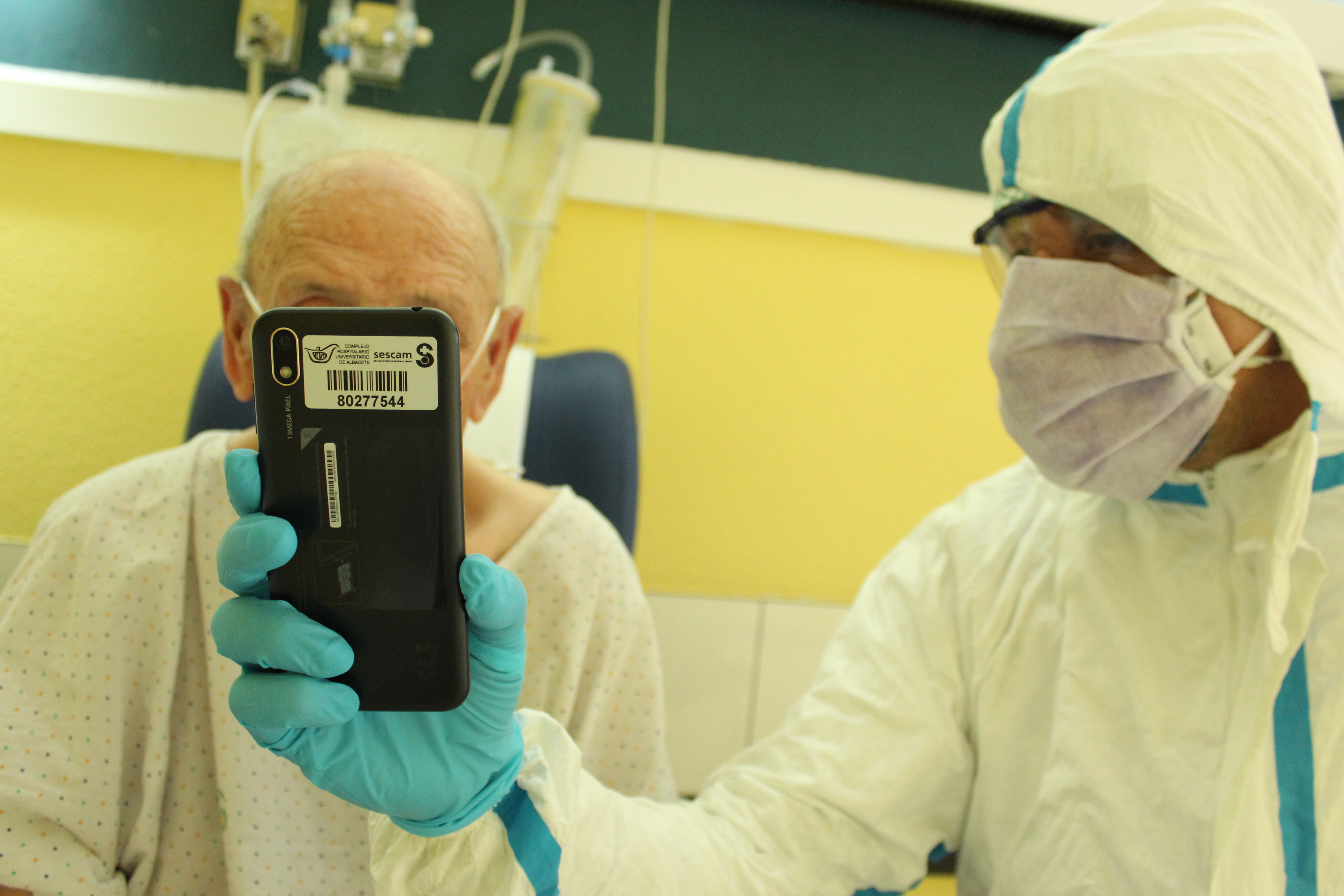
What is your message for the European Union right now?
Follow Emiliano on Twitter @garciapage.
Alison Gilliland, Member of Dublin City Council, Ireland, and PES Group member
(contribution published on 23 March 2020)
How are you dealing with the COVID-19 pandemic?
Like lots of local areas we are dealing with Covid19 on a day to day basis. As prevention and crisis management measures are put in place we try to communicate them using contacts with local community and residents' groups. I use social media a lot - my Councillor FB in particular, to provide a reliable source of information particularly with regard to supports being providing both locally such as a seniors helpline or nationally such as applying online for unemployment support.

I pass on difficulties from local constituents that might be arising with support initiatives being provided. In particular I keep in contact with our Council homeless services, respond to local concerns and try and help with problem solving as issues arise. For example last week I was on radio asking AirB&B owners to contact our local council and work with them to provide tenancies for homeless families and individuals so they could get out of emergency accommodation or over crowded situations and better insulate themselves against the virus. People are afraid and concerned and it's my role to support them as much as I can.
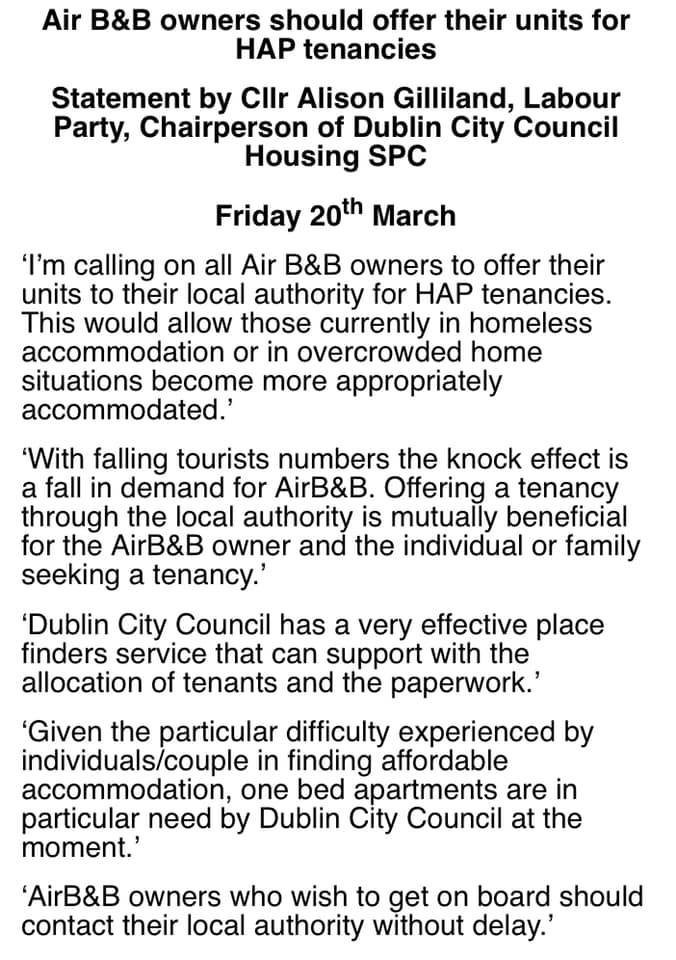
Castilla-La Mancha’s efforts have been focused on containing the pandemic. To this end, the Regional Government has designed contingency plans to adapt the hospitals in our region to the increased strain that the pandemic has put on the health system. We have been the Spanish region that has employed the largest number of healthcare workers over the last few weeks: Over 4,200 health professionals.
Accordingly, the Regional Government of Castilla-La Mancha has multiplied the number of ventilators in the public hospital network by four since the beginning of the pandemic and it has established a contingency plan for the care of people affected by the Coronavirus in elderly nursing homes, by which elderly patients are attended personally when they don’t meet the
medical criteria for hospital admission.
Furthermore, Castilla-La Mancha is the Spanish region that is performing the most rapid tests in proportion to its population. The Spanish Health Ministry published a report showing that our region performs triple the amount of rapid tests than the second Spanish region, with a total of 62 500 tests; this means 31 000 tests are performed for every million inhabitants.
Castilla-La Mancha is made up of 919 municipalities, many of them in a rural environment distinguished by its geographical dispersion. This has been one of the challenges against the spread of COVID-19. Therefore, the government of Castilla-La Mancha has tripled the number of visits to our towns through Special Deployments to mitigate the Coronavirus pandemic, formed by Geacam (Public environmental management company) and the Regional Government’s Body of Environmental Agents. Both of these bodies have offered their services daily in about 200 towns to carry out tasks such as the disinfection of care homes and health centres, handing out of medicines and other essential goods, the transporting of people in rural nuclei or vigilance of natural spaces so that confinement rules are followed.
In relation to families at risk of social exclusion and their underage children, the feeding of scholarship students has been guaranteed despite the closing of education centres through a network of food delivery points, in collaboration with town councils. In addition, to guarantee that all students in the region can finish the schoolyear online, the government is lending technological devices to families and connectivity devices to schools that are currently suffering the digital gap.
In the economic field, support to the region’s economy and businesses has been intensified. Since the beginning of April, the Regional Government coordinated a first financial aid mechanism fitted with 15 M. euros, aimed at SMEs and the self-employed of Castile-La Mancha, to back credit operations of up to 300 000 euros.
Furthermore, our Regional Government has designed an Extraordinary Plan for Economic Recovery after the effect of COVID-19 which establishes more than 220 million euros in economic resources. This plan features some implementation measures such as the creation of a 25 M. euro non-refundable financial aid line aimed at micro-SMEs and the self-employed that resume their activity immediately after the State Emergency while maintaining their employees.
Additionally, the Regional Government’s COVID-19 Operation Centre has launched the Covid Market Place, a digital platform that serves as a meeting point between businesses’ demand for personal protective equipment and the qualified product offer available.
Also, in order to promptly acquire rapid detection tests, ventilators and other medical supplies to tackle COVID-19, the Regional Government is coordinating regional business projects for fast manufacturing and purchasing of medical supplies, which highlights swift public-private cooperation, allowing for the manufacturing of 20 000 protective visors for healthcare staff. Moreover, the Clothing Technological Centre and the company “Almacenes Castellanos”, located in the province of Toledo, have collaborated in the manufacturing of one million face masks.
Finally, the Regional Government is ensuring connection between confined citizens and businesses by speeding up the deployment of fibre-optic networks. Complementary to this, network service providers in Castilla-La Mancha have offered devices and connections to hospitals in the region so that patients can communicate with their families.
What is your message for the European Union right now?
Follow Alison on Twitter @AlisonGilliland.
Yana Giovanis, Local councillor, Zottegem, Belgium
(contribution published on 20 March 2020)
How are you dealing with the COVID-19 pandemic?
I have several examples of initiatives (at a voluntary level).
- I posted on my social media a message for people who can’t go outside (because of their age, an illness, their work, etc.) to call me if they need help for doing their shopping (supermarket, pharmacy), walking their dog, etc.
- I also distributed in my neighbourhood these cards with the same message on it because older people don’t have Facebook (link to the initiative).
- Other people post flyers like this one below in their apartment block. These kinds of flyers exist in several languages (click here to download them). If you need one I can find it for you.
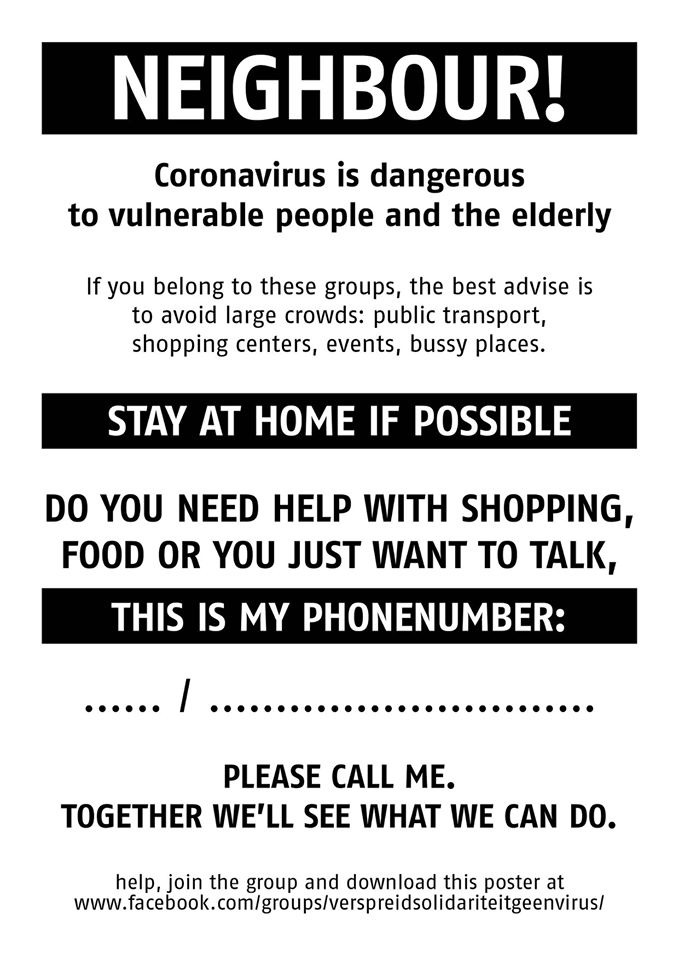
- A lot of people are making their own mouth caps now. You can find a tutorial in French or in Dutch via this link that comes from the Belgian government. Through this link you can find a video on how to make one.
- A lot of people drop off or send drawings, cards and flowers to people in retirement homes and hospitals. Some also make signs for the people inside (see photo below).
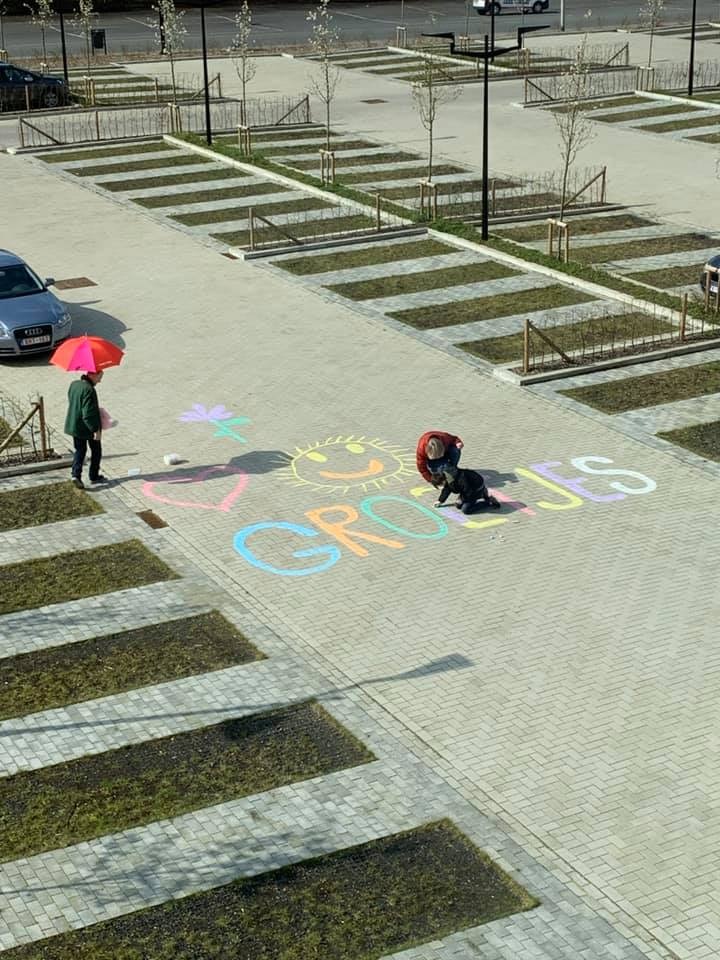
Photo credit: Yana Giovanis
- Impact Days is a free (for now) helping platform for cities and organizations during the corona crisis. It is available in English, Dutch and in French. Via this link you can see an example of the platform used in Leuven: https://www.impactdays.be/leuvenhelpt/. Since today the founder has also received requests from France and New Zealand.
What is your message for the European Union right now?
Follow Yana on Twitter @Yana_Giovanis.
Sandra Gómez López, Deputy Mayor of Valencia, Spain
(contribution published on 7 April 2020)
How are you dealing with the COVID-19 pandemic?
In the city of Valencia we have launched a plan to fight the crisis caused by COVID-19 that focuses on three main aspects.
The first one is guaranteeing essential services and protecting public health. We have put in place the essential public services and we have even strengthened them with the personnel of other domains. Moreover, we have established teleworking for the public servants so that the city administration can still work as efficiently as possible. We are also collaborating with the other administrations to distribute medical equipment and prepare emergency hospitals to avoid the saturation of the existing ones. Finally, we have prepared the nearby hotels to host COVID-19 patients that are asymptomatic or more stable.
Des de l’@AjuntamentVLC volem transmetre l’absoluta coordinació amb la resta d’administracions valencianes i per això totes les mesures que aplicarem davant la situació provocada pel #COVID19 en #València estaran en simbiosi amb totes elles. pic.twitter.com/uYLXasyjoz
— Sandra Gómez/ (@SanGomezLopez) March 13, 2020
L’hospital de campanya que la @generalitat està construint al costat de l’@HospitalLaFe en #València ja té subministrament d’aigua potable. Finalitzem, a través d’Emivasa, la instal·lació amb una capacitat de 70 litres per segon. #EsteVirusElParemUnits https://t.co/Np32sJSDoZ
— Sandra Gómez/ (@SanGomezLopez) March 28, 2020
The second one has been creating a social shield against the crisis.
- We have seen an increase in the budget for social aid and we have also put in place an emergency budget.
- We have launched a phone and home assistance programme for the elderly in order to avoid loneliness.
- Another measure has been to stop charging rent to those affected by the pandemic and we have habilitated a series of buildings to host homeless people.
- We have given over 1000 4G tablets to families in need so that the children could continue their education.
- In terms of mobility measures, we have given free transport passes to all of the health professionals of the city.
- Finally, we have joined the existing Mascarilla-19 campaign to protect survivors of domestic violence and we have teamed up with the police force to help them.
The third aspect is the local economic stimulus plan. We have implemented ‘Re Activa València’, a series of liquidity measures that are destined mainly to SMEs and those who are self-employed. The aim of this measures is to compensate their closure or losses and are targeted towards maintaining employment. We have also postponed the payments of municipal taxes and launched an assistance and coordination service to ease the access to our administration’s benefits, as well as a financial control system about the effects of the crisis. Finally, we have launched specific measures for the tourism sector both for the current and future situations.
Tras la reunion con los agentes económicos de #València, hemos anunciado que pondremos en marcha el Plan #ReActivaVLC para ayudar a los sectores afectados por la situación del #COVID19, reactivarlos y poder ayudar a las empresas a través de la Oficina #ReActivaVLC. @pilarbernabe pic.twitter.com/wObc7Mvk0F
— Sandra Gómez/ (@SanGomezLopez) March 13, 2020
Anunciamos el aplazamiento de pagos de tributos municipales y la suspensión del cobro de tasa de mesas y sillas en vía pública.
— Sandra Gómez/ (@SanGomezLopez) March 16, 2020
Queremos ayudar a los valencianos y valencianas a superar las consecuencias de esta situación extraordinaria por el #COVID19.
No cobraremos el alquiler de viviendas públicas de AUMSA a las personas despedidas o afectadas por un ERTE, ni tampoco a los comercios y restaurantes que han tenido que bajar la persiana. En València no vamos a dejar atrás a las personas afectadas #COVID19 https://t.co/WbejiS8xIu
— Sandra Gómez/ (@SanGomezLopez) March 25, 2020
En #València somos conscientes de que el sector turístico es uno de los que más afectados por la crisis del #COVID19.
— Sandra Gómez/ (@SanGomezLopez) April 2, 2020
@Valenciaturismo exonera a las empresas turísticas asociadas a Visit València del pago de la cuota referente al primer semestre de año.https://t.co/LldTWQcPES
We have published all of the measures and initiatives that our administration has launched during the COVID-19 crisis through our social media channels. On top of the official channels, I have used mine to be a daily source of information and updates, as well as a platform to answer our citizens’ questions during this difficult time.
Atención
— Sandra Gómez/ (@SanGomezLopez) March 27, 2020
Hoy hemos aprobado en el Ayuntamiento de #València la orden de subvención para autónomos y pymes. Desde los 2.000€ a los 6.000€.
Pero, importante, no se pueden solicitar hasta el día siguiente a la publicación en el BOP (la semana que viene). Os cuento más aquí pic.twitter.com/wTPCc24xN2
What is your message for the European Union right now?
Follow Sandra on Twitter @SanGomezLopez.
Birgit Honé, Minister for Federal and European Affairs and Regional Development of Lower Saxony, Germany, and PES Group member
(contribution published on 29 May 2020 )
How are you dealing with the COVID-19 pandemic?
Solidarity and cohesion can be experienced every day in Lower Saxony. This is how neighbours help each other with shopping and support families and older people who are heavily affected by the corona restrictions.
For people who suffer particularly from isolation or who have lost the structure of their daily life, various clinics from southern Lower Saxony offer a global crisis hotline.
For non-German speakers, a hotline also exists in various foreign languages.
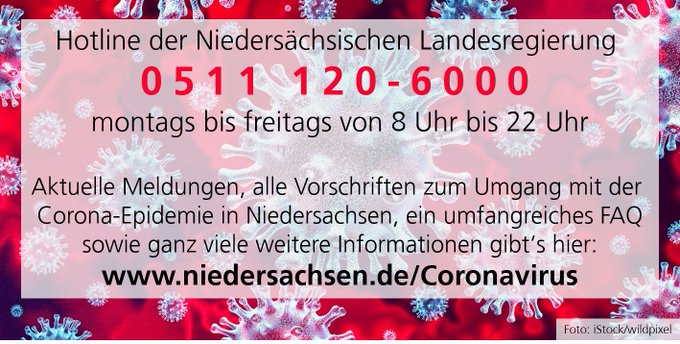
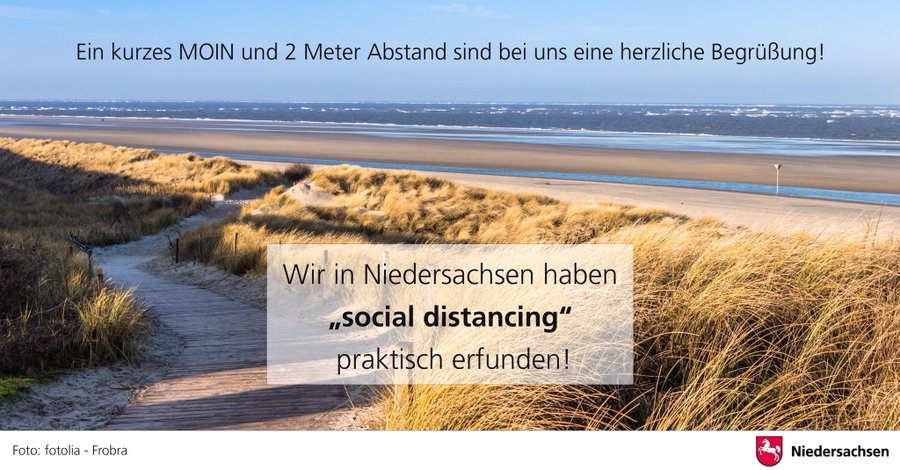
In addition, the Dictum translation app was made possible via our Lower Saxony social innovation-funding program. It was broadened to include a corona query, which enables the anamnesis of non-German-speaking patients in different languages - and thus protects emergency medical staff and other medical personnel.

Wir nehmen es ernst - Sie bitte auch - #Niedersachsenbleibtzuhause.
— Niedersächsische Landesregierung (@NdsLandesReg) April 11, 2020
_#coronavirus #coronavirusnds #covid19 #solidarität #zusammenhalt #niedersachsen #stayathome #stayhome #FlattenTheCurve #socialdistancing #Kabinett #Landesregierung pic.twitter.com/XD2SGg7Zll
What is your message for the European Union right now?
Follow Birgit on Twitter @MBNiedersachsen.
Basílio Horta, Mayor of Sintra, Portugal, and PES Group member
(contribution updated on 23 June 2020)
How are you dealing with the COVID-19 pandemic?
The municipality of Sintra has been adopting several measures to tackle the Covid-19 pandemic since its early beginning. On February, it created an interdisciplinary working group aiming at closely monitor the first infections and, in order to define the best strategy and to effectively protect the population, it created the Municipal Emergency Council.
Then, in early March, all initiatives of the municipality as well as those in which it would participate, were suspended. In the second week of March, knowing that it was necessary to keep people away from places of greater affluence, the municipality decided to close all municipal buildings for culture, sport and leisure, such as the cultural centre, swimming pools, museums, studios, gyms, among others. A strong conditioning in public attendance was also decided
Moreover, regarding the workers of the municipality, the vast majority are teleworking, with only a small group considered indispensable, which includes the offices of the President and Councillors, as well as all those who have responsibilities in health, hygiene and civil protection, remain physically in the respective services.
In addition to this introductory note, the measures adopted by the municipality of Sintra are listed below:
EDUCATION
- On the return to schools, around 5,000 protection kits were distributed to 11th and 12th grade students, teachers and non-teaching staff. These kits include: visor, masks, disinfectant gel and gloves;
- The municipality has guaranteed more than 150,000 meals to children and their families. Since the closure of the school establishments was decreed, the municipality has taken over the continuity of the weekly school meals for 1st cycle students and also a 2nd meal kit for a companion;
- The campaign to collect computer equipment - "From My Home to Yours" - was put into action.
SOLIDARITY
- The municipality decided to increase the Social Emergency Fund by one million euros, for the payment of rents, medicines and health equipment. In addition, financial support of 1 million euros was approved for the Council's Private Social Solidarity Institutions (IPSS);
- The municipality continues to support the Council's IPSS with the distribution of personal protective equipment. The delivery of the material is intended to help institutions - important partners in social support for families and groups at risk - and to provide their professionals with the most appropriate level of protection possible;
- Sintra also has made available 208 beds in reception centres for homeless people, people infected with Covid-19, the elderly and people with disabilities, to cope with the emergency scenario arising from the Covid-19 outbreak;
- The municipality has allocated 1 million masks to be distributed free of charge to residents;
- A free phone line is available to support the elderly residents of the municipality;
- COVID-19 tests have been carried out in homes, kindergartens and home support services of the municipality of Sintra;
- The municipality guaranteed the supply of around 20.000 meals to families;
- In addition to the daily support, during this period, around 175.000 meals were provided to 2.500 families through the European Food Programme and the Municipal Food Center - a support that was aimed at the elderly or isolated people and, or, in confinement.
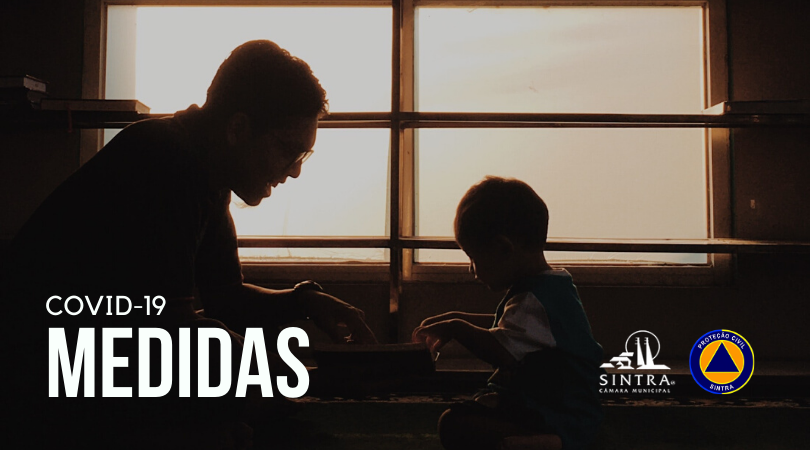
SECURITY FORCES AND FIRE DEPARTMENT (FIREFIGHTERS)
- Sintra has so far made available to security forces and firefighters: about 2,000 "suit" protection kits (includes foot cover, FFp2 mask, goggles, cap, gloves and suit); more than 2,500 "gown" kits (includes foot cover, surgical mask, gloves and gown) and more than 30,000 masks. These entities can also benefit from the vehicle disinfection services, carried out by the technicians of the municipality;
- An extraordinary support of 225,000 euros was also given to the municipality's Voluntary Fire Brigade Humanitarian Associations, in order to guarantee their full operation, not only for public health emergencies that may occur but also for the prevention and fight against forest fires. Already at the beginning of this year the municipality had made available funds of about 2 million euros for the 9 fire brigades of the municipality.
HEALTH CARE EQUIPMENT
- Sintra approved the purchase of health equipment - to the value of 1.5 million euros - for the Amadora/Sintra Hospital in order to increase its response capacity in the fight against the pandemic. Among the purchased material are personal protection equipment, reagents for Covid-19 testing, intensive care ventilators, portable X-ray, defibrillators and portable ventilators;
- As for the analysis and treatment units of COVID-19, the municipality together with ACES of Sintra opened the first Unit at the Agualva Health Center, capable of screening all the population using it (without the need for any prescription) as well as doing a first assessment of the health status of users. An identical center was also opened in Algueirão Mem Martins, serving a population of over 60,000 people. Subsequently, the number of screening laboratories of COVID-19 increased to 3;
- The Municipality has been providing accommodation for health professionals or other professionals (firefighters and security forces, for example) who are on the front line in the fight against COVID-19 and who, for this reason, intend or need to stay isolated from their homes.
COMPANIES AND LOCAL COMMERCE
- The municipality of Sintra did not suspend any of the ongoing investments and continues to comply with all the contracts it signed even in situations where the contractors suspended their activities (eg nurseries, theaters, orchestras, bands, ranches, etc)
- A Municipal Business Emergency Fund, with an initial allocation of 3 million euros, has been created for the maintenance of jobs, in the catering and similar sectors, retail trade and the provision of services, which has already provided support of 1500 euros to 800 entrepreneurs. The measure covers entrepreneurs who carry out their activity on an individual basis or as managing partners of commercial companies. This support has a dual nature: 1. Social, since it is intended to target citizens in a situation of particular vulnerability; 2. Economic, since it contemplates the commitment to maintain the establishments open and to avoid unemployment until 31 December 2020;
- The municipality has authorised the extension of the payment period for public space and advertising licenses from March 31st to September 30th, 2020.
- A website dedicated to municipal markets has been created to promote local commerce and producers.

HOUSING
- The reduction of 35% in the water bill for domestic use, 20% for companies and exemption for customers with social tariffs was one of the first measures implemented;
- Sintra suspended the payment of all rents for social housing and the youth rental program until June 30, a measure that covers 1,630 families. This measure implies a pardon, not a postponement of payment, of about half a million euros. The exemption of this payment, for 3 months, also includes the rents of about 70 entities (of associative or equivalent nature).
SANITIZATION OF PUBLIC SPACE, IPSS BUILDINGS AND VEHICLES, SECURITY AND HEALTH FORCES
- the Municipality of Sintra intensified the work of waste collection and urban hygiene, namely by strengthening and reinforcing the disinfestation and cleaning teams;
- The services of the municipality are, since March, carrying out the disinfection and washing of public spaces throughout the municipality. These interventions will be maintained throughout the territory, giving priority to areas of greater concentration of people. The disinfections include: public spaces, buildings and vehicles;
- An exclusive disinfection center for emergency personnel and vehicles has been created
PARISH COUNCILS
- The increase of social emergencies has forced parishes to broaden their social responses, especially with regard to food plans, delivery of goods and medicines, and also psychosocial support for the population. The parish councils of Sintra will receive financial support worth 275.000 euros.
CULTURE
- Sintra created the Municipal Fund for Cultural Emergency, aimed at supporting the municipality's cultural associations, to the value of 250.000 euros. Non-profit cultural associations that develop their activity in the areas of dance, music or theatre may apply for this fund;
- In order to continue promoting culture and leisure activities, an online platform has been created with various initiatives and activities available. The municipality created a website in order to celebrate the 25th of April (Freedom Day).
SPORTS
- The emergency Sports fund was created with an allocation of 233,000 euros. This fund is intended to address the immediate cash flow difficulties of clubs and associations so as to ensure the continuity of their activities and their safe reopening
TAXIS
- In order to minimize the impact of the current economic difficulties and to ensure that this service can continue in the future, the Cooperativa de Táxis Linha de Sintra has been allocated financial support of 105,000 euros and each taxi driver will receive a support of more than 850 euros.
YOUTH
- With the suspension of the activity of the municipality's youth associations, the municipality has created an emergency fund to support youth associations to the value of 32.000 euros. This fund aims to ensure the continuity of the activities of these associations and to ensure that the resumption of activities is done safely;
- The Sintra Jovem Voluntariado Programme will take place in a different format from previous years, due to the state of calamity decreed by the Government and the restrictions and guidelines of the Directorate General of Health.
BEACHES
- The municipality will provide a special support for beach concessionaires. Therefore, it approved a financial support of 70.000 euros to the Beach Association of Sintra.
ANIMAL PROTECTION
- The municipality approved a contribution of 38,450 euros to 9 animal support and protection associations.
OTHER CITIZEN SUPPORT
- A Citizen's office was opened in Sintra, for services related to the Citizen's Card;
- Since March, the local authority has made available the information regarding the implemented measures in Portuguese sign sanguage
What is your message for the European Union right now?
Nadia Huberson, Member of the City Parliament of Zurich, Switzerland
(contribution published on 8 May 2020 from a non EU-country)
How are you dealing with the COVID-19 pandemic?
One initiative I would like to share, was launched at the end of March by citizens from the bigger cities in Switzerland. Here is the exemple from Zurich, it called "gern gscheh" (Swiss german for "you're welcome" / "gern geschehen" in German). It's a Facebook group, where people can suggest ways to help their neighbours or ooher ones in need (by buying their groceries, going to the pharmacy, the post office, etc.). There has also been a national initiative that follows the same principle called "hilf jetzt" ("help now" in German). It has become very successful in recent weeks.
The local parliament of Zurich is also coming up with solutions and propositions to help our citizens and the economy during this crisis.
What is your message for the European Union right now?
Follow Nadia on Twitter @nadhuberson.
Christine Jung, City Councillor of Saarbrücken, Germany
(contribution published on 26 March 2020)
How are you dealing with the COVID-19 pandemic?
My German region Saarland is situated at the border with the French Grand Est region, which is one of the most affected region by the COVID 19 in Europe. The cross-border region between Germany, France, Luxemburg and Belgium has the highest number of commuters in Europe and people are used to cross the borders every day for shopping, sports and culture. This is one of the reasons why these borders have been closed, to prevent the virus from spreading. Nevertheless, I find this decision (taken 25 years after the opening of European borders thanks to the Schengen Agreement) very hard to accept.
I was relieved to hear that my region, together with the other German regions bordering France, proposed to support hospitals in our neighbouring region. These hospitals are under a great amount of pressure due to their high number of intensive care patients and we proposed to transfer some of them to our hospitals. I believe this is a very strong sign of European solidarity. The virus does not care about borders; we must thus focus on European solidarity rather than on our national situation. Borders must not remain closed longer than necessary.
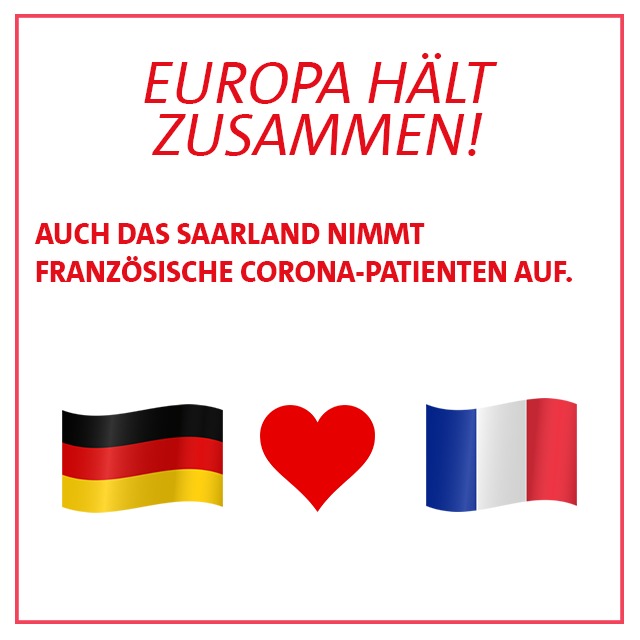
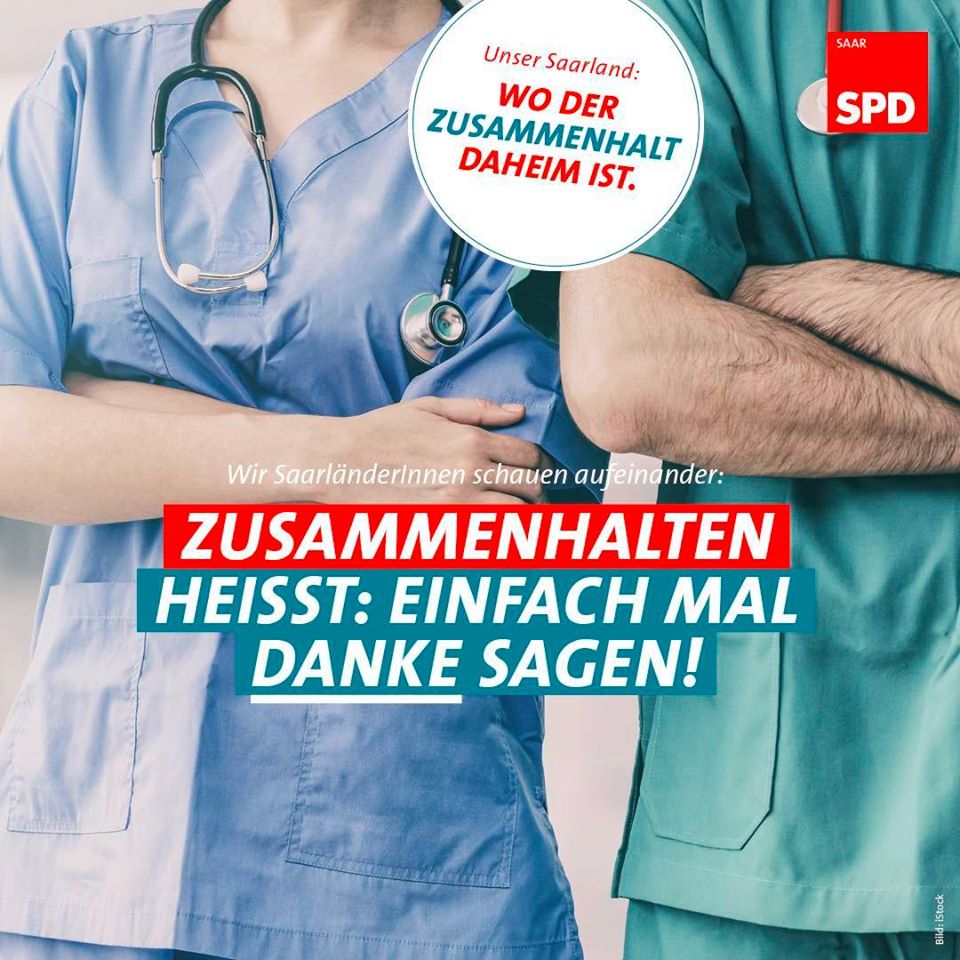
What is your message for the European Union right now?
Tom Jungen, Mayor of the Municipality of Roeser, Luxembourg, and PES Group member
(contribution published on 10 May 2020)
How are you dealing with the COVID-19 pandemic?
Even if we are - with some 6,600 inhabitants - a very small community at EU level, we had to adapt quickly to the circumstances of the pandemic.
Initially, it was a challenge to reorganise all departments of the local administration in order to guarantee on the one hand, the health of all employees and on the other, the continuation of at least the most important services for citizens. In times of crisis, strong public services and well-working services of general interest are of particular importance. In addition, new services were also created in Roeser, such as doing the shopping for elder and vulnerable people, which we organised as a community together with volunteers, such as the scouts. Another service offered is paying the bills in advance in the supermarket or in another shop, e.g. the baker's shop or the pharmacy and then delivering the goods to the citizens concerned. The delivered goods or medicines will be invoiced to those citizens only at a later stage. In addition, the offer of “Meals on Wheels”, a programme that delivers meals at home for individuals who are unable to purchase or prepare their own meals, has been extended. Activities for children are now offered on social media. The powers of the arbitration board, which normally only mediates in neighbourhood disputes, wave also been extended to include family disputes.
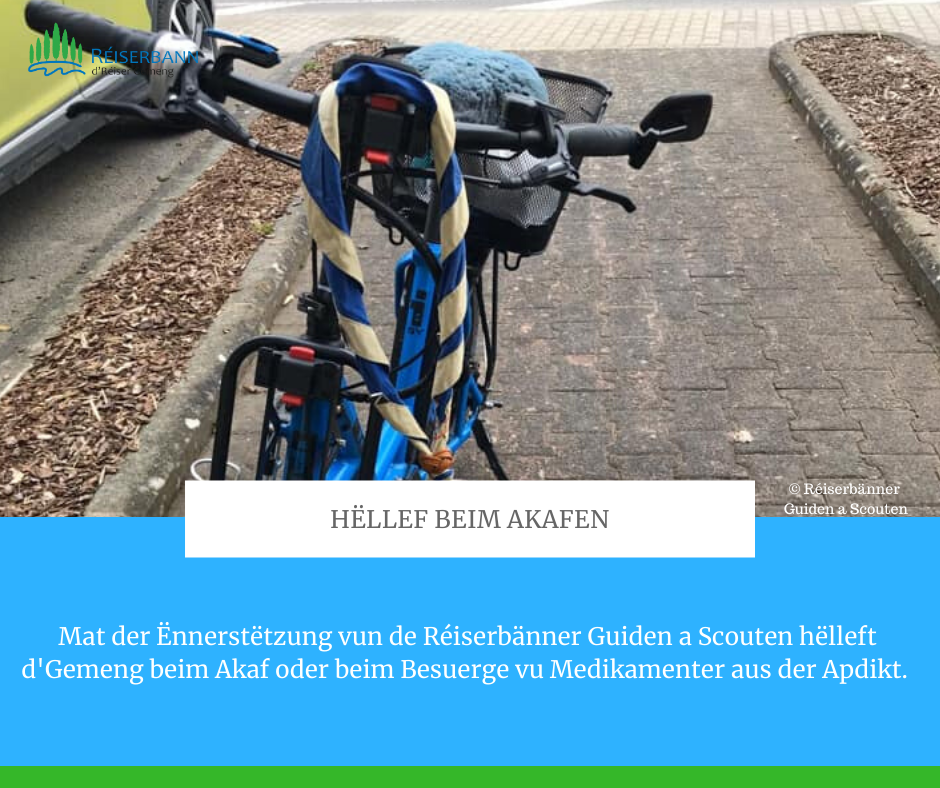
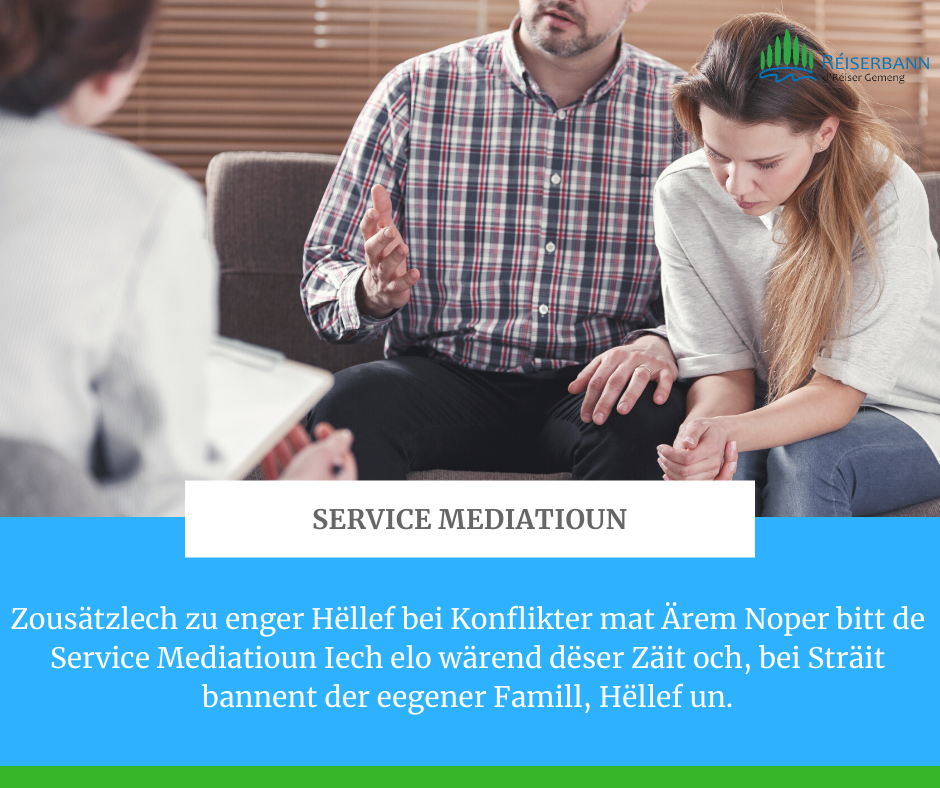
In addition, as a community, we had to make sure that every citizen aged 16 and over received one of the masks provided by the government.
However, the biggest challenge for my community is to prepare under the best possible conditions the return to school, which will resume as of May 25. The National Ministry of Education defined the framework conditions that must be met by the 102 Luxembourg municipalities. Even though we are greatly supported by the government, it is up to us municipalities to find sufficient space to be able to divide the entire school population into two groups. The first group, the so-called "school group", consists of classes with a maximum of 10 children, and goes to school on a weekly basis from Monday to Friday from 8 a.m. to 1 p.m. The other half, the so-called "exercise group", is also organised in groups of max. 10 children supervised by teaching staff and additional staff in separate rooms during the same times of day and the same days. In addition, the municipalities must ensure that, in these two groups, the children are supervised separately in the afternoons between 1 and 6 p.m. in day care centres and other structures, if necessary, by educators and similar staff of the municipalities. This offer is mainly aimed at single parents or families, where both parents have to go back to work again. In particular, this offer presents us with great challenges due to the required space, the required staff, transport or lunch (which cannot take place in the usual school restaurants due to sanitary restrictions). The municipal day care centres for children from 0-3 years will open again as of May 25th with groups of max. 5 toddlers per educator.
What is your message for the European Union right now?
Follow Tom on Twitter @TomJlux.
Peter Kaiser, Governor of Carinthia, Austria, and PES Group member
(contribution published on 24 March 2020)
How are you dealing with the COVID-19 pandemic?
As governor of Carinthia, it is important for me to personally coordinate, together with our crisis team, all measures for protecting the population against the Coronavirus. This also requires a physical presence in the state government's premises. We pay of course particular attention to the appropriate hygiene measures and to the physical distance between people.
The members of the Carinthian state government, like many other Carinthians, have the option of working from home. Interactions and coordination with the Austrian federal government and with other state governors take place via telephone and video conferencing.
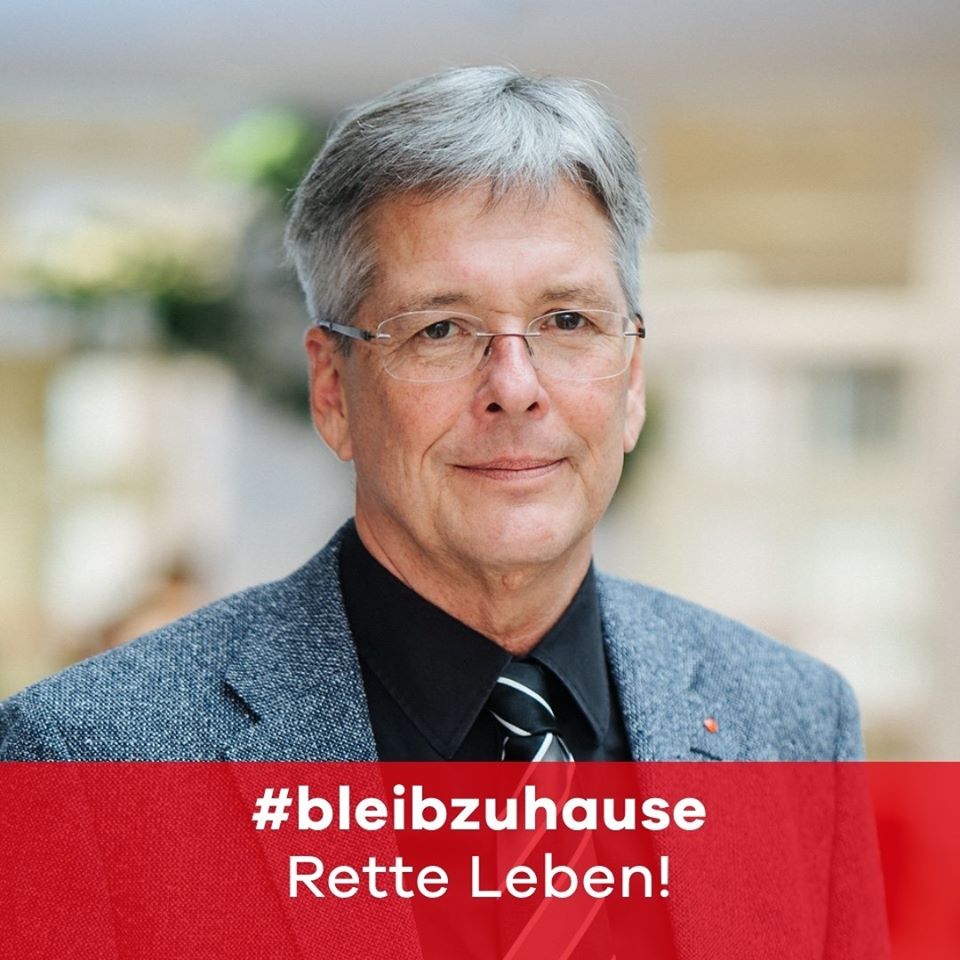
Personally, I am lucky enough to be fit and healthy! Sport sessions continue to be part of my daily routine. I usually go running very early in the morning so this allows me to stay at a safe distance because there are not many people around at that time. In addition to this, I also started riding a bike ergometer at home.
The pressure is of course enormous to contain by any means the Coronavirus pandemic that has hit us. Many Carinthians accomplish a huge amount of things every day: doctors and nurses, police officers, paramedics, cleaning staff members, grocers, authorities' employees, and the many Carinthians who help their neighbours in this difficult situation and go shopping for elder people. These men and women are the real heroes! On behalf of our entire population, I would like to thank them sincerely.
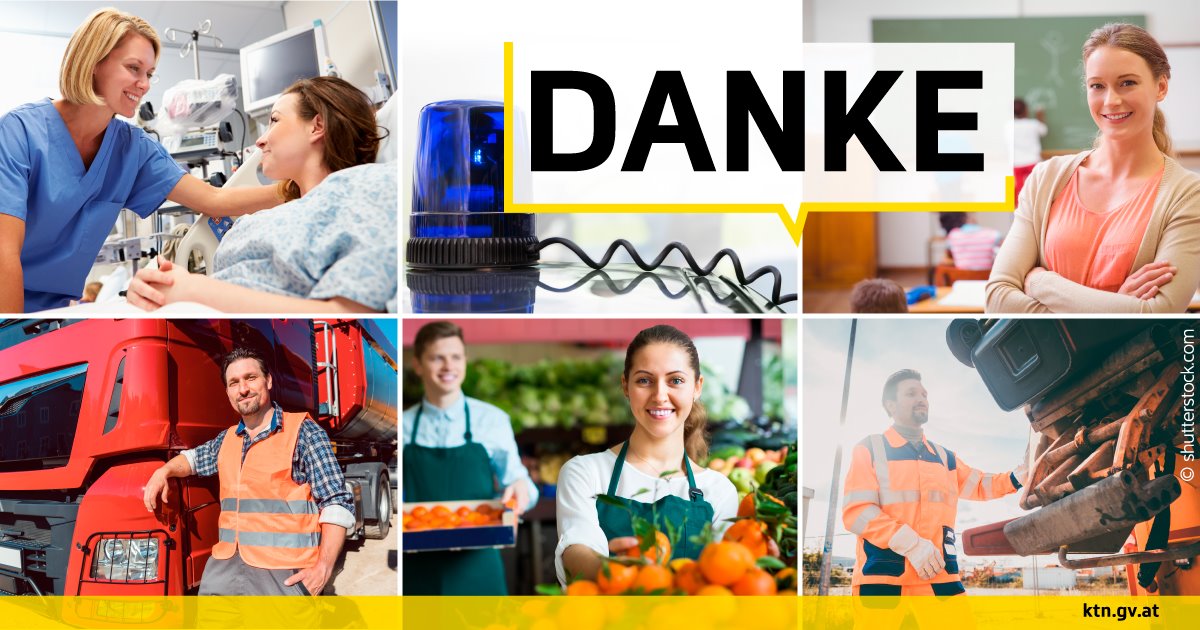

What is your message for the European Union right now?
Follow Peter on Twitter @PeterKaiserSP.
Peter Kurri, Municipal Councillor of Wiener Neustadt, Austria
How are you dealing with the COVID-19 pandemic?
Like other municipalities, Wiener Neustadt has established a shopping service for elderly and handicapped persons and also a hotline for citizens.
Apart from that, however, we have taken an action to which I would like to draw your attention.
- At my suggestion, our vice mayor, who is also responsible for the international relations of our city, has sent messages to our 3 twin cities Harbin (China), Desenzano del Garda (Italy) and Monheim (Germany). In these messages he pointed out the value of international solidarity and made an offer of mutual support.
- A reply to this letter came from Harbin, which not only contained thanks for the solidarity shown by the twinning, but also a contact to a manufacturer of protective equipment in Harbin.
Even in these difficult times, it definitely pays off even for a small town to cultivate its international relations and to look beyond its national borders.
We have started a restaurant raffle to help restaurant owners in our city. All municipal councillors have bought two €25 vouchers from different restaurants around the city and we will raffle them in the next two weeks. This measure is being advertised on social media and the local news and it’s a way to help the restaurant owners of our city and also give some lucky winners the opportunity to go out to eat.
What is your message for the European Union right now?
Peter Kurz, Lord Mayor of Mannheim, Germany, and PES Group member
(contribution published on 17 April 2020)
How are you dealing with the COVID-19 pandemic?
While the City of Mannheim and its hospitals are preparing for the peak of the Covid-19 outbreak, different measures have been taken in order to orderly shutdown social contact, to support businesses during the crisis and to help the citizens adapt to this new way of life.
Communication and transparency with the citizens is key, even more so in this time of enormous pressure on our economic and social cohesion. We address our citizens and the employees of the city administration regularly via social networks, the press and with the help of video messages, and explain why these measures are necessary. We also make it clear that the situation does not give cause for fear, but that it does require the help and solidarity of everyone.
We issue all information in the seven most spoken languages of the City as well as in a simple form of language and in sign language.
Due to the fact that young people often believe that the virus cannot harm them and that they therefore do not need to follow the instructions to stay at home, doctors at Mannheim University Hospital have called on young people to protect fellow human beings (and parents and grandparents in particular) and stay at home. Considering the high diversity of countries of origin among young people in Mannheim, the statement has been published in German, Turkish and Bulgarian.
Since Mannheim is a city with a comparatively high number of start-ups and SMEs (a result of years of consistent positioning of the city as a start-up hot spot), targeted measures exist for these businesses.
Of course, people are concerned about economic development. The necessary shut-downs are affecting the self-employed and the small businesses in particular. I have therefore held a telephone conference with companies in the food service and with creative industries (which have been particularly hit hard by the crisis), gathering 500 participants and over 2,000 viewers on Facebook. Representatives of the employment agency, job centre, tax office, The Office for Business Development and savings bank (Sparkasse) were also present at the table.
“Start-up Mannheim”, a subsidiary of the city, collects all relevant information for businesses and for the self-employed concerning emergency aids of the national and local government and assists them in their application. Furthermore, under the title "Cope with COVID" , they present initiatives, innovations and ideas from their network that use creativity and innovation to meet the new challenges in everyday life with the coronavirus. They do so to offer a platform for positive developments throughout the crisis and to promote digital offerings for social, economic and cultural exchange, to test interaction in virtual space and to transfer knowledge.
Furthermore, cultural workers try to bring culture into people's living rooms and broadcast, for example, concerts or give a virtual tour of a museum. Volunteers come together to help elderly and sick people with shopping in the neighbourhood for example.
What is your message for the European Union right now?
Follow Peter on Twitter @obkurz.
Karl-Heinz Lambertz, President of the Parliament of the German-speaking Community of Belgium, PES Group member
(contribution published on 28 May 2020)
How are you dealing with the COVID-19 pandemic?
Since the beginning of March, the coronavirus has had a firm grip on us and has affected our lives in diverse and sometimes radical ways - in Eastern Belgium, in the whole of Belgium, in Europe and all around the world.
During a crisis, public institutions must function properly, make the right decisions and work together efficiently: from the European level down to the national, regional and local levels.
This also applies to Eastern Belgium where the border proximity adds another dimension to the problem for which the Federal Government does not always have a sound understanding.
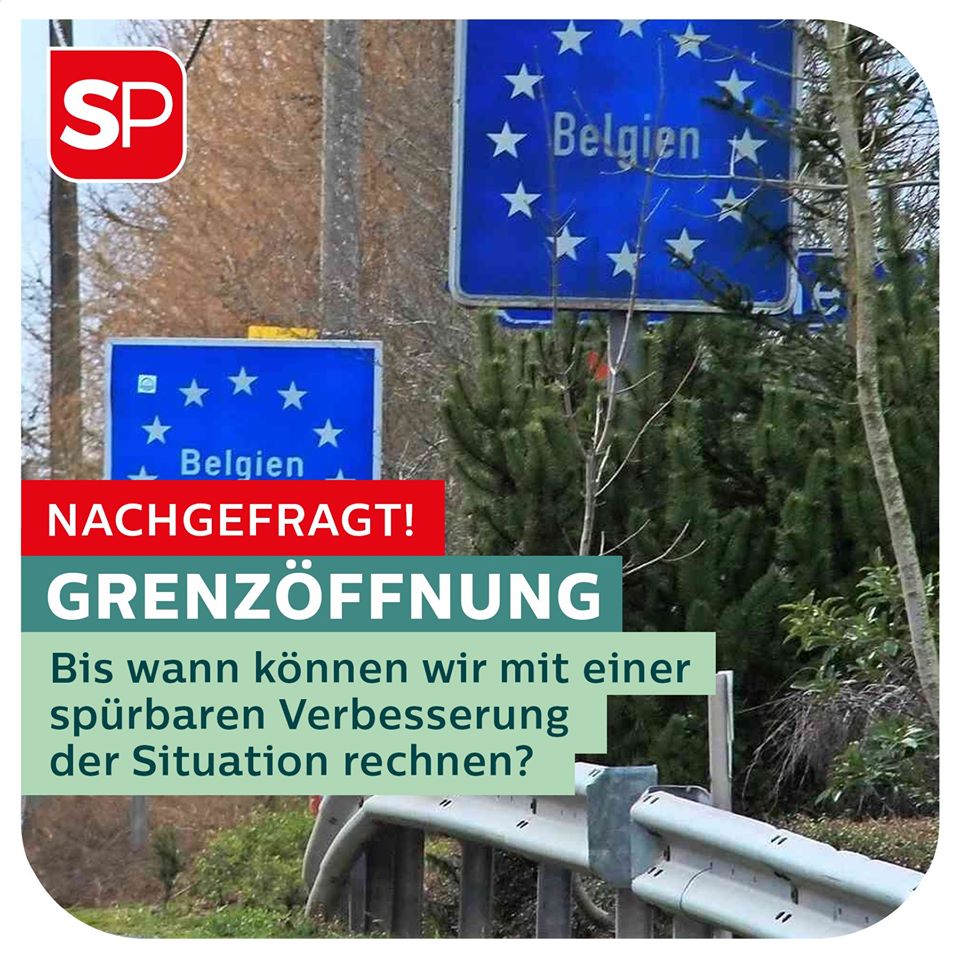
So far, the country has managed to deal with the consequences of the coronavirus crisis to some extent. This was possible thanks to our community's autonomy that allowed the Parliament, the Government and the municipalities (together with institutions, associations and companies) to work on a daily basis in a tailor-made and realistic manner to deal with the crisis.
This work must be continued in the coming weeks, months and years in a determined and result-oriented way. The authorities of the German-speaking Community (the Parliament, the Government as well as the local administrations and municipalities) have a local duty to provide the population with advice and action.
The democratic struggle to find the best solutions must not be overridden. In order to ensure the best possible information about all measures decided at national level, the Government of the German-speaking Community, in the person of the Prime Minister, works closely with all the actors involved in the National Security Council where it represents the position and interests of Eastern Belgians. The Government of the German-speaking Community pointed out in particular the need to re-open the borders quickly.
The Government informs the Parliament of the German-speaking Community in weekly special meetings (with all party group leaders) about the current state of affairs in crisis management and reports from the meetings of the National Security Council. In this context, for example, the most important decisions in the areas of schools, childcare and teaching, care to the elderly, health prevention, sport and culture, or the situation at the borders are discussed.
In order to guarantee a high level of parliamentary control and to create a legal framework for effective action, parliamentarians are allowed to participate in the committee and plenary sessions via video conferences. For example, the Parliament of the German-speaking Community has already passed two crisis decrees to ensure that the Government and the Public Services have the ability to act during the crisis.
The Government authorized the two crisis decrees to implement special decrees. These must be validated subsequently by a vote by the Parliament.
Crisis Decree I proposed that powers of the municipal councils can be exercised in part by the municipal colleges so that the local authorities can still act.
Furthermore, the decree has suspended numerous binding submissions, processes, decisions or opposition periods.
Likewise, 10 million euros of global funding were made available for the participation and financing fund of the German-speaking Community as an earmarked income.
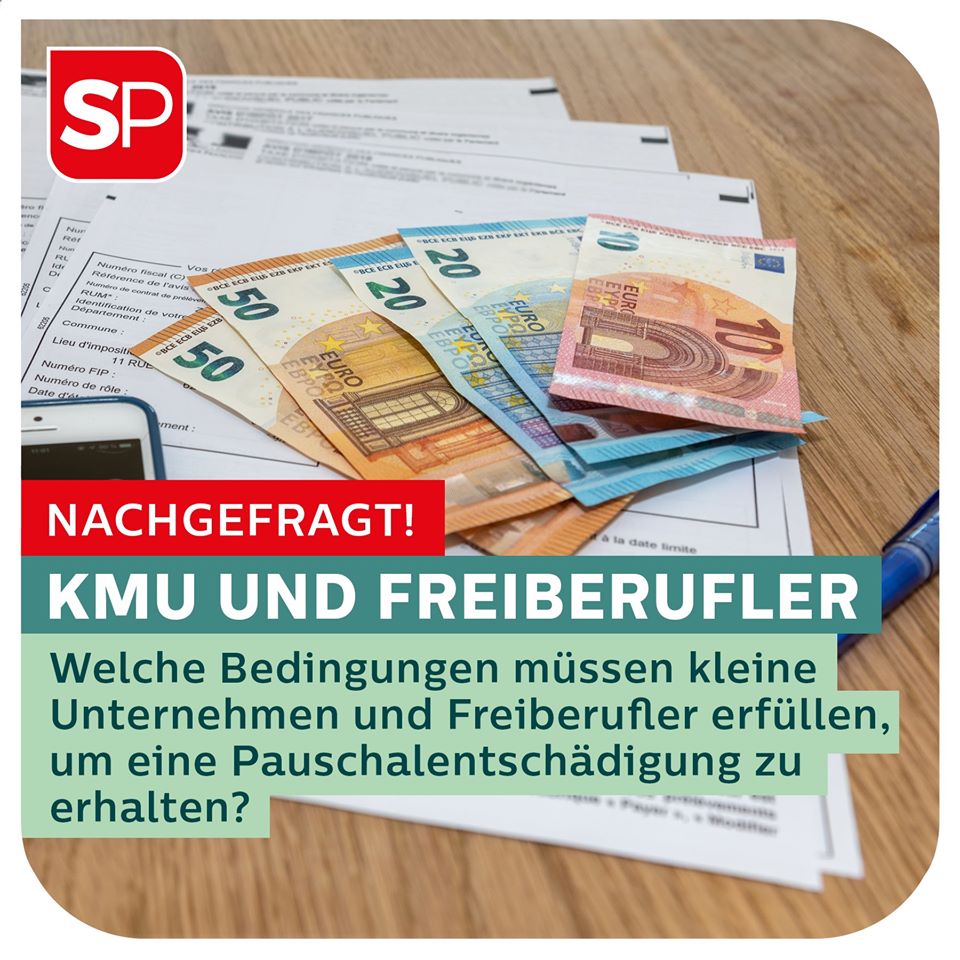
In the educational system, absences from schools and universities are considered justified due to the suspension of classes. The schools also offer home schooling and pre-teaching. Information technology material is made available to students and younger pupils so that they can take part in lessons from home.
Crisis Decree II complements the first decree with a grant guarantee for the socio-cultural sector. It enables a massive upgrade of the nursing professions. In addition, some technical adjustments have been made to the sector of employment to mitigate the effects of the corona crisis.
The German-speaking Community also handles contact tracing. The Crisis Decree III is currently being worked on, setting the exact modalities of contact tracing. A telephone exchange with 10 administrative employees has already been set up and put into operation. The Ministry of the German-speaking Community also provides information and communication on all measures in German.
However, the German-speaking Community supports its people far beyond their direct responsibilities. For example, medical protection material was made available to the professional actors in the health and care sector. The Minister of Health also had mouth masks ordered, which were distributed to all citizens across the communities.
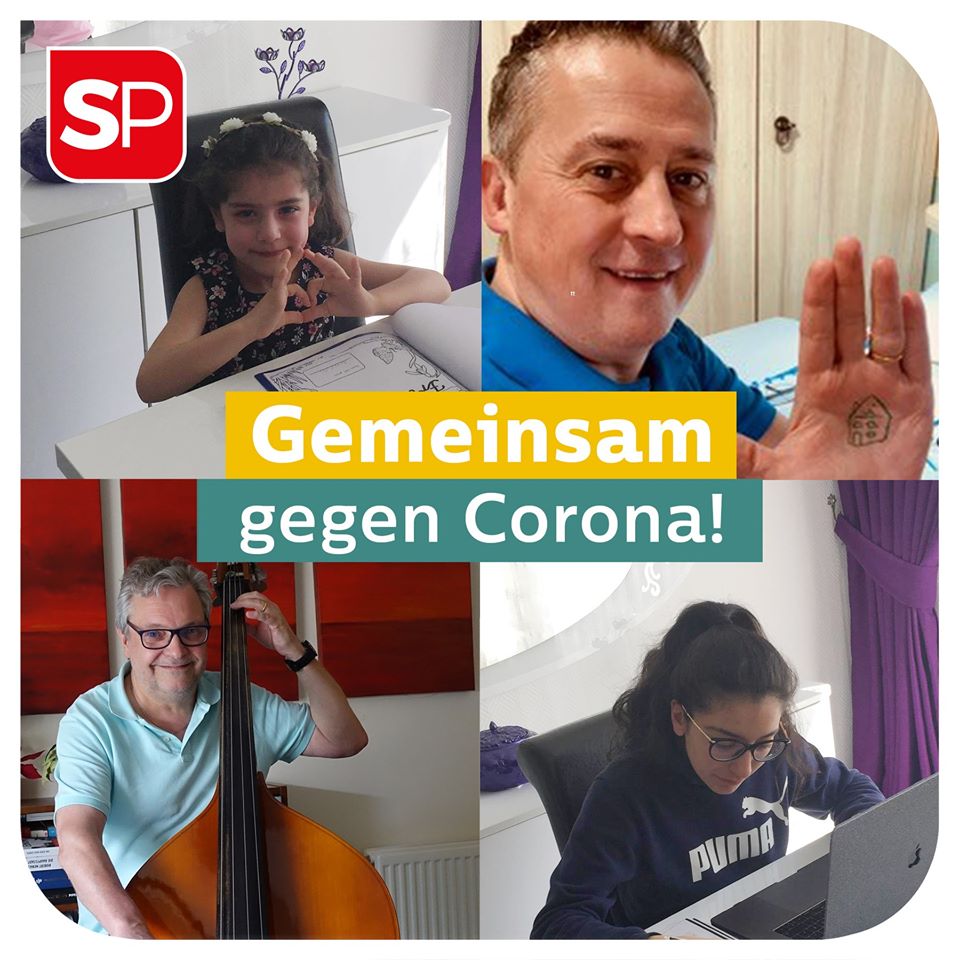
Monica Marini, Mayor of Pontassieve, Italy, and PES Group member
(contribution published on 4 April 2020)
How are you dealing with the COVID-19 pandemic?
Located 15 kilometres from Florence, Pontassieve is a town of 21,000 inhabitants built on a vast territory. It has a densely populated capital and several settlements on its surrounding hills.
After the first days of the COVID-19 emergency and once the first decrees were passed, our town had to manage an information conundrum because of the way it is laid out. We had to inform everyone whilst making sure that we did not worry our citizens excessively, particularly those who live in the countryside and in the smaller areas. As an administration, we had to activate a large communication network with our citizens, explaining the government's main rules and decisions as well as our municipality's provisions through the Facebook page of the Municipality, my institutional page, the municipality’s website and the local radio stations.
As the Mayor, I have written several open letters to my citizens and to their children (who are often forgotten in this emergency climate) in order to be closer to them. We also created flyers (explaining how to behave in this situation) that our local police force then distributed throughout the territory.
We were the first administration in the area to develop a list of establishments that do home deliveries and we organised and coordinated a service of delivery of groceries and medicines for those who are alone and fragile. We achieved this thanks to all the voluntary associations in our area that we involved in these projects from the very beginning. We are also preparing a postponement of municipal taxes as well as other types of administrative reliefs (apart from the ones the Italian government has already put in place) for those who are facing bigger difficulties.
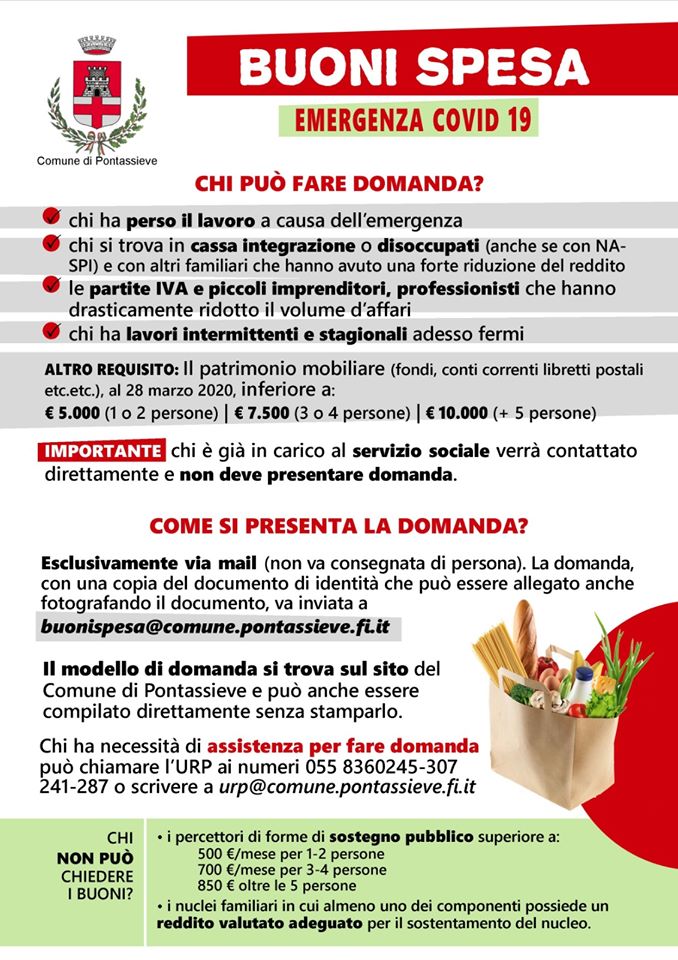
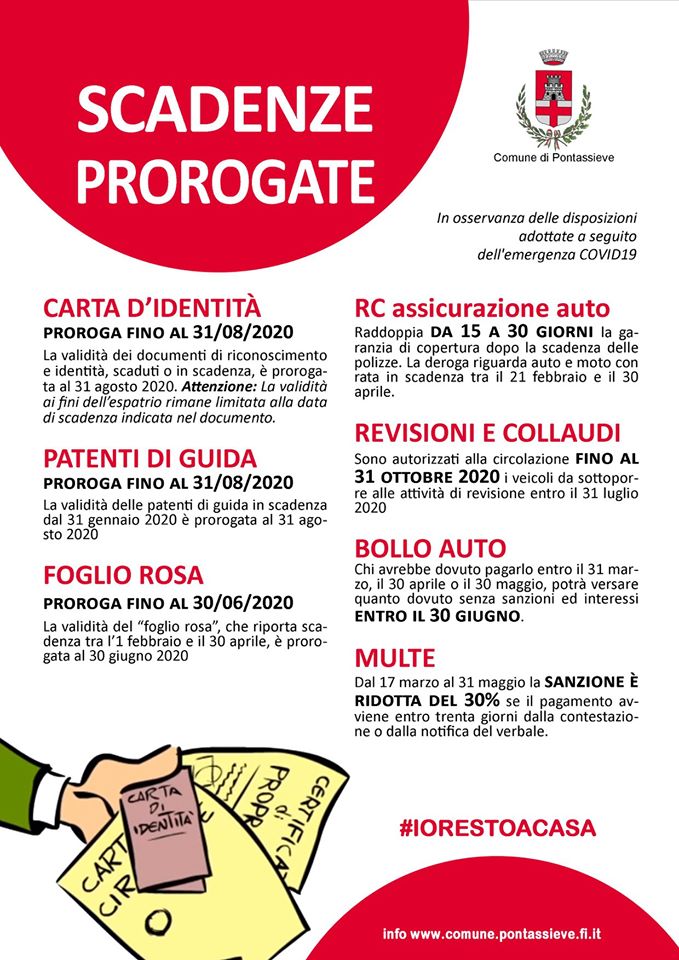
Just like the other municipalities, we closed down play areas and public parks to avoid people getting together. To make up for that, we decided to publish on our website (thanks to the workers of our local library) a series of videos with reading advice, games and film recommendations for those with young children. We also created a Spotify playlist to promote our local young musicians, and started a competition asking our citizens to send us their homemade videos to show us their talents.
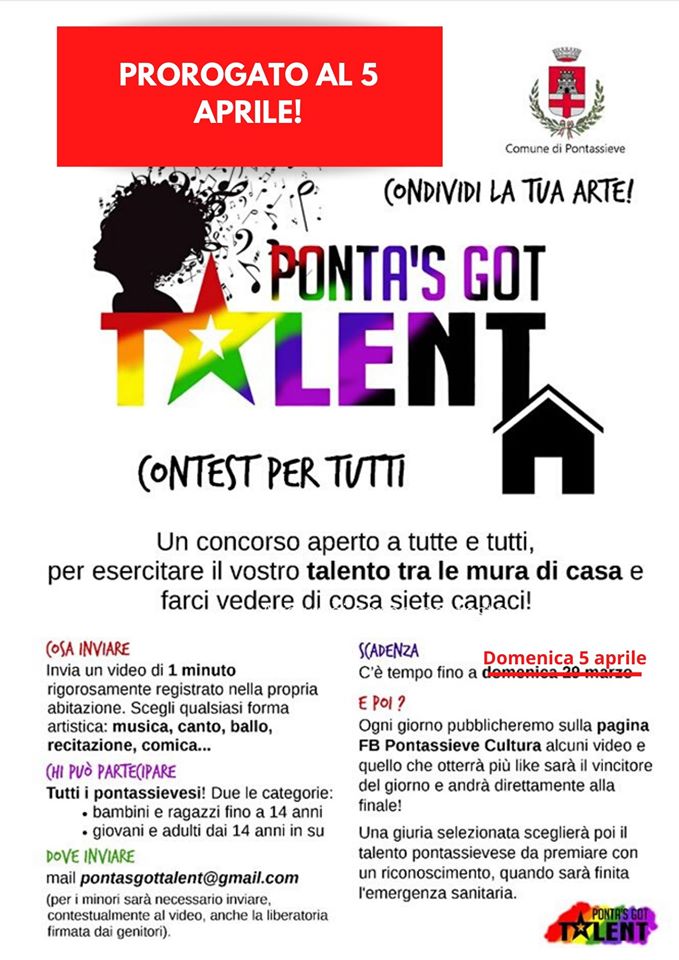
Together with the other municipalities of the area, we activated a free online psychological service for everyone and a monitoring and dialogue liaison system between social services and women who are victim of domestic violence. Since the start of this emergency, our social services have been in touch with almost 500 cases. They have been dealing with them individually and evaluating the best ways to support those who are the most in need.
The Municipality is offering to support and promote individual initiatives that have the potential to reinforce the sense of community and to reduce the discomfort and suffering caused by isolation. An example of this is the project of one of our citizens who is a chef and cooks traditional meals then delivers them to people’s homes at a discount price with an accompanying story.
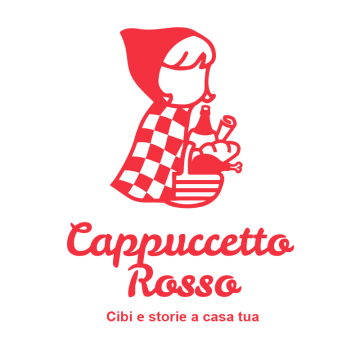
What is your message for the European Union right now?
Follow Monica on Twitter @MonicaMarini_fi.
*** Photo credits: City of Pontassieve and Mayor Monica Marini.
Krzysztof Matyjaszczyk, Mayor of Częstochowa, Poland, and PES Group member
(contribution published on 17 April 2020)
How are you dealing with the COVID-19 pandemic?
Firstly, we have our information actions that break down as follows:
- communicating on the maintenance of, and on the compliance with high sanitary standards;
- informing about the disease's symptoms and about the rules of conduct in case of detection of the symptoms in oneself or in persons around us;
- indicating (with address and telephone numbers) places that should be contacted in case of symptoms;
- giving access to a special helpline to provide information on available forms of assistance for residents in connection with the epidemic;
- updating the information for residents on the City Hall's website in relation to the actions taken against the coronavirus;
- having the Municipal Guard transmit to residents information and orderly messages with megaphones from their police cars when they patrol the city ;
- implementing an information campaign for the residents as part of the ‟Czestochowa in Houses” action, including Częstochowa's Facebook, using recognizable people on large screens that are driven around by a car broadcasting messages;
- encouraging people to stay at home via messages from the Mayor;
- limiting the April issue of the monthly magazine published by the Częstochowa City Hall to an online version containing articles on the operation of the municipal services to counteract COVID-19;
- purchasing additional necessary material for the implementation of tasks for preventing the spread of the coronavirus by the services and inspections subordinate to the Mayor of the City;
- asking the Silesian Voivode to secure funds for the amount of PLN 1 million for the purchase of personal protection equipment, disinfectants and cleaning products;
- establishing a cooperation with the Territorial Defense Forces in order to assist in the implementation of tasks related to preventing the spread of the coronavirus;
- making a request to the Rector of the Częstochowa University of Technology to check on all the persons from the student's house, planned as a quarantine facilit
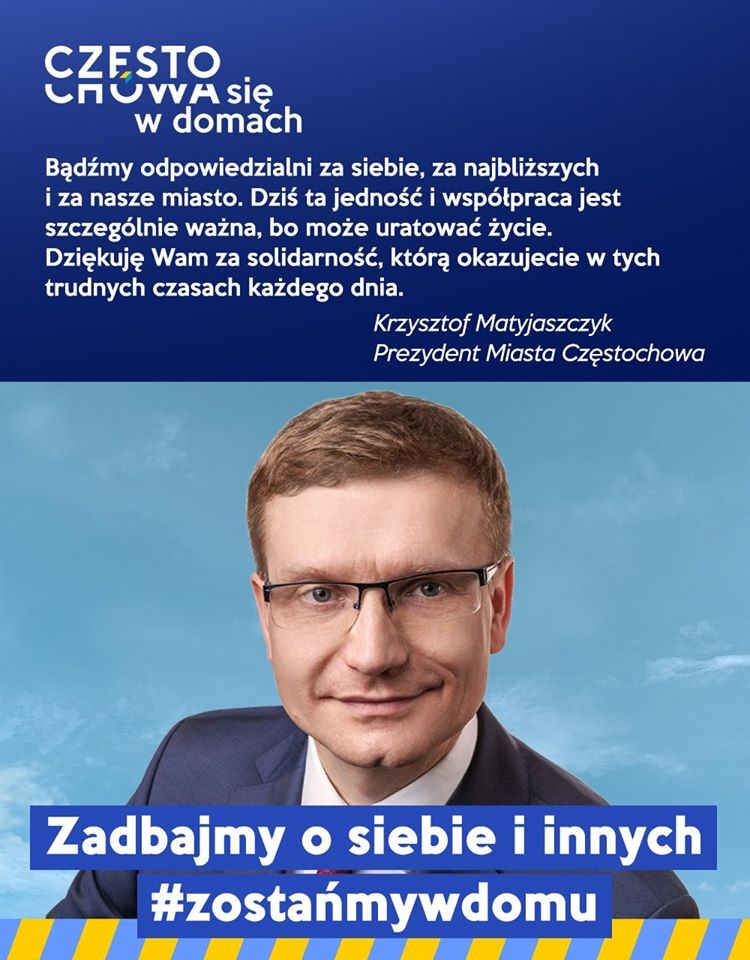
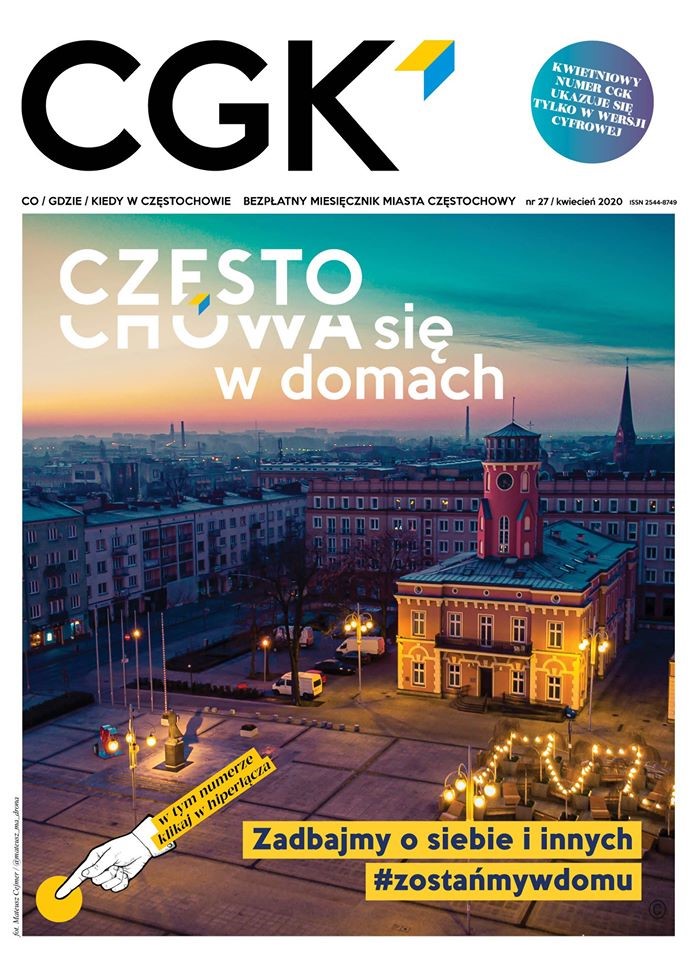
Transportation
Payments for parking in a paying zone have been suspended. We have also increased the number of buses on commuter lines. At pedestrian crossings, the buttons for requesting a light change have been disconnected.
Functioning of the City Hall
The Częstochowa City Hall has stopped providing direct services to its stakeholders. It is still working by e-mail and telephone (the exceptions being the Deaths Registry Office and points of contact with clerks for situations of emergency). The City Hall has developed rules to ensure that residents are offered free legal assistance and free of charge citizen advice by telephone and distance communication means. The Mayor of Czestochowa sent a letter to the Prime Minister of the Government of the Republic of Poland with proposals for legislative solutions aimed at reducing the inconveniences associated with the risk period of the epidemic. The aim is to simplify administrative procedures, draw attention to the problem of parents of children with disabilities and introduce protective support for entrepreneurs.
Support for health services
The Mayor of the City and the Director of the Municipal Hospital asked for support for Częstochowa hospitals due to the coronavirus emergency. Spontaneously, some companies already started helping out. After the Mayor's call, other bodies joined the organized action. NGOs from Częstochowa have also joined the campaign. The City Authorities allocated an additional million zlotys to support the Municipal Hospital, including the purchase of seven respirators, 300 overalls, personal protective equipment and disinfectants. Volunteer firefighters and Municipal Guard Officers were selected to help in hospitals and to serve people in quarantine. Tents equipped with heating have been prepared as admission rooms for patients. An agreement was made with the authorities of the Jasna Gora Sanctuary to make the rooms in the Pilgrim's House free of charge for medical staff so that those who are afraid of infecting their families can reside outside their house.
Aid to entrepreneurs
The Municipal Authorities have presented a framework for a possible State aid in terms of local taxes and charges for entrepreneurs and companies, tenants of municipal land and leaseholders of municipal commercial premises affected by the epidemic. For the 14 March to 30 September 2020 period, the City Authorities abandoned the calculation of the extension fee for the distribution in installments or the deferral of tax payments and tax arrears, constituting the Częstochowa Municipality's income. The City Hall's Investor Service Centre (Centre for Better Workplaces) provides ongoing telephone advice for both entrepreneurs and employees of Częstochowa companies. The application procedures were also simplified, e.g. for financing the installation of solar collectors. A poster informing people about the rights and obligations of employers was issued.
Social welfare
Projects are carried out in relation to people who are facing homelessness, seniors and sick persons. The Municipal Social Welfare Centre maintains contact with people under house quarantine, collects information about possible needs for food, medicine or psychological support. An action was taken to provide computers for children in the scope of remote teaching. The Częstochowa Crisis Intervention Centre provides 24-hour psychological assistance.
Seniors
Actions have been organized to provide medicine to the older residents. Seniors have had ‟life envelopes” delivered to their homes in which important information about their health is detailed. Thanks to this, services called in case of life threatening situations do not waste time in interviewing the patient. The envelopes can also be picked up at District Community Centers. Grandchildren, volunteers and neighbors of the elderly can also bring information cards to them or can help complete them by adding the telephone numbers of their loved ones or of their neighbors. This can help to speed up the assistance considerably. In addition to this, as part of the ‟Częstochowa supports seniors” campaign, the Mayor called residents to help those most at risk from the coronavirus who cannot or who are afraid to leave their home. Seniors, on the other hand, are encouraged to take advantage of neighborly help.
Wzór karty możecie pobrać z postu podlinkowanego poniżej:https://t.co/uuxHtaXRwT
— Matyjaszczyk Krzysztof (@MatyjaszczykK) March 19, 2020
Cooperation at national and European level
A permanent cooperation with national organizations (such as the Association of Polish Cities, the Silesian Association of Municipalities and Counties) exists to take up a common, self-governing position in order to pass it on to the central authorities and submit proposals for changes in the law. Supporting, cooperating and showing solidarity in caring for the European community is the task of the President of the Association of Towns who was awarded the Europe Prize and falls within the framework of Czestochowa's activity in the international association “Shrines of Europe”.
What is your message for the European Union right now?
Follow Krzysztof on Twitter @MatyjaszczykK.
Fernando Medina, Mayor of Lisbon, Portugal, and PES Group member
(contribution published on 26 April 2020)
How are you dealing with the COVID-19 pandemic?
Here is a breakdown of our different initiatives:
Social services
- The City made an emergency transfer of 600,000 Euros to various organizations that provide social support services to vulnerable groups of the population (homeless, persons with disabilities, families with lower incomes, children, etc.). The aim is to allow them to ensure the continuity of their services throughout this crisis.
School meals
- For families with lower incomes, the meals provided at school (breakfast, lunch and mid- afternoon snacks) are an important part of social support. The City, which is responsible for this service during the school year, will ensure its continuity during the whole period of school closure. This measure (which covers around 8.500 children) is being provided in a take-away format – i.e. families can pick up their meals between 12h00 and 13h30, in a set of schools referenced as collection points (which cover the whole territory).
Senior citizens
- The City and its local partners are ensuring the continuity of ‟home support” (which includes warm meals, personal hygiene and medication) to the over 4000 pre-existing beneficiaries of this service. They are also extending the coverage of ‟home support” to also serve senior citizens who were previously using day care centres and to those who do not have enough autonomy to cook their own meals.
Homeless citizens
- The City has opened two new shelters that meet all the conditions to carry out a proper quarantine. All homeless shelters have approved contingency plans and reinforced sanitation measures in place as well as isolation spaces for suspected cases of infection.
Support to essential workers
- In conjunction with the Ministry of Education, the City is ensuring that nine public schools remain open to welcome the children (aged up to 12 years old) of essential workers, coming namely from the health services, the police forces and the fire brigades.
Close cooperation with local boroughs
- The City is partnering up with its 24 local boroughs to support the acquisition of basic necessities (medication, food) for those most in need, namely the elderly (65 and over), chronic patients, and patients put under home quarantine. Dedicated phone lines have been created to provide company and psychological support to those in isolation (this includes WhatsApp connections between the young and the old).
Solidarity network
- We are identifying, organising and mobilizing volunteers to support the most vulnerable sectors of the population (senior citizens, persons with disabilities, patients under quarantine). These volunteers (who cannot belong to one of the ‟at-risk groups”) can perform various tasks, including shopping (food and medication), pet care (e.g. walking dogs) and maintaining contact (e.g. as a way of preventing or detecting cases of domestic violence).
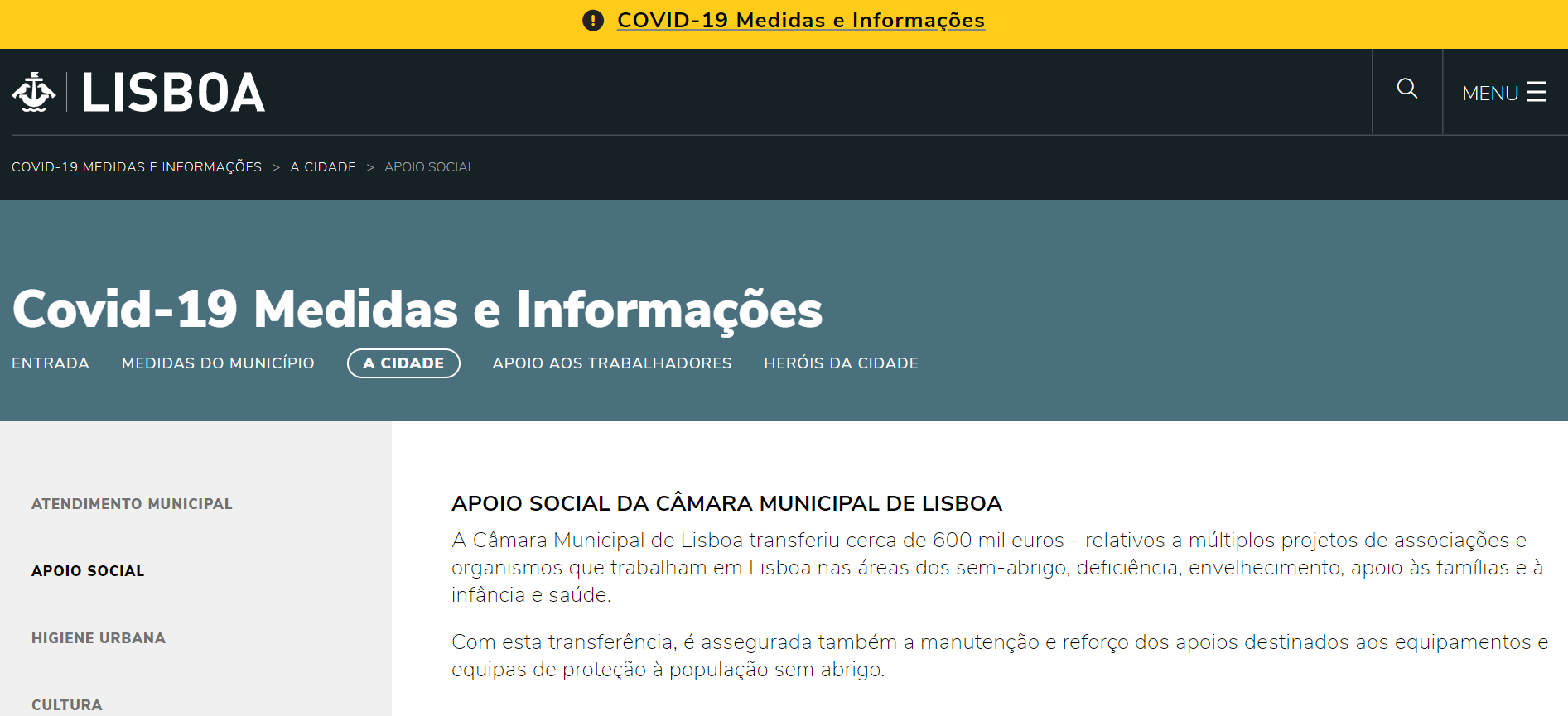
COVID 19 Screenings
- In conjunction with the Public Health Authorities, the City created two dedicated screening centres.
Parking
- The payment of parking meters has been suspended and residents can now use parking garages for free.
Public transports managed by the City (buses and trams) are being implemented with the following preventive measures:
Frequent disinfection of all vehicles in service.
Special attention given to avoiding contact with the driver:
- physical separation from the driver with an improved barrier;
- boarding and alighting with all movements done through the back door and
the front door remaining closed; - on-board sales of tickets are suspended;
- ticket validations have become optional;
- a mandatory service is guaranteed at all stops so that passengers do not have to press the “stop” button.
Home Deliveries
To facilitate the operation of delivery services, in a time of increased demand, we recommend the use of:
- shared bikes – the use of the bike sharing service GIRA has been made available to those delivering food and medication (this type of use was previously prohibited);
- taxis and ride-hailing – the City created a special partnership so that these mobility operators can provide this type of service (as an ‘extra’) throughout the duration of the state of emergency.
“Yes, we’re open” Portal
This is a web platform that shows which local shops remain open to sell food, medication and other basic necessities. It includes restaurants with take-away and deliveries. It is convenient and helps prevent unnecessary trips. Check it out here.
Our economic measures include:
Municipal Rents
- Until the 30th of June, suspension of payment of rent in all municipal fares. Payments will be phased in over the next 18 months.
- Until the 30th of June, the payment of rent is fully exempted for all commercial establishments in municipal spaces (including municipal companies) that are closed.
- Until the 30th of June, the payment of rent is fully exempted for all social, cultural, sporting or recreational institutions installed in municipal spaces.
Social Emergency Fund
- We are reinforcing the Social Emergency Fund destined at families, social institutions and to the purchase of goods, services and equipment (that become necessary in this emergency situation) with the amount of € 25M.
Reforçar o Fundo de Emergência Social. Uma das 15 medidas da CML para apoiar famílias, empresas e emprego. #COVID2019 pic.twitter.com/ycsVFHbwdR
— Fernando Medina (@FMedina_PCML) March 25, 2020
Fees
- We are suspending the collection of all fees related to public space usage and advertising to all commercial establishments, with the exception of banking establishments, credit institutions and insurance companies. This initiative has begun with retroactive effects on the 1st of March and will end on the 30th of June. Establishments whose annual license expires during this period of suspension will only have to request this renewal and make the respective payment as of the 30th of June.
Municipal investments
- We are ensuring the implementation of the investment plan for 2020 and subsequent years of the Lisbon City Council and Municipal Companies, estimated at 620 million euros, as a way of strengthening public service, supporting employment and preserving productive capacity.
We are anticipating the payments to designers, namely architectural, engineering and technical services offices - immediate payment upon delivery of the project by up to 50%, the remainder being paid after approval.
Urbanism
- We are keeping urban licensing in full operation, ensuring the use of teleworking by more than 400 workers in these areas. This measure aims to support the entire range of architects, designers, developers and builders, essential to the recovery of employment and the economy.
Support for start-ups, micro and SMEs
- We are creating a support team for micro and SMEs (Lisboa Empreende) in order to ensure information on all existing support, as well as consultancy to mitigate the effects of the crisis and promote economic recovery. This team will include specialists in the various areas (banking and finance, consulting, communication, legal, etc.).
- We are creating a marketplace that combines the needs of companies, institutions and municipalities with the skills and offers of the entrepreneurial ecosystem in Lisbon. We thus enable start-ups to continue to function by developing technological solutions to today's challenges.
Support for the cultural sector
- We are ensuring for cultural agents the full payment of contracts already signed, by rescheduling their planning, adapting them for online transmission, or strengthening support for the entity's structure.
- We are speeding up payments to cultural entities in the city that are already receiving support, in order to support their operating structures.
- We are extending the supports to agents and entities in the cultural sector that are not currently covered by municipal support, namely through the Municipal Emergency Fund. At the same time, the fund to support acquisitions in the field of fine arts will be strengthened and its scope extended to the sector of books and public art.
What is your message for the European Union right now?
Follow Fernando on Twitter @FMedina_PCML.
Luca Menesini, Mayor of Capannori, President of Lucca province, Italy, and PES Group member
(contribution published on 1 April 2020)
How are you dealing with the COVID-19 pandemic?
We help citizens from the operational centre of the civil protection. First of all, we help those who are enduring the health crisis, the positive cases and those in quarantine. Our help consists of providing psychological assistance over the phone and supplying food, groceries and medicines. This mainly concerns the elderly in our area; those who are in riskier groups and who must stay at home. This solidarity is bringing our community closer but it also takes the shape of a specific and material help by bringing groceries to homes. We do this thanks to all the volunteers in our area. Another project that we have developed is a fundraiser for medical equipment. With these funds, we have bought protective equipment and masks for all the health carers of our hospital because their protection is essential. We have also launched another fundraiser to buy groceries for those who have lost their jobs and are even struggling to feed their children.
What is your message for the European Union right now?
Follow Luca on Twitter @Luca_Menesini.
***Photo credits: Luca Menesini on Facebook.
Virginio Merola, Mayor of Bologna, Italy, and PES Group member
(contribution published on 18 May 2020)
How are you dealing with the COVID-19 pandemic?
The commitment of the City of Bologna mainly addressed itself to the most fragile people: the elderly, homeless people, women facing situations of domestic violence and children. The aim was also to try to enhance the collaboration between businesses and the public administration, the world of associations and of volunteering. The anti-violence centres have always remained open, offering free listening and reception services. We have activated a telephone assistance service for about 8,500 elderly people who are in fragile conditions. For the homeless, facilities have always remained open 24 hours a day and street support has been upgraded.
Se vivi una #RelazioneViolenta puoi #UscireDiCasa NON devi avere #AUTOCERTIFICAZIONE #Chiamaci o #Scrivici quando vai a #FareLaSpesa o a #GettareLeSpazzaturehttps://t.co/4ppK15ODQ1@Twiperbole pic.twitter.com/gVGIzHl7Ri
— MondoDonna Onlus (@MondoDonnaOnlus) April 10, 2020
Anche nella solitudine possiamo non essere isolati.@AUSLBologna ha attivato "Parla con noi - Comunità in connessione", supporto psicologico a distanza.
— Comune di Bologna (@Twiperbole) April 7, 2020
Tel: 051 6597234 da lunedì a venerdì dalle 10 alle 17
Email: info@sogniebisogni.it
Leggi: https://t.co/wjLybHLzIy #Bologna pic.twitter.com/zRF5efEK8m
Finally, I would like to mention three new projects that I consider particularly important:
- “Unity makes groceries”: a home delivery service of food and pharmaceuticals for the most vulnerable people i.e. those in need of assistance, disabled people, and those suffering from chronic diseases or from immunodeficiency. The service was activated thanks to a protocol that the Municipality of Bologna signed with the supermarket chains Coop Alleanza 3.0, Conad, Pam and the world of associations and volunteering of Bologna represented by Auser, Forum Terzo Settore and Centro Servizi di Volontariato Volabo (CSV).
- A park for people with autism or with other behavioural disorders, and for their helpers.
- “Stay together… at a distance”, teachers, educators and caregivers of crèches, centres for children and families, kindergartens, local educational services (with the support of pedagogical coordinators) maintain a constant direct relationship with parents and children in their sections, proposing different forms of contact and sharing.
Firmato stamattina un protocollo per consentire, in condizioni di massima sicurezza, il servizio educativo per gli alunni #disabili di #Bologna https://t.co/IjUEbbReMW @cittametrobo pic.twitter.com/nP04t21f8y
— Comune di Bologna (@Twiperbole) May 13, 2020
Finally, culture, one of Bologna's most important trademarks in the world, has never stopped.
Alle #CollezioniComunalidArte si trova una mirabile statua: è il mercante bolognese Pannolini dello scultore Agostino Corsini (1745). Per saperne di più: https://t.co/13DciHUxWY#BolognaMusei #iorestoacasa #laculturanonsiferma #apertiaportechiuse #aportechiuse @Twiperbole pic.twitter.com/1XpBXxGprR
— Musei Civici d'Arte (@MuseiCiviciBolo) May 12, 2020
Ecco la “Bicipolitana - rete #ciclabile metropolitana bolognese” presentata questa mattina da Città metropolitana e Comune di #Bologna. Un piano per accelerarne la realizzazione alla luce dell’emergenza sanitaria:https://t.co/Lv4MaRourK#BolognaMetropolitana@Twiperbole pic.twitter.com/nJpJYL194p
— CittàmetroBologna (@cittametrobo) April 29, 2020
Se vogliamo che i cittadini ci diano fiducia dobbiamo dare loro fiducia. Sulla #Fase2 a #Bologna e sul #DlRilancio ho parlato ai microfoni di @centocittarai https://t.co/3ttXOVFUlj
— Virginio Merola (@virginiomerola) May 12, 2020
What is your message for the European Union right now?
Follow Virginio on Twitter @virginiomerola.
Frank Meyer, Lord mayor of Krefeld, Germany
(contribution published on 30 April 2020)
How are you dealing with the COVID-19 pandemic?
In Krefeld, we attach a great importance to promoting solidarity within the city and to the fact of living our everyday life together. For the second time in these last few months, the strength and effectiveness of our cooperation are once again facing a difficult situation.
After the devastating fire that happened in Krefeld's Zoo on New Year's Eve and the enormous wave of support that followed in the weeks after it, we are now faced with the much greater task of coping with the coronavirus epidemic. So far, we have succeeded in doing this through the interaction of public authorities and civic engagement, although of course we are learning every day in this unprecedented situation, like everyone else.
When the extent of the crisis became clear, various offers of help (partly initiated by the local administration, partly by the citizens) developed within a few days. Aid organizations and associations have been sewing mouth and nose protection masks for weeks and giving them free of charge or against donations. The tailoring department of the city theatre is also participating in this sewing campaign and, among other things, has equipped the volunteers of the “Tafel Krefeld” (where homeless people can enjoy a warm meal) with masks. The sewn masks are also donated for example to refugees as they are helplessly exposed to the virus in their wait at the EU's external borders.
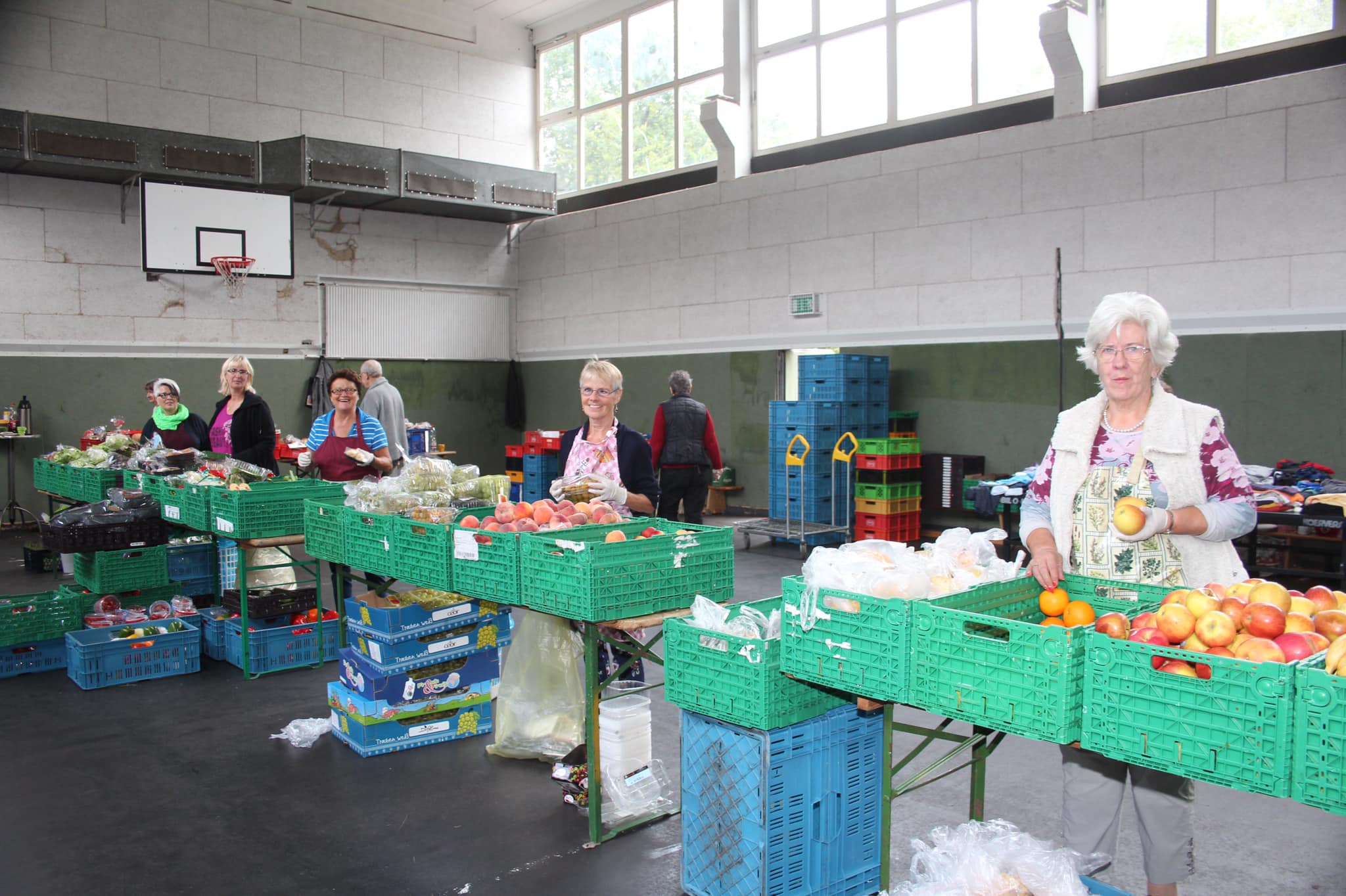
The ‟Krefeld solidarity” campaign (in which various youth institutions and social alliances participate) organizes a shopping service for older people and for members of high-risk groups. In the city centre, a ‟gift fence” has been put up so that everyday items and durable food for the homeless and their dogs can be hung.
As a ‟Europe Active Community”, Krefeld wants to maintain solidarity within the EU even in these times of coronavirus. For example, patients from the Netherlands have been treated in our local clinic. In addition to this, the Krefeld administration maintains a close contact with its partner cities, exchanges views and informs its citizens about how people are doing in this coronavirus period elsewhere in Europe.
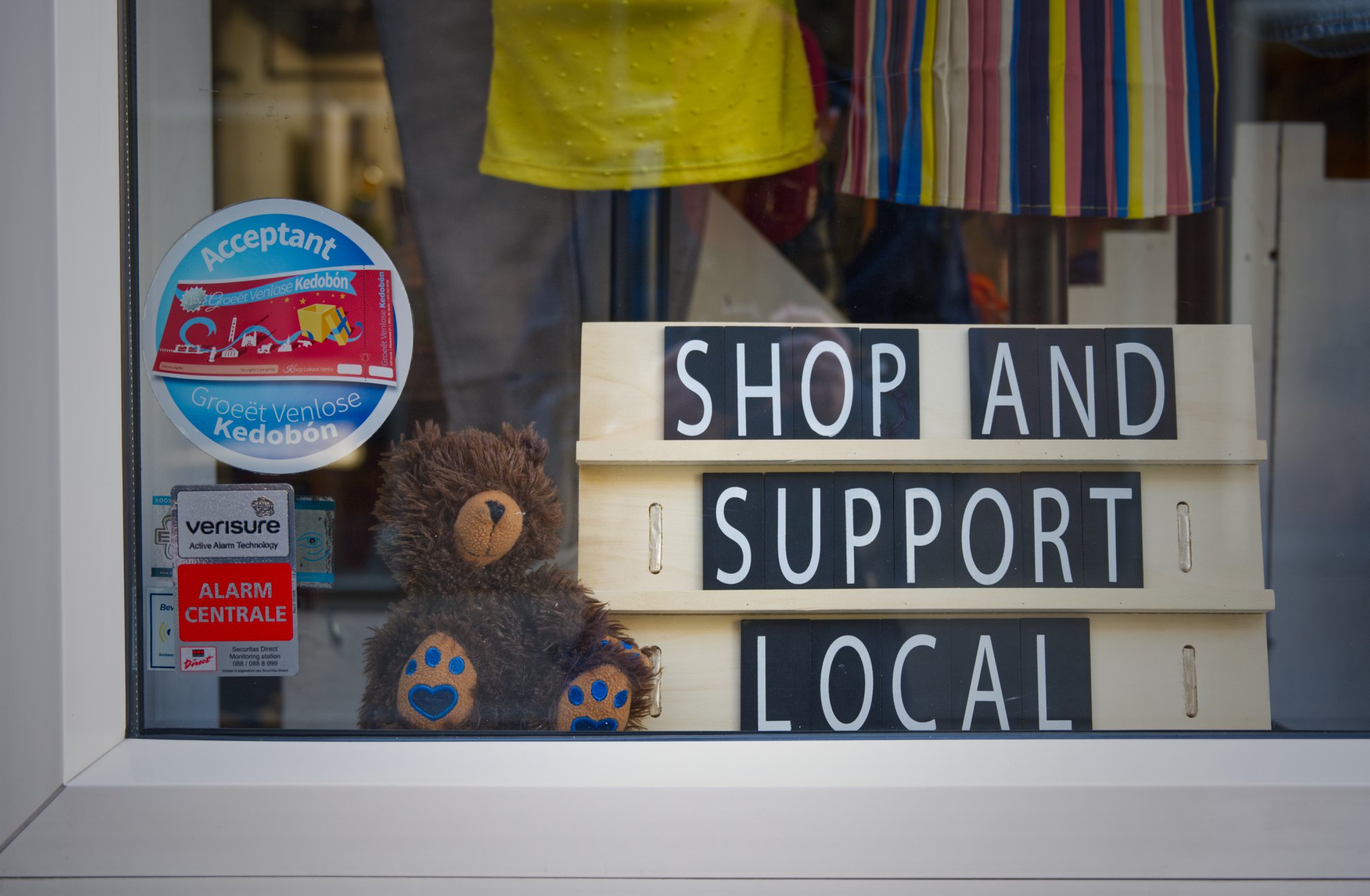
In a global crisis in particular, solidarity must not end at city or state borders. That is why Krefeld sees itself as a cosmopolitan city even in these times - although unfortunately the interpersonal encounters must now take place in other ways.
Super Aktion von den kleinen Spielsportlern! #Krefeld https://t.co/j3jpWqaLae
— Frank Meyer (@FMeyerKR) April 2, 2020
What is your message for the European Union right now?
Follow Frank on Twitter @FMeyerKR.
***Photo credits: City of Krefeld, press and communication and Tafel Krefeld e.V.
Vojko Obersnel, Mayor of Rijeka, Croatia, and PES Group member
(contribution published on 28 May 2020)
How are you dealing with the COVID-19 pandemic?
This dramatic pandemic has hit hard all the countries of Europe and practically the entire world, the city of Rijeka being no exemption. Yet, this pandemic has brought about a specific kind of communality and solidarity amongst all people, citizens of Rijeka included. In Rijeka, a great number of these types of action were instigated by the Rijeka City Administration (which is headed by Mayor Vojko Obersnel, a PES group member), while many were still initiated within a wider community. The Mayor has repeatedly acknowledged the latter as an exemplary case of solidarity - both on the City's official webpage and on his official webpage.
Immediately after the start of the epidemic and the establishment of the lockdown measures, the City of Rijeka and the Red Cross organized the delivery of food and medication to senior citizens as well as to sick or incapacitated persons (belonging therefore to the high-risk population) during the coronavirus pandemic. The Red Cross was joined by employees coming from the Rijeka 2020 European Capital of Culture project as they were not able to keep using previously planned cultural programmes due to the lockdown and to protective measures to stop the virus' spread. Therefore, they chose to serve their community differently and to join humanitarian workers. Very shortly after the outbreak, numerous citizen groups appeared all over the city to help elderly people and chronically ill patients, along with the already established network of Red Cross volunteers. In addition, the football fans of local FC Rijeka made themselves available to the Headquarters of Civil Protection, subsequently participating in several actions related to the preparation of city facilities designated for the potential quarantine of a bigger number of infected or sick people.
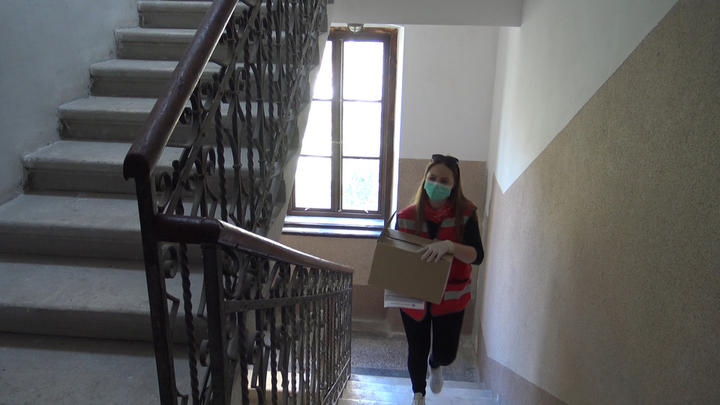
The childcare experts from Rijeka kindergartens used Facebook and various web pages to suggest to parents useful ideas for meaningful games and activities at home. Numerous individuals, NGOs and companies donated means and funds to assist both citizens and institutions. Donations mostly consisted of protective masks and visors, as well as of other protective equipment that provide a maximum level of safety both to healthcare workers and to citizens. One of the doctors who was born in Rijeka (and who returned to Croatia during the outbreak after seven years of working in London) initiated with his colleagues a crowdfunding campaign for the production of CroResp respirators for the protection of healthcare professionals.
After the open-air sections of the food market were closed down as a preventive measure against the coronavirus' spread, small agricultural farms began offering their homegrown products to the citizens of Rijeka and Primorsko-goranska County via the internet. A user of the Start-up Incubator Rijeka decided to help local small farms, the food and drink producers, by creating – in an extraordinarily short period – a webpage that became a virtual market for selling and delivering these homegrown products.
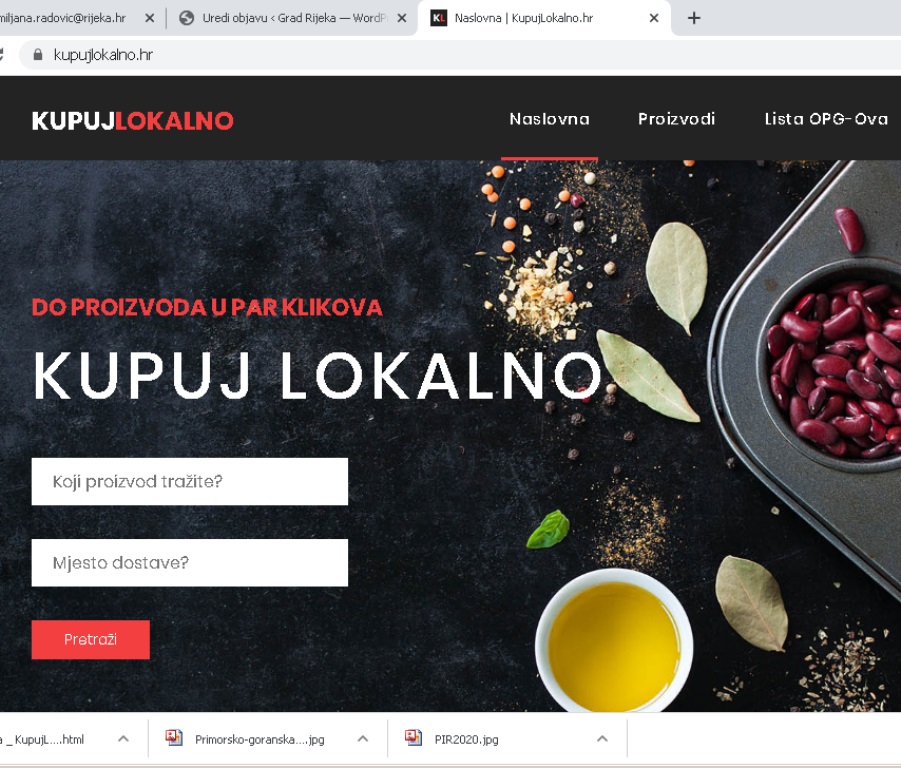
During the COVID19 crisis, the cultural sector reacted with solidarity. Rijeka's theatres created online programmes so that audiences of all ages could enjoy culture during the lockdown given that many institutions were completely closed to the public. The Croatian National Theatre Ivana pl. Zajca created ‟Zajc Remains With You Online” and the City Puppet Theatre produced a similar online programme entitled ‟Puppet Theatre on Your Sofa”. The City Library of Rijeka simplified the procedure to get a user PIN to borrow the Library’s e-books from the ZaKi Book platform.
MUBI, a popular platform, created a special webpage for the visitors of Art Cinema Rijeka who were given the possibility to watch – free of charge – all the movies available on MUBI. A multitude of ideas on how to organize children's days at home were offered by Brickzine. This popular Rijeka magazine, which was created within the program of Rijeka 2020 – European Capital of Culture, is all about culture for kids.
The Rijeka Sports Federation initiated a so-called ‟Sports Reading” that was intended for the junior elementary school pupils and was available via the Rijeka Sports Federation YouTube channel that successively published eight books on top athletes and various sports.
The ongoing NGO Portić project (whose members read stories to kids hospitalized at Rijeka's Children Hospital) switched to online readings given the fact that their ‟Talking Aunties” were not able to visit kids during the lockdown.
A group of young female writers of Rijeka started a platform for collective literary creation, inviting all readers and writers to participate.
Rijeka musicians drove around in the Rijeka Tourist Bus and held 12 mini-concerts in various neighbourhoods of the city, their concerts being a gift to all citizens during the lockdown. This further inspired several neighbourhood concerts that cheered up citizens and spread optimism.
The Facebook page ‟I Love the city that flows” that brings many citizens of Rijeka together, published numerous citizens' initiatives, offers of help and praises to those who helped others in any way. Some of the posts were quite emotional and others were more practical, providing information on food deliveries and adjacent protective measures, on offers for walking pets or even on proposals for free online language courses and other similar services.
Most importantly, Rijeka was one of the very first cities in Croatia to come forth with a range of very concrete measures for small and medium-sized businesses in this time of crisis. These measures primarily targeted those who had to close down their business, but also those who were able to continue to work but suffered significant financial and business losses.
The City of Rijeka relieved these businesses (entirely or partially) from all legal and financial obligations towards the City (as the unit of local government) by disburdening businesses from financial obligations and enabling them to keep their employees in this time of crisis.
In this way, the City of Rijeka deliberately decided to give away a large part of its income, getting together symbolically with all those whose lives came to a stop due to the virus pandemic.
At the same time, because a large number of people will face subsistence problems and the impossibility to ensure their basic living means, employees of the City Government worked out the changes of the City's Decree on Social Care. The new decree brought a 25% raise to the funds allocated to the Social Programme of the City of Rijeka.
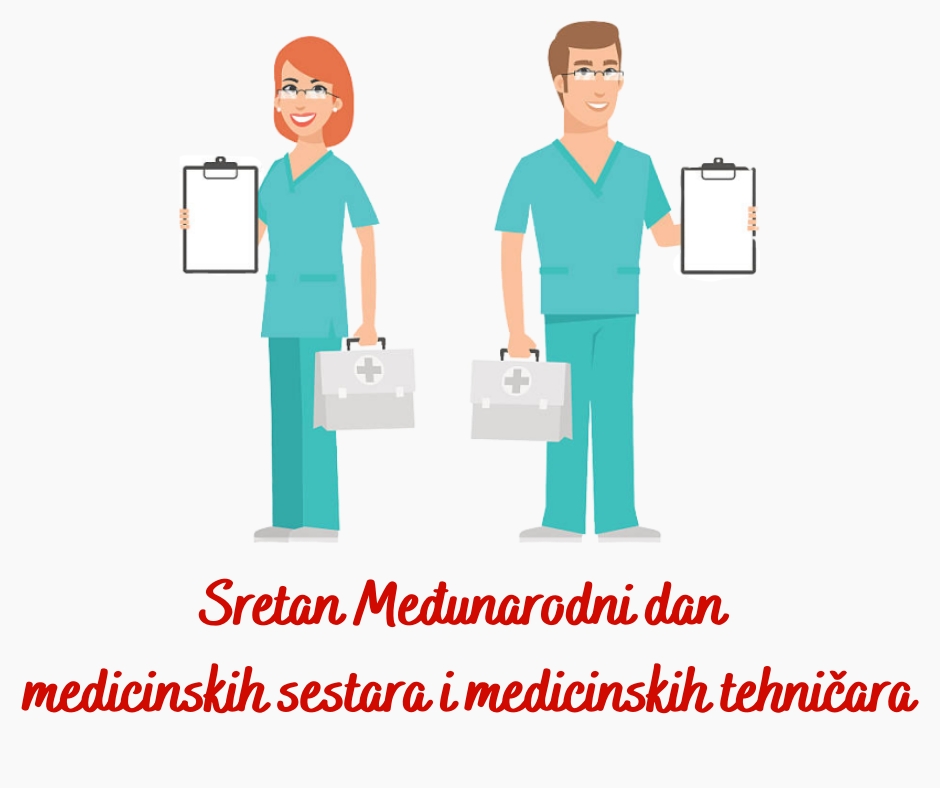
What is your message for the European Union right now?
Follow Vojko on Twitter: @Obi_Rijecki
Federico Poppi, Local councillor, Castelvetro Di Modena, Italy
(contribution published on 20 March 2020)
How are you dealing with the COVID-19 pandemic?
In Castelvetro, a small town near Modena, we have organised (together with voluntary associations) home deliveries of groceries and medicines for old, alone or weak people.
Besides this, we have also created a toll free number with teachers who are not working at the moment, to help citizens and answer all their questions about the coronavirus.
Finally, we have organized a fundraiser to be able to allocate to home care in the area some useful medical equipment in order to fight the coronavirus
What is your message for the European Union right now?
Heike Raab, State Secretary, Representative of the Land of Rhineland-Palatinate to the Federal Government, with Responsibility for Europe, the Media and Digital Affairs, and PES Group member
(contribution published on 7 April 2020)
How are you dealing with the COVID-19 pandemic?
Cross-border patient care
The hospitals in the French region of Grand Est can no longer treat all the coronavirus patients who need intensive care. German hospitals in the border region have therefore decided to take some patients in. Rhineland-Palatinate has offered 11 intensive care places in its hospitals, six of them being already occupied.
Rheinland-Pfalz hilft den französischen Freunden in dieser Notsituation: Die #RLP-Krankenhäuser der Grenzregion übernehmen Intensivpatienten nach ihren Möglichkeiten. #coronavirus #COVID19 pic.twitter.com/vAqozpuI2g
— Soziales_RLP (@Soziales_RLP) March 22, 2020
Wir brauchen wieder offene Grenzen! @HeikeRaab, Vorsitzende Europaministerkonferenz: Für uns in #Europa ist #COVID19 eine große Herausforderung. Wir wollen Infektionsrisiko einschränken, aber auch an die Europäischen Werten wie der Freizügigkeit festhalten. #Europatag #Corona pic.twitter.com/X5Saei4u4S
— Landesregierung Rheinland-Pfalz (@rlpNews) May 5, 2020
Promoting neighbourhood networks
Our state government also supports local authorities in setting up contact points and telephone lines for people who, because of their age or their health condition, belong to the coronavirus risk groups.
The SPD Minister-President of Rhineland-Palatinate, Maly Dreyer, has underlined since the beginning of the crisis that ‟social distance does not mean social coldness”. We aim at supporting the concept of ‟living together” as best as we can, also with the help of neighbourhood networks. For the expansion or the development of these networks, the Ministry of Social Affairs has initially provided EUR 360,000 euros as a support for districts and cities. Information on the contact points in the municipalities can be found here.
In #RLP erleben wir eine Welle der #Solidarität. Neben Angeboten der Nachbarschaftshilfe gibt es Unterstützungsangebote, z.B. für Fieberambulanzen oder Hotlines oder Hilfe bei der Ernte. Malu #Dreyer: Wir halten zusammen, auch in einer schwierigen Lage. #COVID2019 #Corona pic.twitter.com/F45R4yu5e5
— Landesregierung Rheinland-Pfalz (@rlpNews) March 25, 2020
Support for self-organized civic projects of neighbourhood aid in the coronavirus pandemic
In addition to the established structures of neighbourhood aid and of volunteer support funded by the state government, new help offers and platforms from municipalities, companies, student initiatives and committed citizens are currently appearing in many places. These offers are very important in order to support citizens affected by the current situation, especially senior citizens as well as sick and quarantined people, both with shopping services and psychosocial offers.These projects are funded once, in the form of a reimbursement of uncovered expenses for voluntary activities or initiatives (material expenses e.g. for travel expenses, the purchase of shopping boxes, organizational expenses, etc.), with up to 90% of the expected total expenditure, and a maximum of EUR 500. Further information is available here.
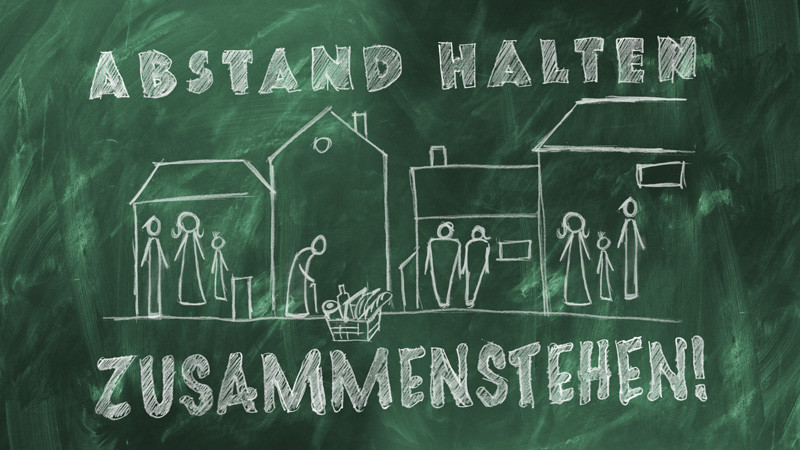
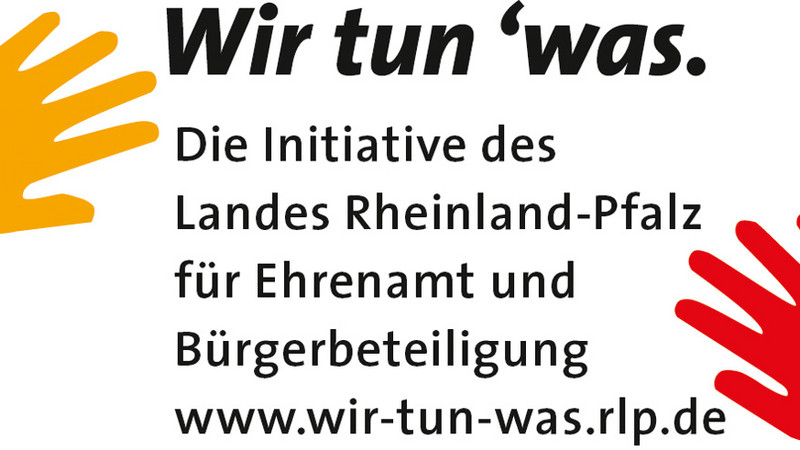
Follow Heike on Twitter @HeikeRaab.
Johanna Rolland, Mayor of Nantes, France
(contribution published on 26 March 2020)
How are you dealing with the COVID-19 pandemic?
Isolated people, single-parent families, elderly people ... After several days of confinement, the most vulnerable can find themselves in very difficult situations, both psychologically and financially. This is why the City of Nantes has taken a series of concrete measures:
- Services for the elderly
The elderly residing in nursing homes are among the most vulnerable to the Coronavirus. The City has equipped its six nursing homes with a video conference system so that the most vulnerable seniors can keep in touch with their loved ones in an easy way despite the confinement. Elderly people who are living on their own may find themselves facing an even greater level of isolation. The municipal service for the delivery of home meals (named O’menu) is maintained and made available to anyone who expresses the need for it. In addition, a series of local associations speak with the elderly on the phone either to have a conversation with them or to answer any particular concerns.
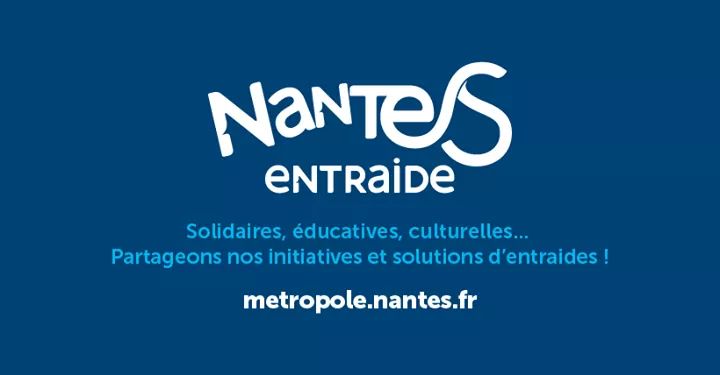
- Financial assistance
With the confinement and cessation of many activities, several small businesses risk finding themselves in a precarious situation in the coming months. For this reason, the Communal Social Action Center (CCAS) remains accessible by telephone or via the eservices platform to provide advice to them. It is possible either to make a specific appointment or just to chat randomly with a social worker to take stock of your situation.
- Psychological help for parents and single people
Confinement can be difficult for many people in different ways. People on their own will face loneliness while others will have to take care of their children at the same time as teleworking and/or juggling their activities. This is why psychologists and professional educators from the associations ‟Les pâtes au beurre”or ‟École des parents” offer an attentive ear and support to families.
- Food aid
In this period of confinement, social emergency and food aid remain priorities for the fragile and people at risk so that a humanitarian crisis is not added to the health crisis. To guarantee food aid, the City of Nantes coordinates and supports the associations involved in this field (such as ‟les Restos du Coeur") by setting up additional locations for distribution. In addition, food parcels are given to the ones in need. Municipal social emergency structures remain open. The City provides premises and has made a call for volunteers among its agents so that the distribution of meals and food parcels happens in compliance with the health standards in force.
What is your message for the European Union right now?
Follow Johanna on Twitter @Johanna_Rolland.
Enrico Rossi, President of Tuscany Region, Italy, and PES Group Vice-President
(contribution published on 4 May 2020)
How are you dealing with the COVID-19 pandemic?
Since the beginning of the pandemic, the Tuscany Region has taken a number of solidarity initiatives in the social and welfare sector. The Covid-19 health emergency has led to a general rediscovery, in the field of health but not only, of the sense of community and of the importance of territorial services. We have been working since day one so that, after the epidemic, we will stay close to the local level and to people in their homes as this the key to keeping our region in balance.
Economic measures: support for businesses and employment
To address the economic emergency triggered by the coronavirus pandemic and by the forced closing of activities to reduce the risk of contagion, the Tuscany Region has immediately put a series of measures into place. Amongst these we find the support of businesses and freelancers' credits and liquidities (in the form of a guarantee for 20 million euros, widening the existing availability by a third), additional unemployment benefits without any cost shield by the workers by agreeing with the banking institutions for a more advanced arrangement in comparison to national measures, supporting farms, floriculture as well as fisheries, and the simplification and acceleration of public investment (infrastructure, health and soil protection). All these measures will be very important to support the recovery when the health emergency will be behind us. Moreover, the Region has anticipated the payments of enterprises, authorizing the offices to proceed with the work already done and with the services supplied.
Additional protection measures against contagion for the population
At the beginning of April, by order of the President, the obligation to wear a mask (of surgical type) was introduced on the regional territory for all citizens when they go outside their homes. This was meant as a primary prevention tool and in preparation for the so-called Phase 2. The obligation came into force after 8.5 million masks were freely distributed by the municipalities to homes. Subsequently, the distribution took place through pharmacies and via the large food distribution chain. Today, the system for distributing free masks has been bettered by using the network of over a thousand Tuscan pharmacies. On presentation of a health card, all citizens over 6 years old can collect a pack of five masks at a time (for a maximum of 30 masks per month).
The need of the population to have masks (in addition to the needs of the health workers and of the workers) is also ensured thanks to the so-called ‟Tuscan protection district”. It was put into place during the health emergency and is now able to produce, per day, a million masks made of non-woven fabric (Tuscany 1, Made in Tuscany, tested by the University of Florence).
In April alone, over 28 million masks were distributed free of charge (outside the supplies for health professionals). Since May, pharmacies have been stocked up with 1.8 million masks per day.
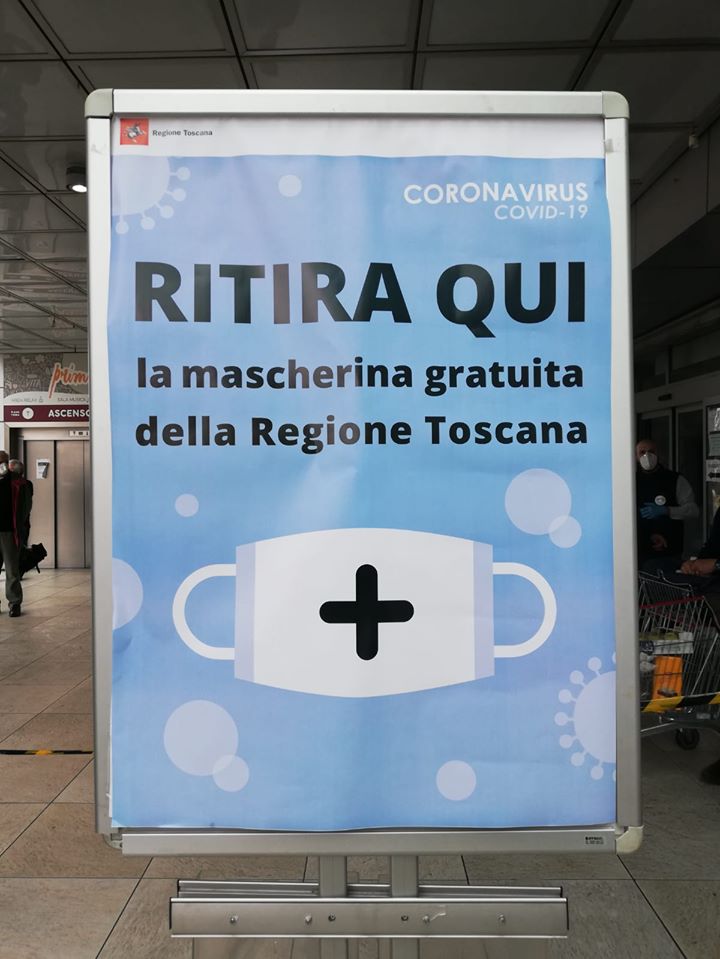
Measures for the elderly and the disabled
Right from the beginning, we took care of the weaker ones. The Tuscany Region invested 3 million euros in order to activate a service of home delivery of basic necessities (food, personal and household hygiene, medicines) to support citizens over 70 years old who are in conditions of fragility. This was done thanks to a protocol of understanding signed between the Region of Tuscany, ANCI (the association of Italian Municipalities) and the trade unions (in collaboration with voluntary associations) with the activation of a single regional free telephone number. The project also extends to people with severe disabilities and chronic diseases or with congenital or acquired immune-depression. This is an opportunity and a right for all Tuscans who might need it.
Combating violence against women
The virus does not, unfortunately, stop violence against women who, confined between the walls of their homes, risk being even more alone to face violence. For this reason, the Region, in compliance with the rules to limit the spread of the virus, has decided to ensure the continuity of the listening service through a more widespread network of telephone assistance. We also relaunched the dissemination campaign of the national number "antiviolenza", i.e. 1522.
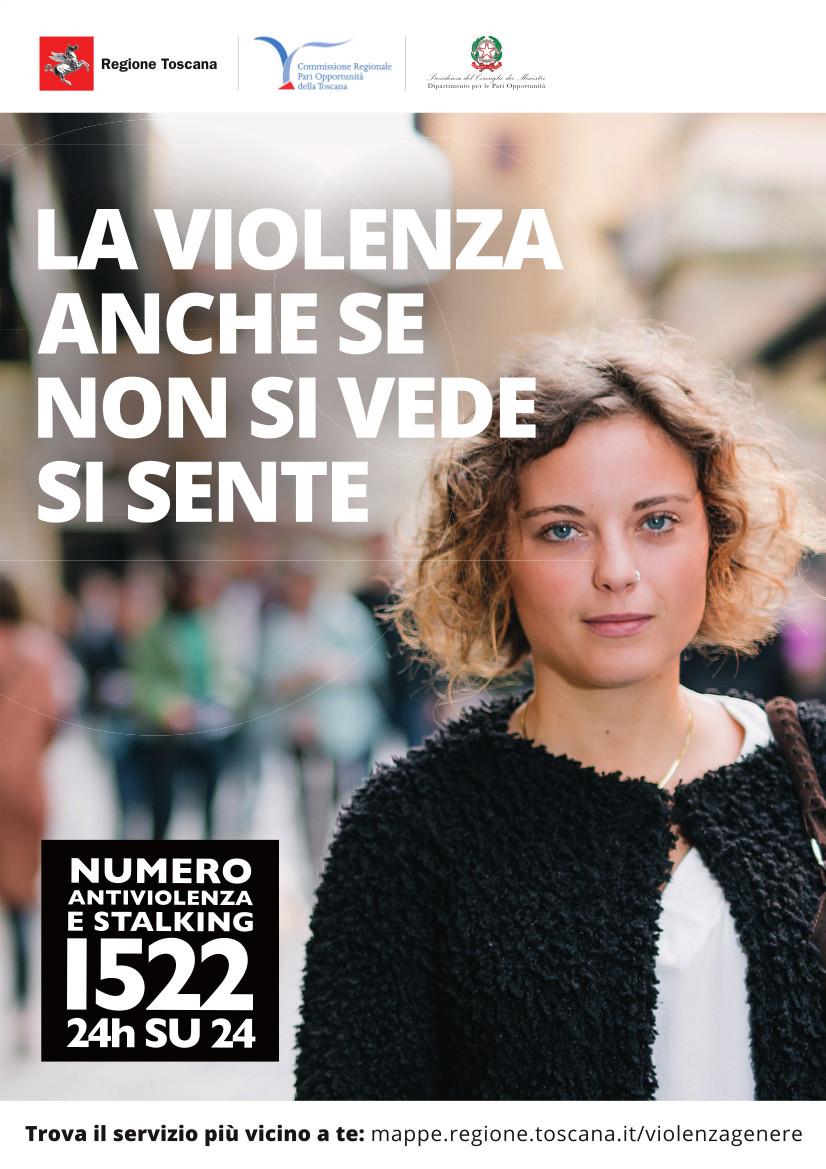
Counselling
The Tuscany Region, together with the Civil Protection, has activated a free service open every day to provide, with available psychologists/psychotherapists, some psychological support to the population in this particularly critical time.
Education 0-6
During this extraordinary and difficult period, special attention must be paid to the youngest children who can be seriously at risk from being deprived of their school education. To help counteract the serious negative effects on children, the Tuscany Region promotes ‟Education 0-6 must not stop”, a project dedicated to ensuring the continuity of education and education for 0 to 6 years old, which provides for:
- A vademecum to cultivate and promote an educational continuity (and therefore relationships) that offers suggestions for initiatives and activities to be proposed to children in remote mode.
- An adjustment of the project ‟Read: Strong! Reading aloud makes the intelligence grow” to the extraordinary circumstances of this period by making audio and video readings available for children and teenagers in this period of closing of schools and nurseries.
- The exploitation of best practices of local childcare services by making them available for other areas.
- Distance training activities for educators and teachers focused on educational methods that can be activated in this period of closing of educational services and schools.
- The adaptation of the day nursery of the Tuscany Region to the emergency Covid-19: from May until the end of July 2020, nurseries will be able to offer to children educational activities in alternative to ordinary actions that require a physical presence. These activities can be financed thanks to the contributions provided by the call for tender, which is currently active for the educational year 2019/2020.
The Meyer Paediatric Hospital has also made stories and poems for children available on a website.
Culture
We have tried to support culture, which plays a fundamental role at a time when social distancing leads us to lose contact with others. The Tuscany Region decided to put together on a website the many existing cultural realities in order to welcome the various initiatives coming from those who have made themselves available with a great sense of generosity and of self-denial.
Voluntary Sector
After the alarm signal launched by associations and by the Tuscan non-profit world, Tuscany, together with other Italian regions, has asked the Government to the facilitated access to credit also for the no-profit sector, including the national guarantee fund, the suspension of loans, tax credits and facilities on sanitation costs.
What is your message for the European Union right now?
Follow Enrico on Twitter @rossipresidente.
***Photo credits: Enrico Rossi on Facebook.
Christophe Rouillon, Mayor of Coulaines, France, and PES Group President
(contribution published on 23 April 2020)
How are you dealing with the COVID-19 pandemic?
For a month now, a municipal crisis unit (composed of five elected officials and of five heads of service) meets three times a week.
Together with 50% of our social housing, we have put into place strict procedures and measures of solidarity in order to avoid the arrival of the pandemic and to help residents in apartments who are the most confined.
Our guideline is to ensure the continuity of local public services by putting our agents in teleworking and by setting up a staff turnover in each department.

We guarantee an active and targeted communication with our citizens by having elected representatives distribute a letter to the entire population and by using the city's electronic billboards. We also regularly publish information and messages of awareness on social networks and on our website.
We have identified isolated or vulnerable people; this has allowed the setting up of medicine deliveries with pharmacists and of grocery deliveries with a supermarket of Coulaines.
[#continuitéduservicepublic]
— Ville de Coulaines (@Coulaines) April 17, 2020
Depuis le début du confinement le CCAS et les agents de @Coulaines mettent tout en œuvre pour proposer aux coulainais isolés ou en difficultés des livraisons de courses à domicile
Contactez le CCAS au 02 43 74 35 35@OuestFrance72 @lemainelibre pic.twitter.com/tnpVMLWwQm
We maintain numerous services to the population by ensuring, for example, the maintenance of green spaces in order to guarantee the cleanliness and healthiness of the city. The solidarity grocery store has been reorganized into a ‟Drive-in” mode.
In order to support local trade and production, we have maintained the Saturday morning market by controlling and filtering entries with security agents coming from the private sector.
The well-being of the younger ones is at the heart of our concerns. The reception of the children of medical team members is ensured by the schools. Remote activities are proposed by the music school or by the sports youth sections of Coulaines.
Whilst preparing actively for the deconfinement as of Monday the 11th of May, nursery staff members, animators of recreation centres and school catering staff members share fun and practical information on social networks (for example # 1jour1idée).
To combat domestic violence and intra-family violence against children, we popularize the emergency numbers 3919 and 119.
Fortunately, to date, no city inhabitant has been hospitalized nor has died due to the COVID-19. We cross our fingers, remain true to our values and stand strong!
What is your message for the European Union right now?
Follow Christophe on Twitter @ch_rouillon.
Anna Maria Sabatini, City Councillor of San Costanzo, Italy
(contribution published on 27 March 2020)
How are you dealing with the COVID-19 pandemic?
San Costanzo is a small town in the Marche Region, in the Province of Pesaro (Urbino). Our Province was one of the hardest hit in Italy.
In my town, the Administration immediately tried to protect the weaker citizens. As I was not working these days because I am a teacher, I immediately made myself available to help the municipal offices, the Mayor and the Vice-Mayor.
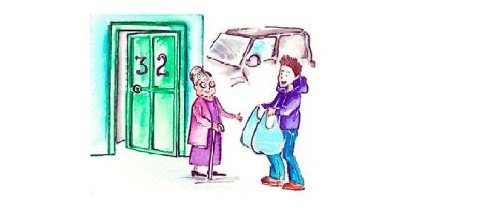
I have detailed below a list of all the initiatives we have put into place to contain the spread of the virus and to protect our citizens of all ages:
- respecting all the interdictions and rules imposed by national and regional law;
- disseminating best practices, information and news via the social networks and the official institutional channels of the Municipality;
- recording and publishing a video in our local dialect to explain good hygiene practices;
- home delivering groceries to elderlies and to people alone or sick, via a municipal team or the Italian Red Cross staff;
- postponing municipal tax payments;
- offering a free telephone support service or psychological counselling;
- online teaching (which was immediately put into place by our primary and secondary school teachers);
- giving access to all commercial activities and pharmacies in our city for ordering groceries and medicines either by home delivery or by telephone booking;
- making available outside the municipal building some paper copies of the form issued by the government for the sole circulation of cars and people in order to go to work or to buy basic food supplies;
- giving access to municipal services (by appointment only);
- extending until the 15th of June 2020 the validity of certificates, concessions and authorizations due to expire between the 31st of January 2020 and the 15th of April 2020;
- ensuring a constant presence of the municipal police in the streets;
- hindering the access to cemeteries by closing them;
- organising nearly every day book readings for children and teenagers with the staff of the Municipality's library (personally I do a children's book reading every Friday).
On a more general and symbolic level, many families have hung a white sheet from their window with the words ‟andrà tutto bene” (‟everything will be fine”) and a rainbow on it.
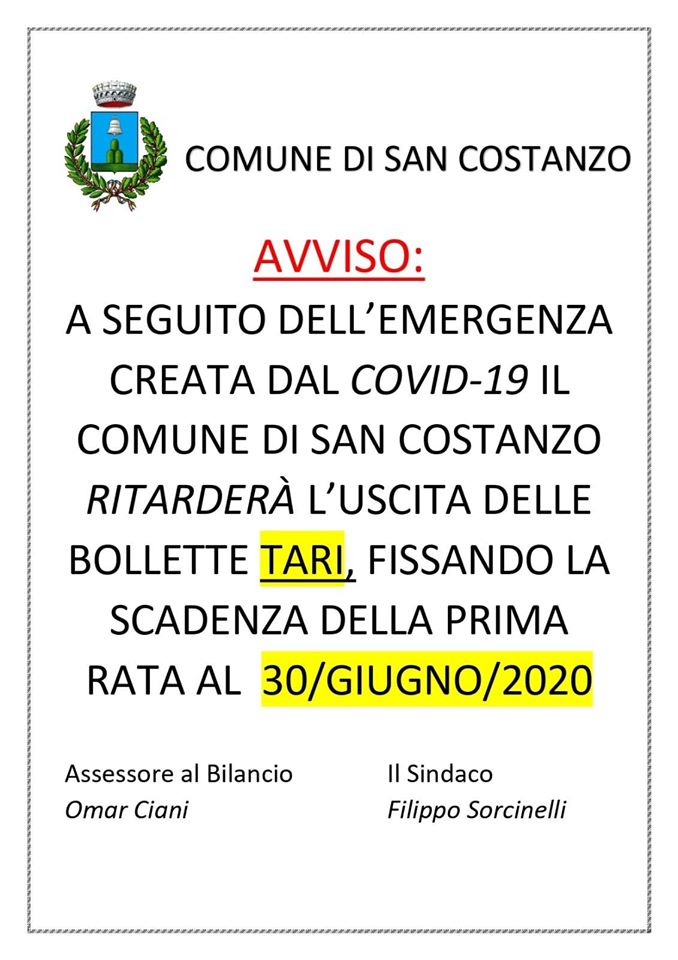
What is your message for the European Union right now?
Lidia Sanz Molina, Councillor of Soria, Spain
(contribution published on 7 April 2020)
How are you dealing with the COVID-19 pandemic?
The situation that we are living because of COVID-19 is leading us all to adapt in order to carry out our jobs in a different and innovative way. However, we must in a way be thankful because it is in these hard situations where the value of a community is proved. The people of Soria have proved that in the last weeks through a series of solidary initiatives. We have thought that they deserve acknowledgement and we want to compile them to give them visibility and promote them, as well as show them our support. From the city’s administration we are looking for the citizens’ actions that are being carried out and their needs, to then asses in which capacity we can help.
Recuerda que el Ayuntamiento de Soria sigue abierto los 7 días de la semana en el 010. Gestiones, consultas, dudas... atención social y psicológica. #estevirusloparamosunidos #quédateencasa pic.twitter.com/eUZvbbZtWL
— Ayuntamiento de Soria (@Ayto_Soria) April 12, 2020
We have created an online platform called Participación Solidaria (Solidary Participation) to which our citizens can add their contributions and initiatives in order to make the quarantine easier for the people of Soria. Taking part in these activities and solidarity initiatives promotes the creation of a democratic culture and benefits the majority of our population, and favours the consolidation of social cohesion. With these initiatives we also want to show our citizens that we are close to them and we acknowledge their efforts in this hard time. To contribute, all they have to do is fill the form on our website and we then share their initiatives.
Another initiative launched from the city hall has been to ask children in the last years of primary school to write positive and hopeful letters for the patients of COVID-19. This way, those who are in our hospitals will receive different ways of support and the children will be able to practice the writing skills they learn at school.
Finally, we have launched a programme to help children in precarious situations that used to benefit from lunch vouchers at their schools. We have started the creation of food baskets together with the municipal market. The families receive a text message when their baskets are ready and they come and collect them from the city hall in different time slots to avoid conglomerations. Our social workers have collected data from these families so that the baskets meet the dietary restrictions of the families.
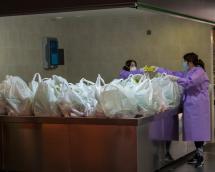
What is your message for the European Union right now?
Mihael Slunjski, Member of the Youth Council of Ivanec, Croatia
(contribution published on 14 May 2020)
How are you dealing with the COVID-19 pandemic?
The crisis caused by the COVID-19 virus hit us quickly and we were unprepared for it. I come from the small town of Ivanec in the north of Croatia where I am a member of the City's Youth Council. As soon as the crisis started, I immediately drafted and proposed (in cooperation with another city councillor) a series of measures to help citizens and the economy as follow:
- suspend all planned expenses that are not necessary for regular basic business;
- reduce salaries to a minimum for all employees in the city administration in the next three months and abolish councillors' fees in that period;
- exempt citizens from paying kindergarten fees for the next three months;
- completely exempt all tenants business premises (owned by the City in the sectors of activities that have been temporarily suspended by state order) from paying the lease of business premises and of public areas from the day the decision enters into force until the day of revocation;
- all legal and natural person whose work has been suspended by a state decision shall be completely exempt from payment or refunded benefits for: a) utility fee b) overheads charged by the city utility company Ivkom.
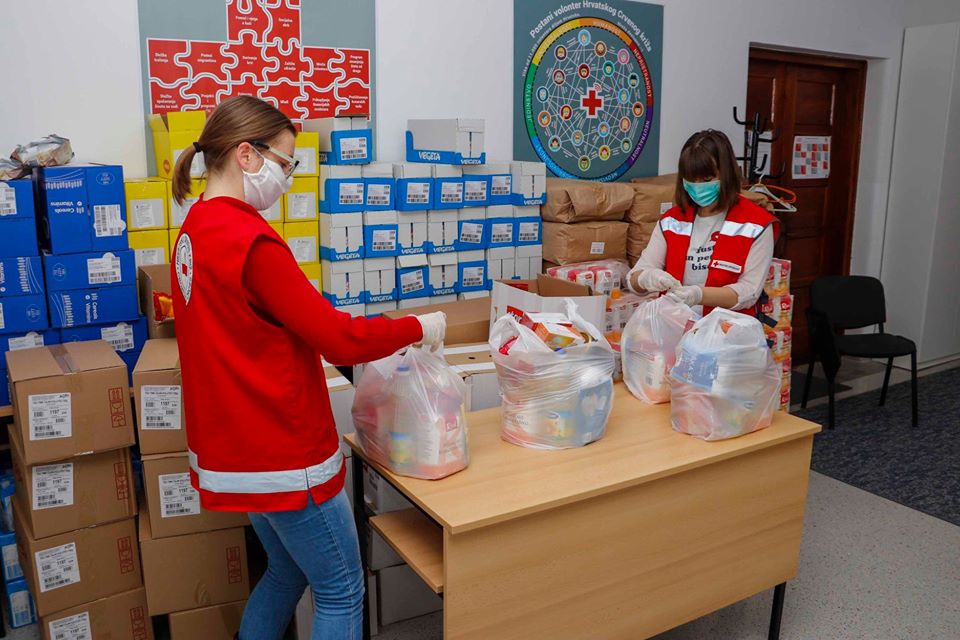
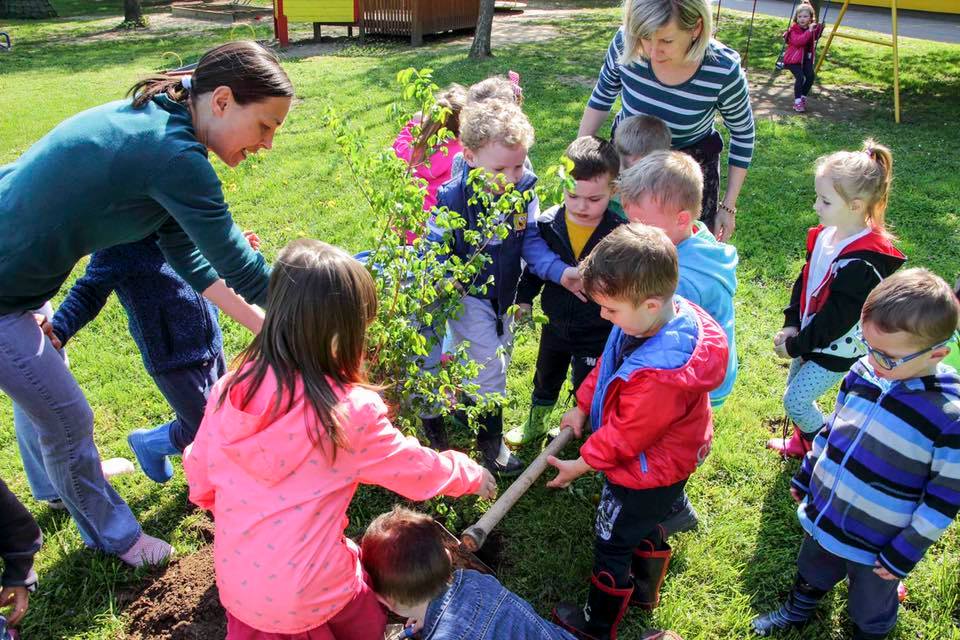
What is your message for the European Union right now?
***Photo credits: Grad Ivanec on Facebook.
Kata Tüttő, Deputy Mayor of Budapest, Hungary, and PES Group Vice-President
(contribution published on 21 April 2020)
How are you dealing with the COVID-19 pandemic?
As a municipal government, we need to make sure in the first place that all our public services continue to run (such as water and electricity supplies, waste management, central heating and of course among many other things public transport). We are implementing measures to protect the people who are working in these public services, ranging from bus and tram drivers to engineers who run the waste management of energy plants.
Given the government's hesitation towards testing, we (as a city) decided to do Covid19 tests in the sector of elderly care. We have also purchased masks and other types of equipment needed for protection. We will also introduce mandatory face masks/textiles in public transports.
We follow what other European cities are doing. We use our networks, learn from them and also share our experience with them.
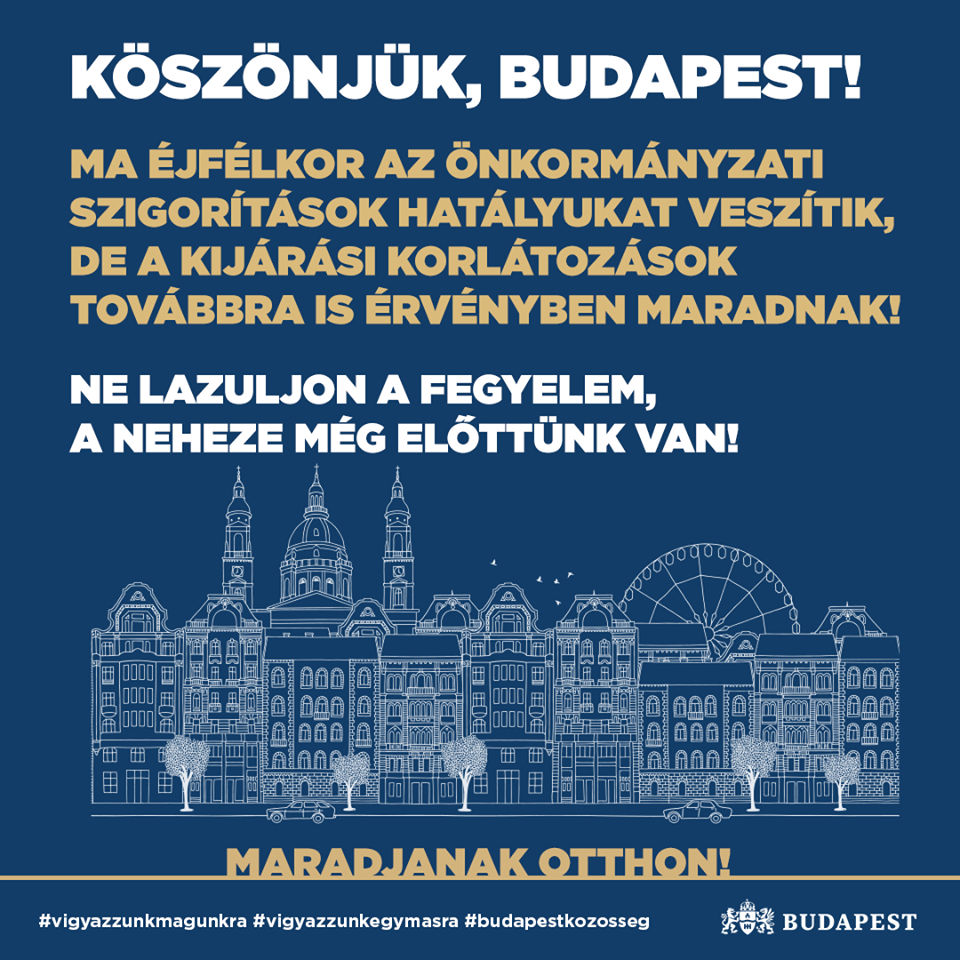
A designated time slot has been set so that elderly people can go shopping. Local municipalities are managing volunteers to help with shopping, buy medicine or manage bills.
As a city, we are not in charge of hospitals. Social care is mostly managed by the districts who are supervising volunteers and take care of increasing social budgets.
Schools and nurseries are closed, but we have open kitchens in every part of Budapest to provide food for those in need (and for children amongst them especially).
We have launched a dedicated website. It gives regular up-to-date information about the city's measures (to prevent the spread of the virus) and informs users about solidarity measures.
Our aim is that nobody in the city-owned utility companies loses his/her job due to the crisis. We also continue our dialogue with social partners and with other stakeholders; a forum that was set up just a few weeks before the crisis started.
#Ivanec : GRAD IVANEC Otvoren Program mjera za poticanje rješavanja stambenog pitanja na području grada Ivanca ... https://t.co/q1KHuaJXS6 #vijesti #hrvatska #croatian pic.twitter.com/mQVPEaf32t
— Lokalna Hrvatska (@lokalnahrvatska) April 21, 2020
What is your message for the European Union right now?
Follow Kata on Twitter @KTutto.
Ana Umbelino, Councillor of the city of Torres Vedras, Portugal
(contribution published on 11 May 2020)
How are you dealing with the COVID-19 pandemic?
Here, we find a brief description of the support measures that are ongoing in the municipality of Torres Vedras and are directed to families as well as social economy organisations and enterprises.

COVID-19 Municipal Extraordinary Support Programme
Besides several measures put in place on the ground during the emergency state, Torres Vedras City Council is currently implementing an Extraordinary Municipal Support Programme in the context of the COVID-19 pandemic. It consists of 39 temporary measures aimed to support families, social economy organisations and enterprises, considering the constraints and difficulties resulting from the crisis and the urgent need to restore their functioning in the context of “the new normal”.
In addition to giving up to about EUR 2.4 million in revenue by alleviating the tax burden of families, social economy organisations and enterprises, the municipality will allocate EUR 1.5 million to the implementation of a set of integrated measures considering their systemic effects. The main goal is to get back to normal families, social economy organisations and companies, overcoming the negative effects of the pandemic and increasing resilience and creativity, in line with the principles and values of social and ecological sustainability and territorial cohesion.
FAMILIES
Support for social and housing emergencies
- Exemption from the payment of rents for residents in social housing, between March 1 and June 30, 2020.
- Extension, until the end of 2020, of the Rental Support Programme (Programa de Apoio ao Rendimento) to the current beneficiaries and extension of the deadline for new applications to be in force in 2021.
- Direct financial support for housing emergencies, until September 30, 2020.
- Direct financial support to address situations of proven social emergency, guaranteeing evaluation and monitoring, in partnership with several local institutions, until September 30, 2020.
- Expansion of the number of beneficiaries of the Abem Programme: Solidary Medicines Network which allows the access to free medicines to citizens with lower incomes.
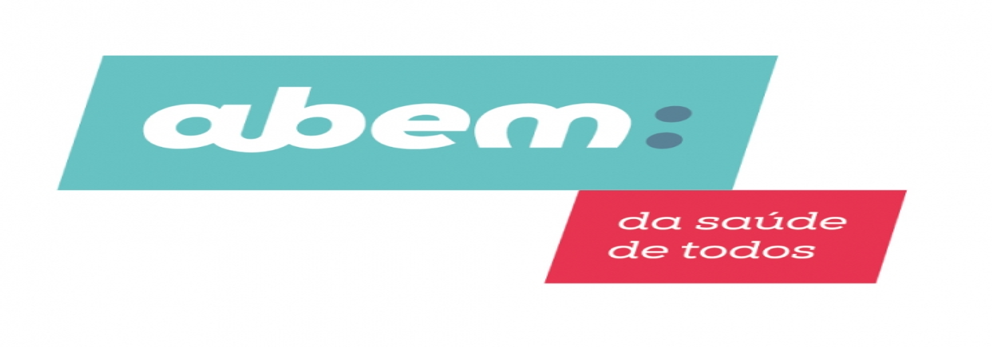
- Allocation of vouchers for the purchase of food and other essential goods in local proximity stores, until 30 September 2020.
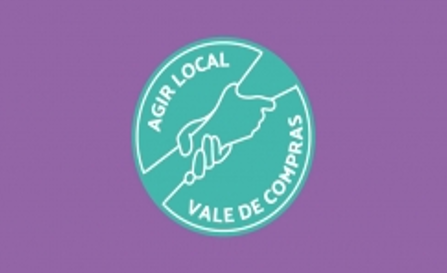
- Vouchers equivalent to euros given to low income families to purchase essential goods at local proximity stores
- Provision of meals to underprivileged students, of all grades, until the reopening of schools.
- Provision of computer equipment and Internet access to students who do not have these tools through the creation of a municipal resources pool.
- Creation of a technological resource pool with 850 tablets and computers and 500 internet access devices.
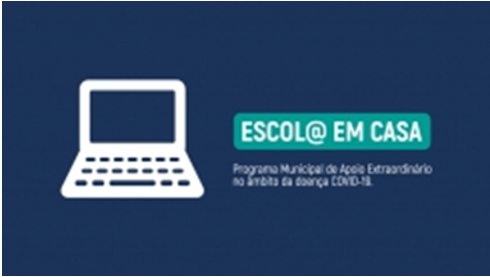
- Maintenance of payment of fees for professionals hired for the development of educational and sports activities.
Taxes, fees and tax benefits
- In 2021, the reduction of the IMI rate (Property Tax) by 0.05%, for urban buildings destined exclusively for own and permanent housing, establishing the rate at 0.35% of the property's value (it was previously set at 0.40%);
- Exemption from paying surface parking in the city until June 30, 2020.
- 50% reduction, until the end of 2020, of the amount applied on inspections for the purposes of determining tax benefits in constructions located in Urban Rehabilitation Areas.
Water supply, sanitation and waste
- Our first step is to have a 30% reduction in the variable tariff applicable in water supply services, from April 1 to June 30, 2020.
- Our second step is to have a 50% reduction in the variable tariffs applicable on water supply services and have 50% reduction to sanitation for domestic consumers with a Social Rate, from April 1 to June 30, 2020.
- 30% reduction of the variable tariff on solid urban waste collection services, from April 1 to June 30, 2020.
- Elimination of fees associated with the collection of certain types of non-domestic waste (such as construction and demolition waste), from April 1 to June 30, 2020.
SOCIAL ECONOMY ORGANISATIONS
Water supply, sanitation and waste
- Exemption, from April 1 to June 30, 2020, of the payment of the fixed tariff on water supply, wastewater sanitation and collection of solid urban waste services for entities of recognised public utility.
Support
- Payment between 50% to 80% of all service contracts related to education, namely: preparation of school meals and curricular enrichment activities and family support services, referring to the period of compulsory closure of schools, in order to guarantee the reimbursement of fixed costs and maintenance of employment.

- The products collected through the municipal network of organic vegetable school gardens are given to civil society organisations that support families with lower incomes
- Annual support for creative and cultural organisations increased by 25% taking into account the value of the 2019 grants.
- Extraordinary financial support to ensure the proper and regular functioning of services and responses of social economy organisations, in situations of proven reduction in revenue or marked increase in activity, until September 30, 2020.
- Increase of 10% in support given to sports associations within the scope of support programmes for physical activity and enhancement of healthy life styles.
- Exemption from payment of use of municipal sports facilities by sports associations, until 30 June 2020.
- Implementation of a support programme for the enhancement of artistic creation in contemporary arts, called Cultural Emergency, which provides creators and creative organisations the required conditions and financing resources for the production and dissemination of digital contents.
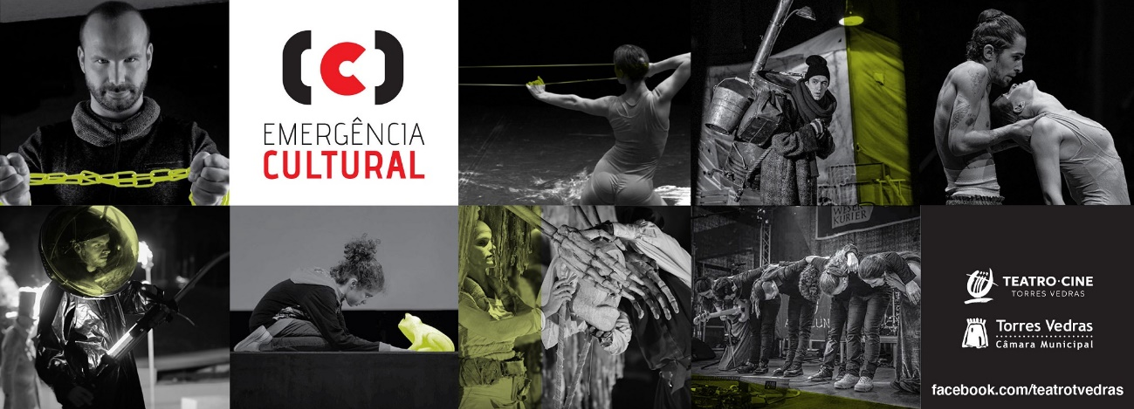
- Rescheduling of all shows and cultural activities booked for the period between March 1 and June 30, with immediate payment of 50% of the contract value.
- Maintenance of the municipality's cultural activity, through the issuance of its own contents with the participation of local cultural agents, disseminated on the social networks of municipal cultural institutions and services.
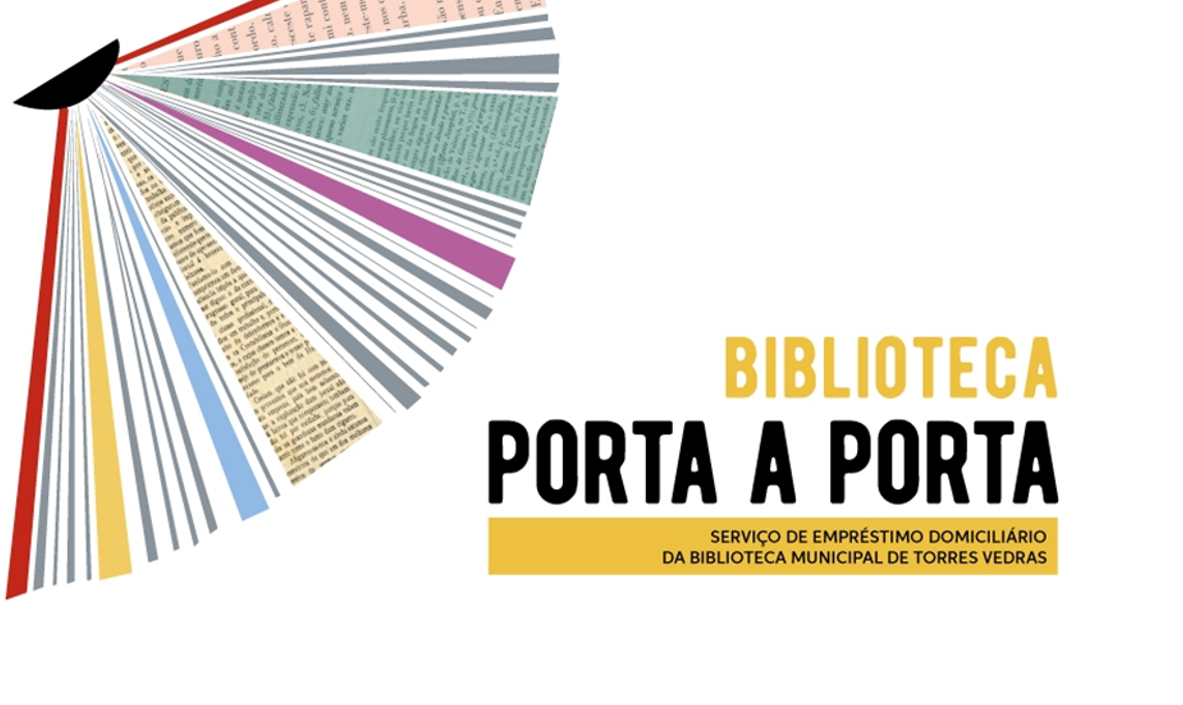
Enterprises
Incentives
- Creation of a system of incentives to SMEs through the reallocation of funds from the Portugal 2020 programme, that were not committed.
- Maintenance of public building construction works, in order to keep the required levels of confidence in the architecture, engineering and building sectors.
- Provision of various services related to urban processes in digital media.
- Creation of a job offer / demand platform focusing on the agricultural sector.
Fees and taxes
- Exemption from surcharges for taxable persons whose turnover in 2020 does not exceed EUR150,000.
- 30% reduction in the fixed tariff on water supply and wastewater sanitation services, from April 1 to June 30.
- 30% reduction of the fixed tariff on services for the collection of solid urban waste, from April 1 to June 30.
- Exemption from the payment of rent for commercial establishments in municipal spaces, where economic activity has ceased or suffered a significant contraction.
- Exemption from the payment of rent, to be applied from April 1 to June 30, 2020, to operators of the Municipal Market and Supplier Market, who, following Decree No. 2-A / 2020, of March 20, had to suspend their activity.
- 25% reduction of the rent, to be applied from April 1 to June 30, 2020, to the remaining operators of the Municipal Market and Supplier Market.
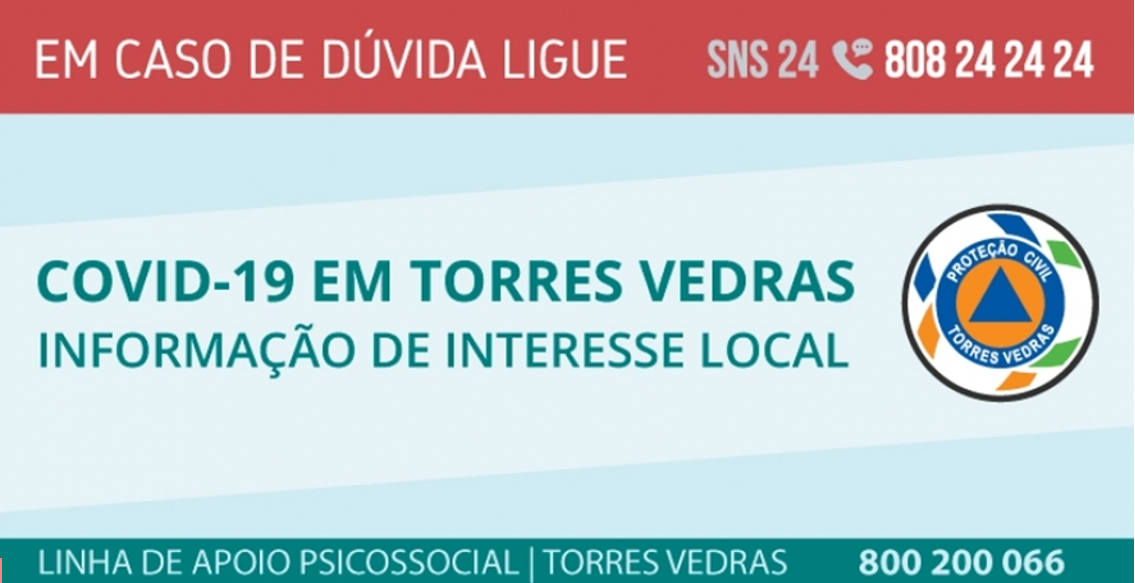
What is your message for the European Union right now?
Rudi Vervoort, Minister-President of the Region of Brussels, Belgium, and PES Group member
(contribution published on 31 March 2020)
How are you dealing with the COVID-19 pandemic?
First of all, the Region of Brussels-Capital has the duty, as an administrative police authority, to enforce and apply containment and precautionary measures. Health is of course the priority in such circumstances. The Regional Security Council (CORES) applies and translates into action all the measures decided by the National Security Council (NSC) to protect the whole population against the COVID-19 spread (in public spaces, public transports, etc.). Our public administration also had to adapt in order to maintain the provision of essential public services, including online ones.
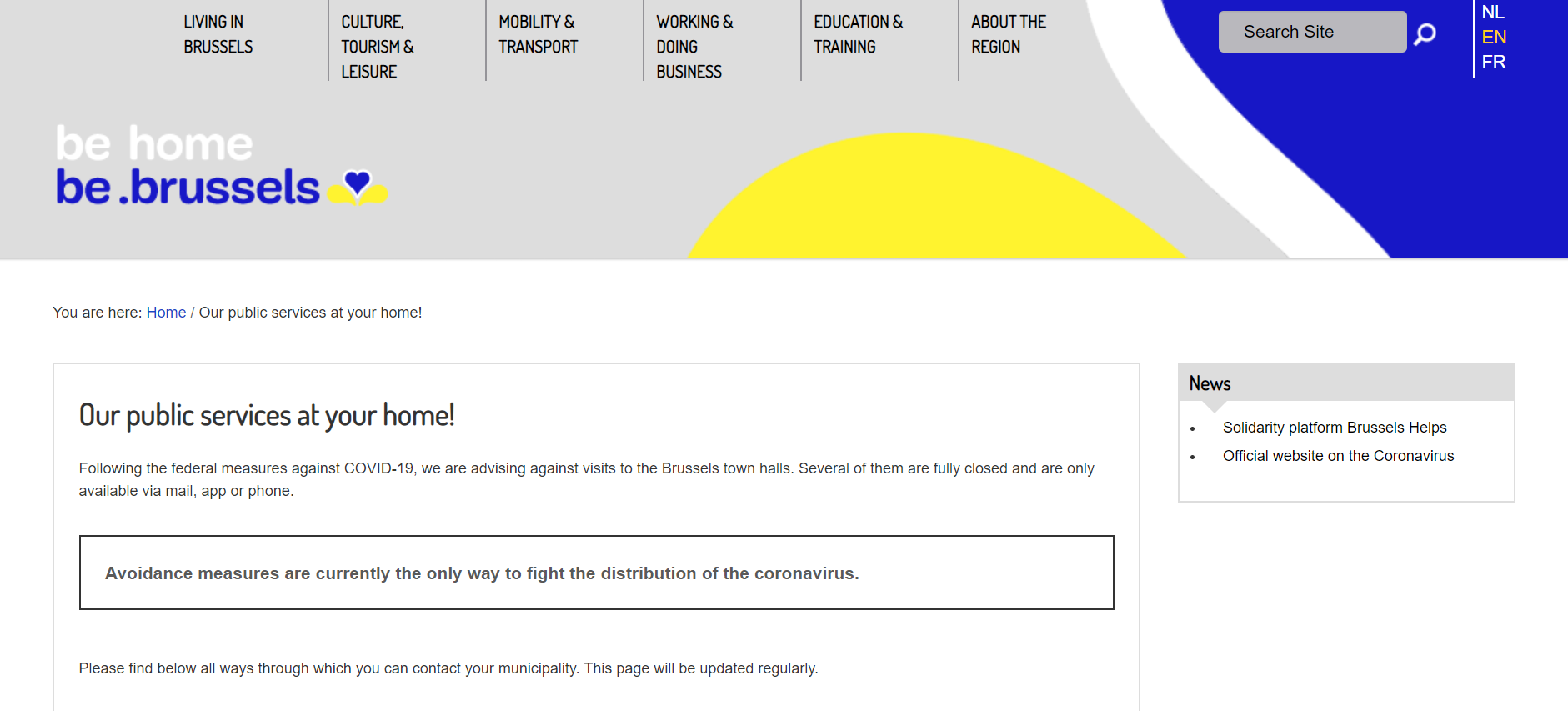
In addition to federal measures in the area of health care, the Region released a €30 million fund to support operators who are on this crisis' front line and to help them adapt and continue their activities in difficult and changing conditions. Among these operators, there are of course the hospitals but also the sectors of social action (for migrants and homeless people), senior care and nursing homes, domestic help and support to people with disabilities, etc.
Specific attention is paid to the most vulnerable people such as the homeless ones and the migrants.
The Brussels Region also took unprecedented economic and social measures to counter the impact of COVID-19, costing more than €150m. These include:
- one-off grants for companies in locked down;
- public guarantees for companies’ bank loans;
- low-cost loans for hotels and restaurants;
- accelerated aid grants for hotels, restaurants and firms in the sectors of tourism as well as to firms in the fields of events and culture;
- strengthened technical support to firms in difficulty;
- specific support to firms and workers in adversely affected sectors.
Also, I would like to point out some innovative initiatives:
- The ‟Brussels’ Help” solidarity brings together citizens of Brussels who either need help during the crisis or who voluntarily offer their help to people in need. Organisations that need specific help (for example for making masks or finding a babysitter) can also visit this website, created in consultation with the back office.
- The Brussels Region has supported the creation of a production line of anti-projection masks to be distributed by the regional authorities. 1,500 people from Brussels quickly volunteered to participate in the sewing work at home.
- The police of Brussels uses drones acquired by the Region to broadcast prevention messages at a good distance of people.
In a press release, Nawal Ben Hamou, the Secretary of State for the Region of Brussels-Capital, shared a financial aid initiative to support tenants who have difficulty paying their rent. Because the Coronavirus crisis forces the great majority to stay at home, this generates a loss of income for many Brussels tenants who have modest incomes. A single grant per household for private sector tenants will therefore be allocated semi-automatically by the Region.
#Covid_19 Avec le #brugov nous mettons en place une prime loyer pour soutenir les locataires à revenus modestes qui subissent une perte de revenus et les aider à faire face aux conséquences de la crise sanitaire. CP https://t.co/NnKCI1khIc pic.twitter.com/pelpGATShy
— Nawal Ben Hamou (@nawalbenhamou) April 24, 2020
What is your message for the European Union right now?
Follow Rudi on Twitter @RudiVervoort.
André Viola, President of the Aude Departmental Council, France, and PES Group member
(contribution published on 4 May 2020)
How are you dealing with the COVID-19 pandemic?
I would like to share with you two actions we chose to put in place in my department in order to take part in the fight against the social and economic negative impacts of the COVID-19.
The goal of our first action is to overcome the worsening of the labour shortage the farming community has had to face due to the pandemic and to the confinement measures into force by facilitating jobseekers' accesses to this job offer. The department has decided to launch, a few months in advance, the testing of a scheme allowing beneficiaries of the ‟Active Solidarity Income” (Revenu de solidarité active (RSA) in French) to combine seasonal agricultural employment with their short-term allowance. This way, RSA beneficiaries who will have a seasonal agricultural job during the period going from April to December 2020 (for a maximum number of 300 hours) will have their allocation maintained. This disposition will also be an additional way to support the integration of RSA beneficiaries by helping them to enrol in anf active professional integration process. This derogation device concerns all the RSA beneficiaries of the Aude Department who have open rights and who will sign a work contract.
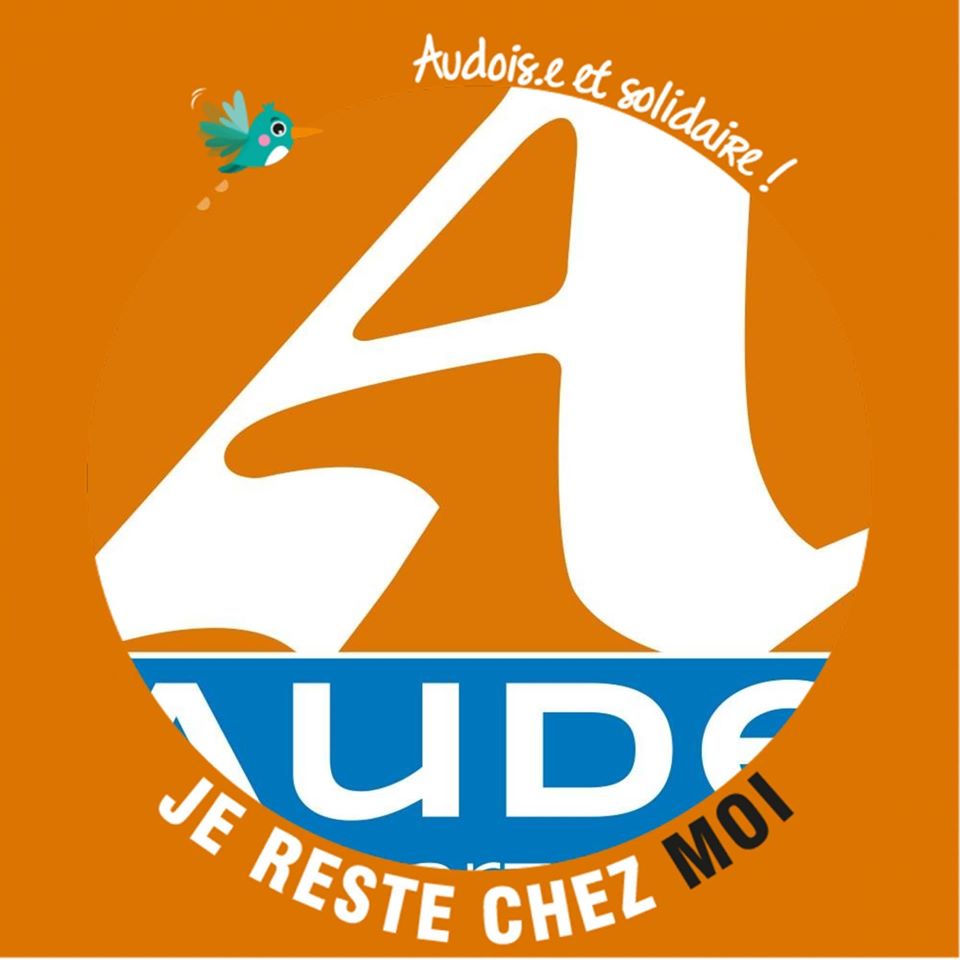
The second action concerns students who are confined to their homes and who are no longer able to go to class. The Aude Department has made IT equipment available for them so they can do their schoolwork online at home. The National Education has put into place distance learning devices to ensure the continuity of teaching despite the confinement of students. It is unfortunately not the same for all families and certain students face material difficulties to follow the work programme recommended by the teachers. A certain number of students do not have adequate IT equipment nor an internet connection.
To remedy this, the Aude Department has decided to lend IT equipment to families who wish and has ordered 4G keys, for a total of 25,000 euros, from the Orange operator to guarantee an internet access for them.
Aude : après le coronavirus, André Viola veut "panser le présent et penser l'avenir" https://t.co/qcPoNuuExE via @lindependant
— Viola Andre (@andreviola11) May 2, 2020
What is your message for the European Union right now?
Follow André on Twitter @andreviola11.
Hannes Weninger, Member of the Lower Austrian state parliament, Austria, and PES Group member
(contribution published on 23 March 2020)
How are you dealing with the COVID-19 pandemic?
- Post-it campaigns in many local SPÖ groups for neighborhood help on post boxes, front doors and via social media.
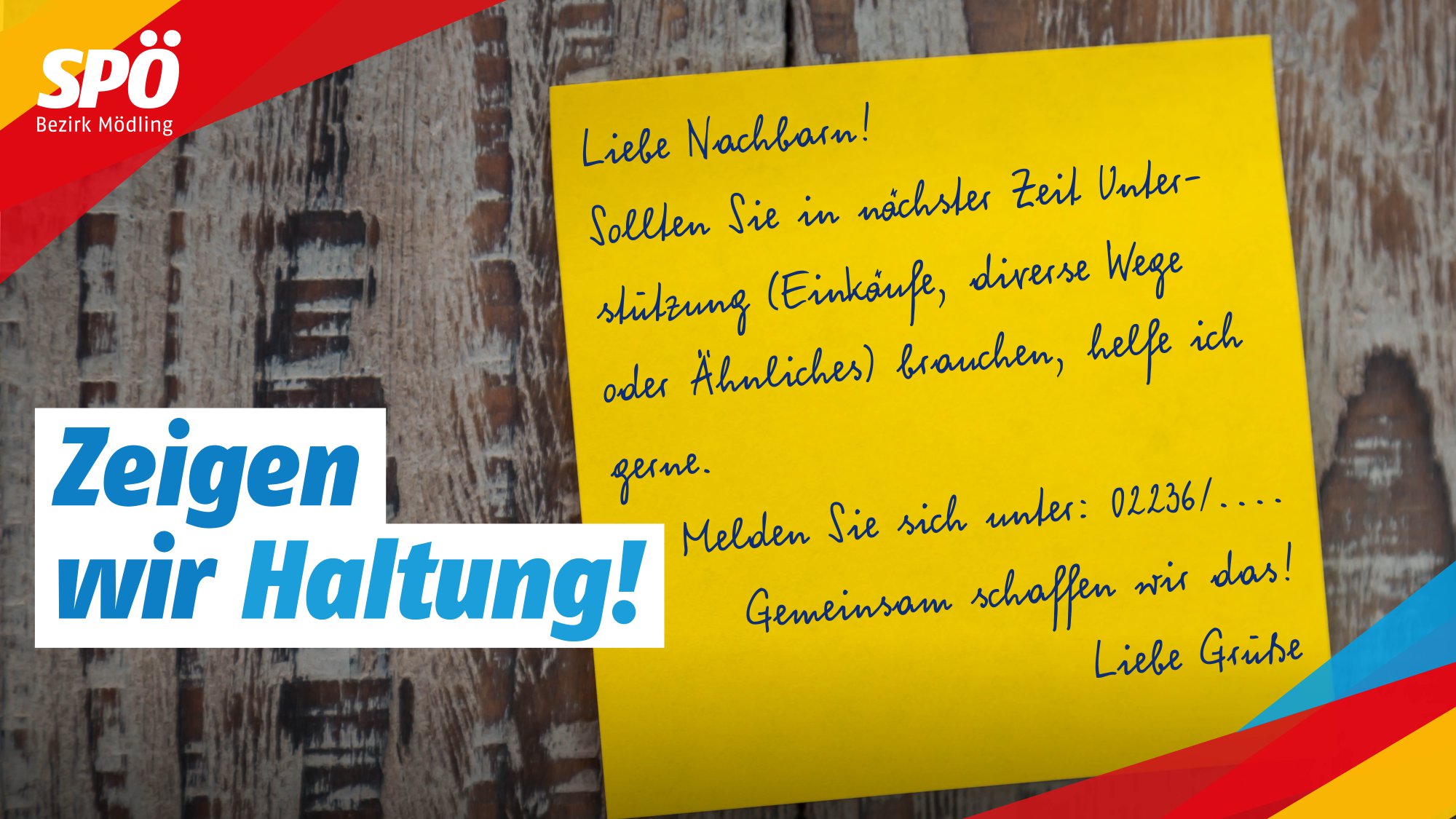
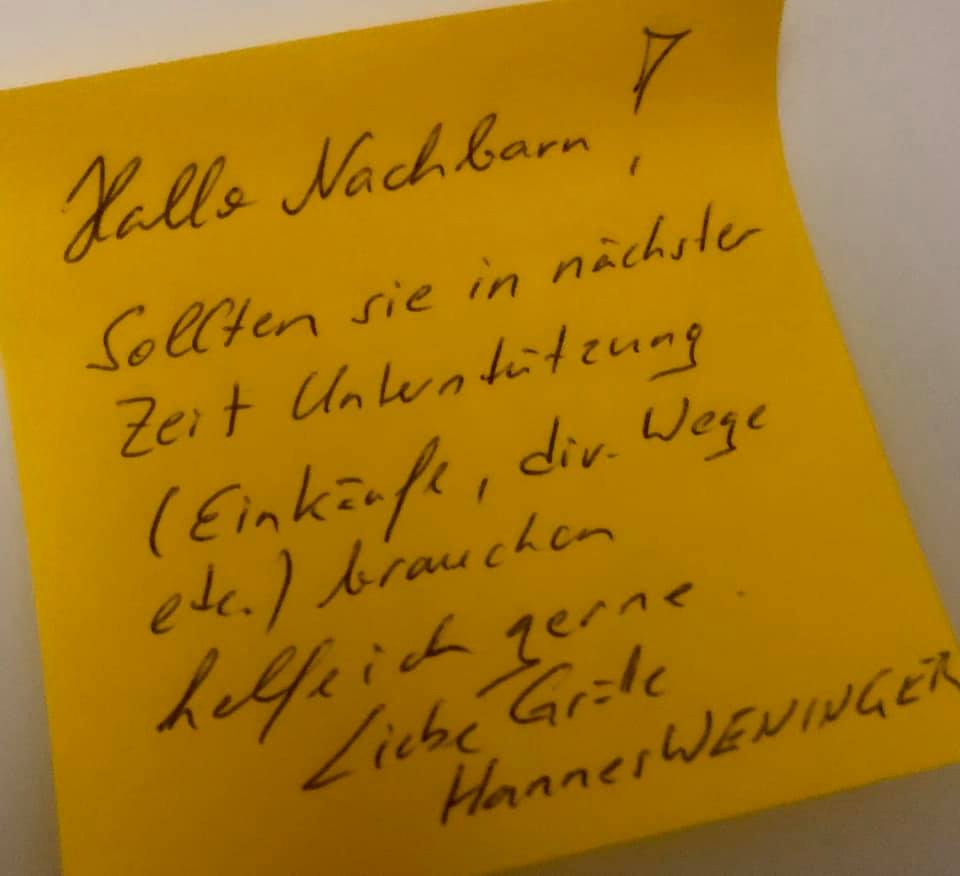
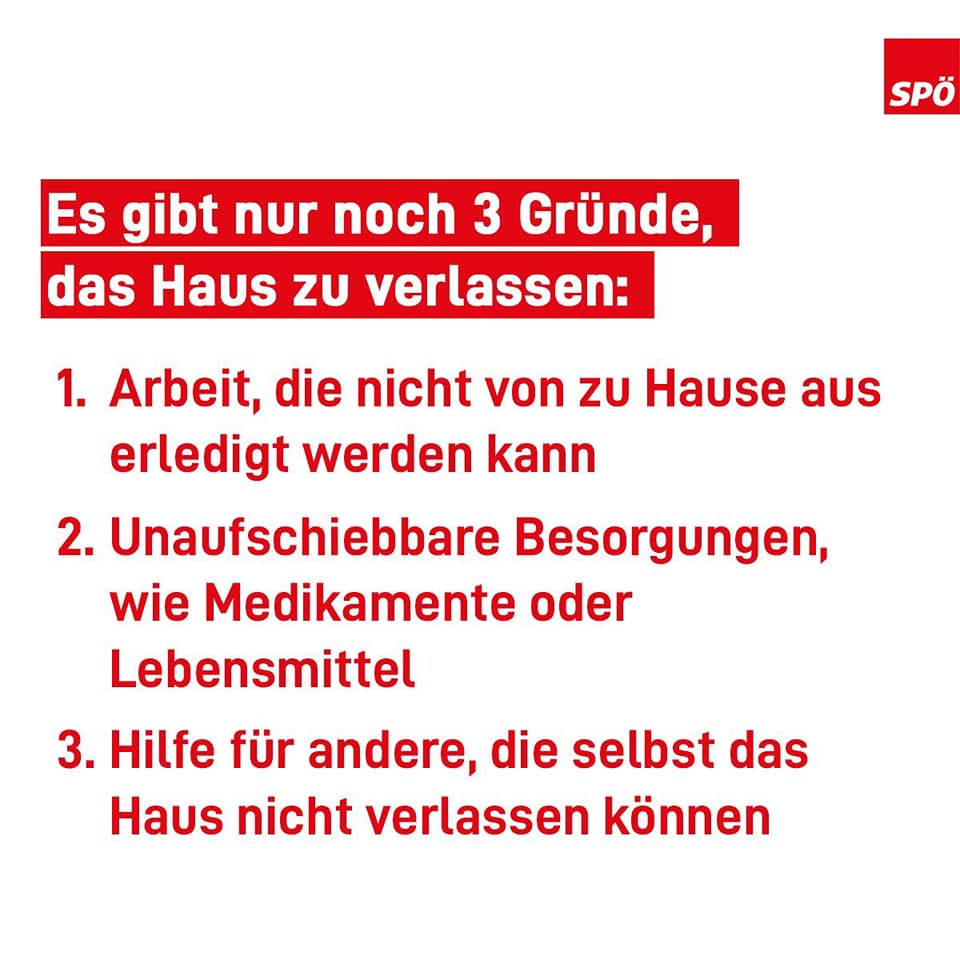
What is your message for the European Union right now?
Follow Hannes on Twitter @HannesWeninger.
Othmane Yassine, Councillor of Fermignano, Italy
(contribution published on 23 March 2020)
How are you dealing with the COVID-19 pandemic?
In our municipality, we thought of creating a WhatsApp number to send out all updates in relation to the Covid-19 situation and to promote solidarity actions that have been disseminated by local associations.
- Through WhatsApp and social media, we share useful information and updates regarding the national management of the Covid-19 and about the measures implemented by the government.
- We are working on the creation of an online platform to help children with their homework thanks to a number of offers of help coming from our civil society for primary and secondary school classes. The municipality acts as a central organiser. The system works as follows: on the one hand, we collect the names of those who want to help the kids do their homework with their preferred kind of online platform and, on the other hand, we put together a list of families that need that help and we cross-reference the data. This way, we can connect the supply with the demand.
- The municipality has also acted to guarantee the right of all children to continue their education. To do this, we have reached out to local businesses to buy PCs that we can then donate to those in need.
We are doing this because we believe in substantial equality!
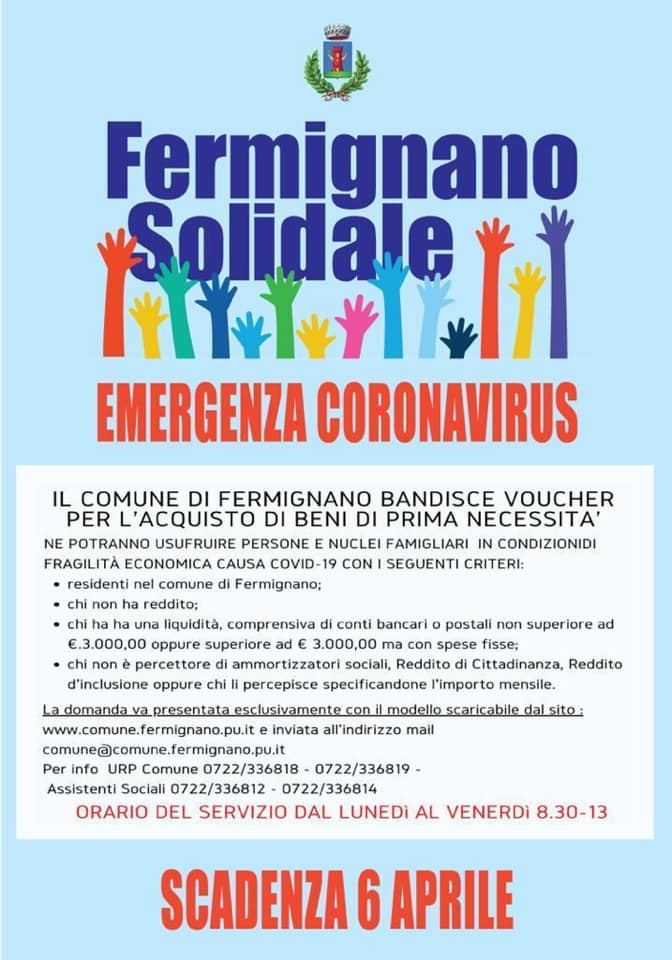
These are difficult times because of the COVID-19. Among other things, it has shown a light again on the lack of access to certain civil rights for minority groups like immigrants. For example, the fact that there are no cemeteries for minority faiths such as Islam has made it impossible for their deceased to be buried. Several cases in Italy have shown this problem, one of the most dramatic ones happening in the city of Pisogne in the province of Brescia. In this case, the body remained in the house of the deceased's relatives for eight days because they could not find a burial place. We also had this problem before the COVID-19 emergency, but it was then solved by repatriating the remains. The cost of repatriating remains is very high and a large number of families asked for help to their communities for financial support. However, repatriation is no longer a possibility due to the global lockdown.
In order to avoid the same unfortunate and regrettable situation that took place in Pisogne, the city of Fermignano has decided - following the instructions of our mayor Emanuele Feduzi - to devote a part of our cemetery to minority faiths that exist in our city and in our province. This act of civility and of sound administration should take place in at least one city per province. A united and mutually supportive Europe reveals itself in its ability to face emergencies with solidarity and by leaving no one behind.
What is your message for the European Union right now?
***
Photo credit header: Photo by Fernando Medina, Mayor of Lisbon, via Twitter.
